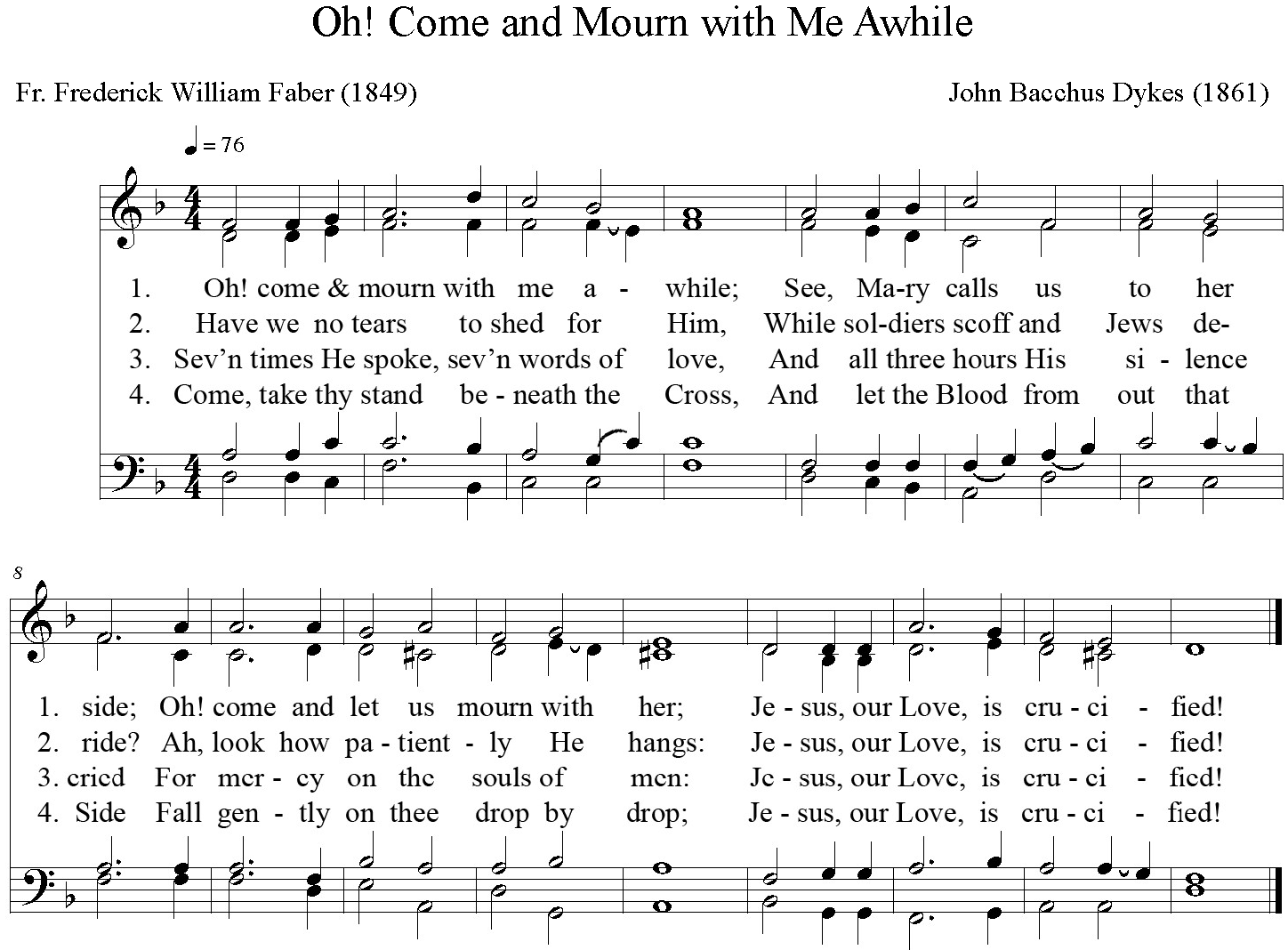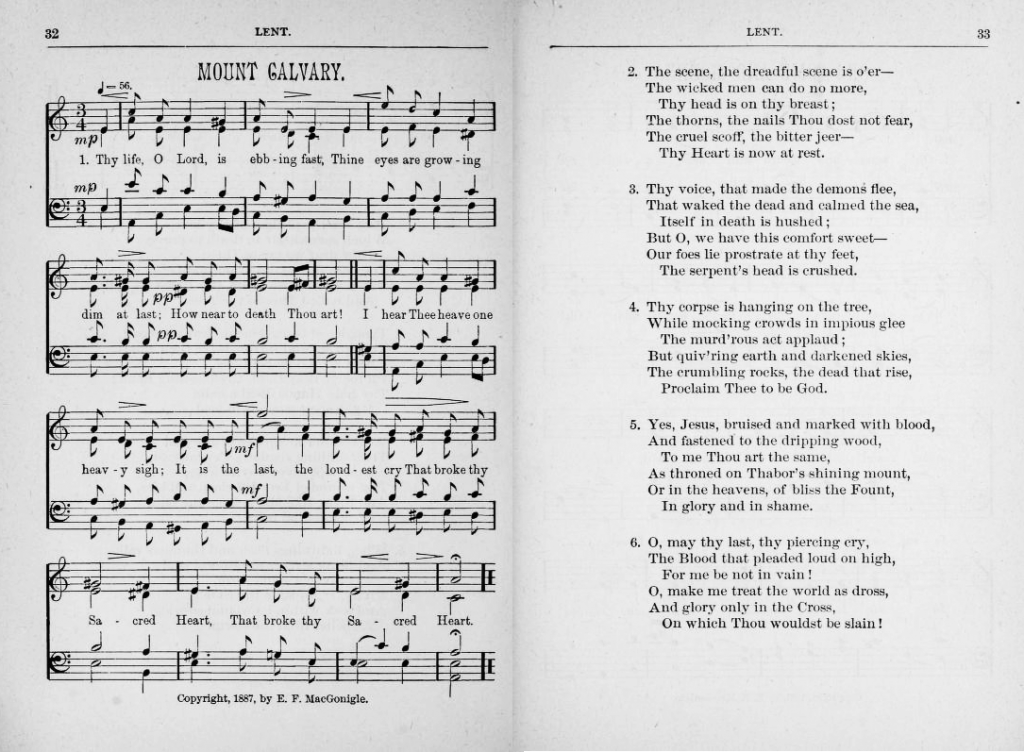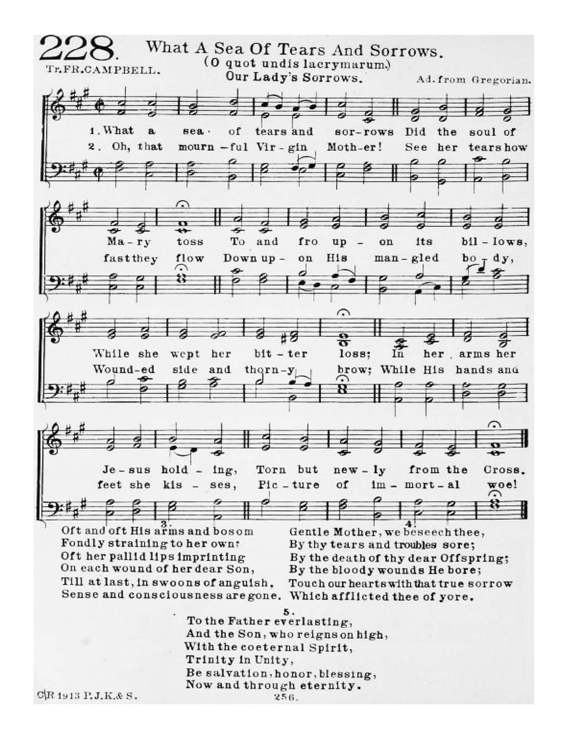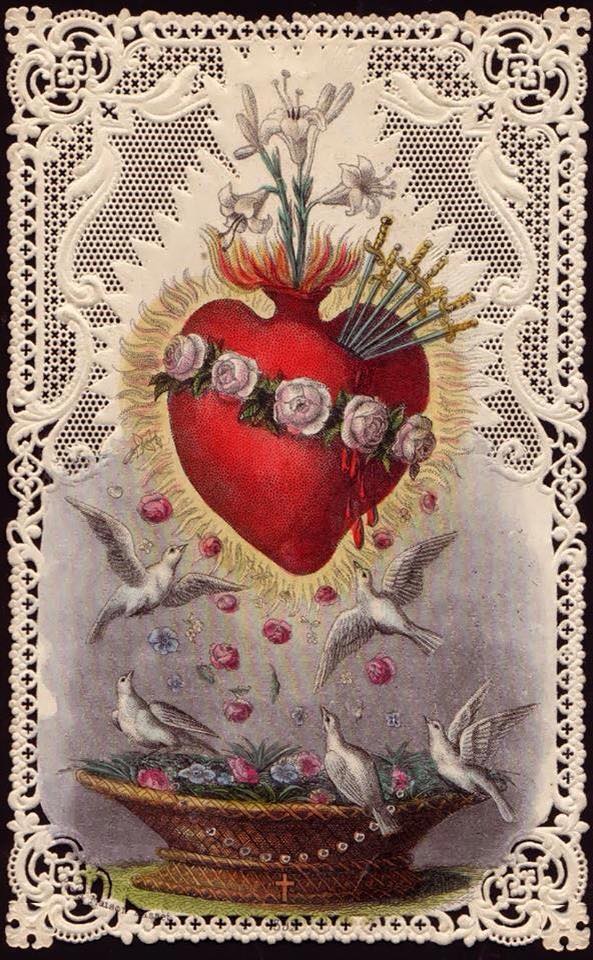Short form of 7 Ave Marias, and Litany of our Lady of Sorrows
Meditations for this Page (without Prayers) by St. Alphonsus de Liguori
Opening Hymn. Rosary-like Prayer for All Seven Sorrows, seven decades of seven Ave Marias, approximately forty-nine. (A dedicated scriptural rosary verse for each Ave.) Compacted sections of meditations and prayers capable of expansion. Closing hymn. (Alternative short form of 7 Ave Marias, and Litany of Our Lady of Seven Sorrows.)
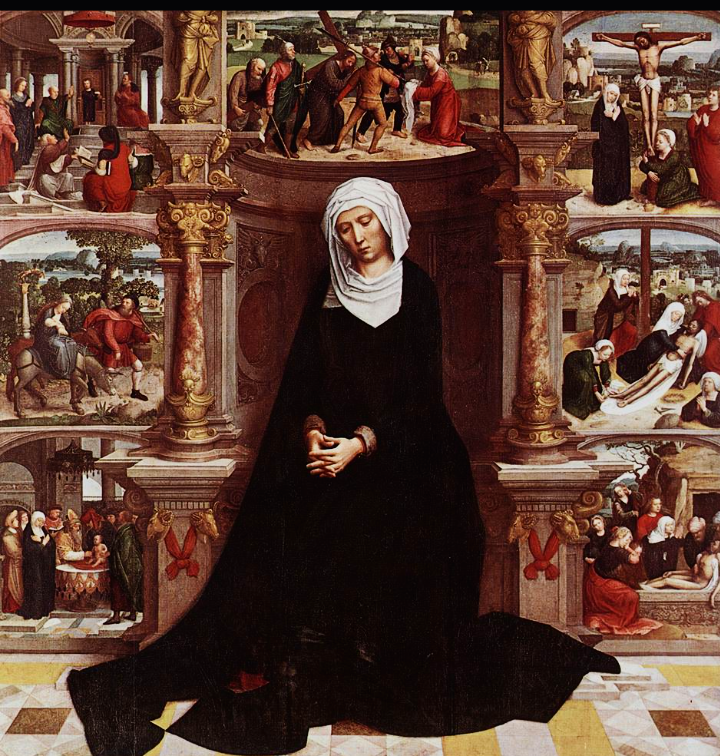
I. Simeon Announces the Suffering Destiny of Jesus.
(And thy own soul a sword shall pierce, that, out of many hearts, thoughts may be revealed. – Luke 2:35)
II. Mary Escapes into Egypt with Jesus and Joseph.
III. Mary Seeks Jesus, Lost in Jerusalem.
IV. Mary meets Jesus as He carries His cross to Calvary.
V. Mary Stands Near the Cross of Her Son, Jesus.
VI. Mary Receives into Her Arms, the Body of Jesus Taken Down from the Cross.
VII. Mary Helps Place the Body of Jesus in the Tomb.
Opening Hymn
Click the ▶ Button to sing the hymn (key of G) , or play the hymn in a New Window ⧉
Click the ▶ Button to sing the hymn (key of E) , or play the hymn in a New Window ⧉
Click the ▶ Button to sing the hymn (key of C) , or play the hymn in a New Window ⧉
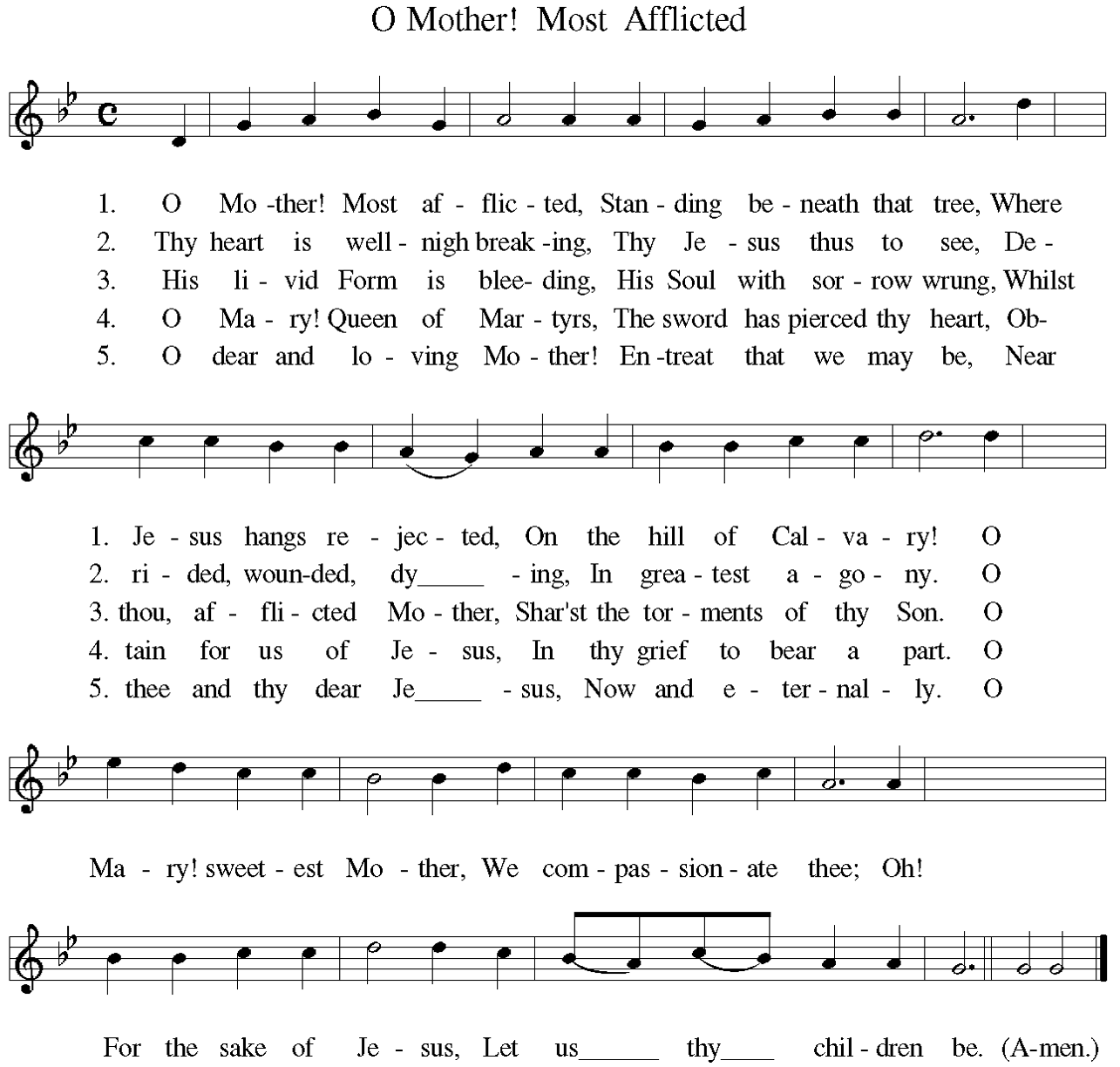
| 1. O Mother! Most afflicted, Stan- ding beneath that tree, Where Jesus hangs rejected, On the hill of Calvary! |
Refrain: O Mary! sweetest Mother, We compassionate thee; Oh! for the sake of Jesus, Let us_ thy_ children be. |
| 2. Thy heart is well-nigh breaking, Thy Jesus thus to see, De- rided, wounded, dy_-ing, In greatest agony. (Refrain.) |
3. His livid Form is bleeding, His Soul with sorrow wrung, Whilst thou, afflicted Mother, Shar’st the torments of thy Son. (Refrain.) |
| 4. O Mary! Queen of Martyrs, The sword has pierced thy heart, Ob- tain for us of Jesus, In thy grief to bear a part. (Refrain.) |
5. O dear and loving Mother! En- treat that we may be, Near thee and thy dear Je_-sus, Now and eternally. (Refrain.) Amen. |
| St. Gregory Hymnal, 1920. #91, “O Mother! Most Afflicted” | |
Click ^ again to contract
1-7 Click the ▶ Button to pray the complete Seven Dolors Chaplet, or play the complete Chaplet in a New Window ⧉
Or, individually meditate and pray upon each Sorrow in turn below.
Introduction Click the ▶ Button to listen to the Introductory Fr. Ripperger meditation podcast, or play the podcast in a New Window
(Skip the meditation, go to pray the Introductory Prayer)
Introduction of St. Alphonsus de Liguori’s Meditation on the Seven Sorrows of the Blessed Virgin Mary.
Mary was the Queen of Martyrs, for her martyrdom was longer and greater than that of all the Martyrs.
Who can ever have a heart so hard that it will not melt on hearing the most lamentable event which once occurred in the world? There was a noble and holy Mother Who had an only Son. This Son was the most amiable that can be imagined—innocent, virtuous, beautiful, Who loved His Mother most tenderly; so much so that He had never caused her the least displeasure, but had ever shown her all respect, obedience, and affection: hence this Mother had placed all her affections on earth in this Son.
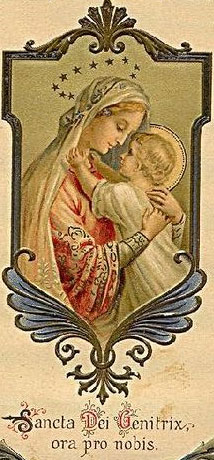
Hear, then, what happened. This Son, through envy, was falsely accused by His enemies; and though the judge knew, and himself confessed, that He was innocent, yet, that he might not offend his enemies, he condemned Him to the ignominious death that they had demanded. This poor Mother had to suffer the grief of seeing that amiable and beloved Son unjustly snatched from her in the flower of His age by a barbarous death; for, by dint of torments and drained of all His blood, He was made to die on an infamous gibbet in a public place of execution, and this before her own eyes.
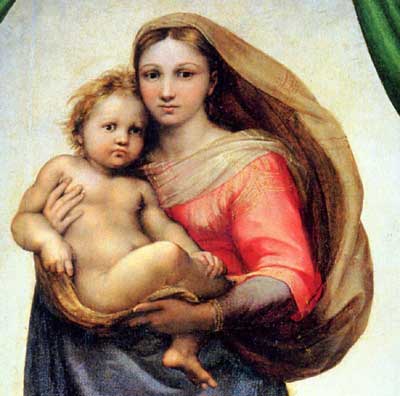
Devout souls, what say you? Is not this event, and is not this unhappy Mother worthy of compassion. You already understand of whom I speak. This Son, so cruelly executed, was our loving Redeemer Jesus; and this Mother was the Blessed Virgin Mary; who, for the love she bore us, was willing to see Him sacrificed to Divine Justice by the barbarity of men.
This great torment, then, which Mary endured for us—a torment which was more than a thousand deaths deserves both our compassion and our gratitude. If we can make no other return for so much love, at least let us give a few moments this day to consider the greatness of the sufferings by which Mary became the Queen of martyrs; for the sufferings of her great martyrdom exceeded those of all the martyrs; being, in the first place, the longest in point of duration; and, in the second place, the greatest in point of intensity.
First point. As Jesus is called the King of sorrows and the King of martyrs, because He suffered during His life, more than all other martyrs; so also is Mary with reason called the Queen of martyrs, having merited this title by suffering the most cruel martyrdom possible after that of her Son. Hence, with reason, was she called by Richard of Saint Lawrence, “the Martyr of martyrs”; and of her can the words of Isaias with all truth be said, “He will crown thee with a crown of tribulation;” that is to say, that that suffering itself, which exceeded the suffering of all the other martyrs united, was the crown by which she was shown to be the Queen of martyrs.
That Mary was a true martyr cannot be doubted, as Denis the Carthusian, Pelbart, Catharinus, and others prove; for it is an undoubted opinion that suffering sufficient to cause death is martyrdom, even though death does not ensue from it. Saint John the Evangelist is revered as a martyr, though he did not die in the caldron of boiling oil, but he came out more vigorous than he went in. Saint Thomas says, “that to have the glory of martyrdom, it is sufficient to exercise obedience in its highest degree, that is to say, to be obedient unto death.”
“Mary was a martyr,” says Saint Bernard, “not by the sword of the executioner, but by bitter sorrow of heart.” If her body was not wounded by the hand of the executioner, her blessed heart was transfixed by a sword of grief at the passion of her Son; grief which was sufficient to have caused her death, not once, but a thousand times. From this we shall see that Mary was not only a real martyr, but that her martyrdom surpassed all others; for it was longer than that of all others, and her whole life may be said to have been a prolonged death.
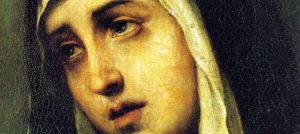
Did the soul of Mary toss,
To and fro upon its billows,
While she wept her bitter loss;
In her arms her Jesus holding,
Torn so newly from the Cross.
“The passion of Jesus,” as Saint Bernard says, “commenced with His birth”. So also did Mary, in all things like unto her Son, endure her martyrdom throughout her life. Amongst other significations of the name of Mary, as Blessed Albert the Great asserts, is that of “a bitter sea.” Hence to her is applicable the text of Jeremias : “great as the sea is thy destruction.” For as the sea is all bitter and salt, so also was the life of Mary always full of bitterness at the sight of the passion of the Redeemer, which was ever present to her mind.
“There can be no doubt, that, enlightened by the Holy Ghost in a far higher degree than all the prophets, she, far better than they, understood the predictions recorded by them in the sacred Scriptures concerning the Messias.” This is precisely what the angel revealed to St. Bridget; and he also added, “that the Blessed Virgin, even before she became His Mother, knowing how much the Incarnate Word was to suffer for the salvation of men, and compassionating this innocent Saviour, who was to be so cruelly put to death for crimes not His own, even then began her great martyrdom.”
Her grief was immeasurably increased when she became the Mother of this Saviour; so that at the sad sight of the many torments which were to be endured by her poor Son, she indeed suffered a long martyrdom, a martyrdom which lasted her whole life. This was signified with great exactitude to Saint Bridget in a vision which she had in Rome, in the church of Saint Mary Major, where the Blessed Virgin, with Saint Simeon and an angel bearing a very long sword, reddened with blood, appeared to her, denoting thereby the long, and bitter grief which transpierced the heart of Mary during her whole life.
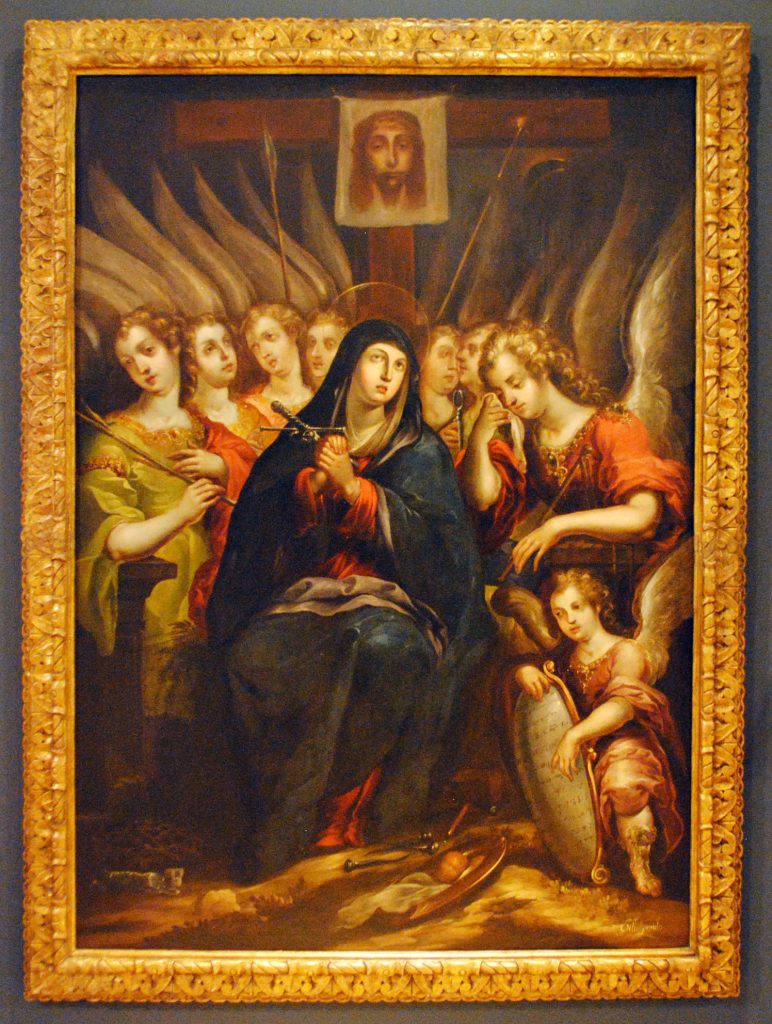
When [The Abbot] Rupert supposes Mary thus speaking: “Redeemed souls, and my beloved children, do not pity me only for the hour in which I beheld my dear Jesus expiring before my eyes; for the sword of sorrow predicted by Simeon pierced my soul during the whole of my life: when I was giving suck to my Son, when I was warming Him in my arms, I already foresaw the bitter death that awaited Him. Consider, then, what long and bitter sorrows I must have endured.”
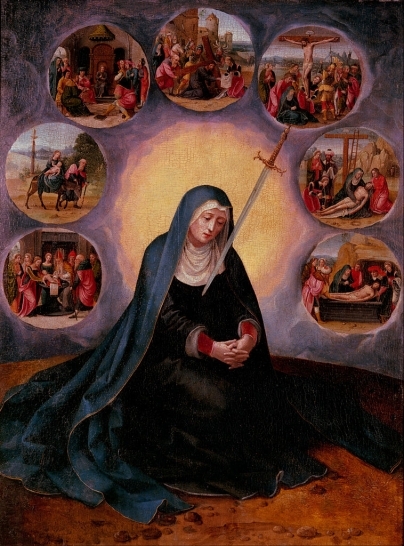
Wherefore Mary might well say, in the words of David, “My life is wasted with grief, and my years in sighs.…My sorrow is continually before me.…My whole life was spent in sorrow and in tears; for my sorrow, which was compassion for my beloved Son, never departed from before my eyes, as I always foresaw the sufferings and death which He was one day to endure.” The Divine Mother herself revealed to Saint Bridget, that “even after the death and ascension of her Son, whether she ate, or worked, the remembrance of His passion was ever deeply impressed on her mind, and fresh in her tender heart”. Hence Tauler says, “that the most Blessed Virgin spent her whole life in continual sorrow;” for her heart was always occupied with sadness and with suffering.
Therefore time, which usually mitigates the sorrows of the afflicted, did not relieve Mary; nay, even it increased her sorrow; for, as Jesus, on the one hand, advanced in age, and always appeared more and more beautiful and amiable; so also, on the other hand, the time of His death always drew nearer, and grief always increased in the heart of Mary, at the thought of having to lose Him on earth. So that, in the words addressed by the angel to Saint Bridget: “As the rose grows up amongst thorns, so the Mother of God advanced in years in the midst of sufferings; and as the thorns increase with the growth of the rose, so also did the thorns of her sorrows increase in Mary, the chosen rose of the Lord, as she advanced in age; and so much the more deeply did they pierce her heart.”

By thy tears and troubles sore;
By the death of thy dear Offspring,
By the bloody Wounds He bore;
Touch our hearts with
that true sorrow,
Which affected thee of yore.
Having now considered the tenth of this sorrow in point of duration, let us pass to the second point-its greatness in point of intensity.
Second point. Ah, Mary was not only Queen of martyrs because her martyrdom, was longer than that of all others, but also because it was the greatest of all martyrdoms. Who, however, can measure its greatness? Jeremias seems unable to find any one with whom be can compare this Mother of Sorrows, when he considers her great sufferings at the death of her Son. “To what shall I compare thee or to what shall I liken thee, O daughter of Jerusalem … for great as the sea is thy destruction: who shall heal thee?”
Wherefore Cardinal Hugo, in a commentary on these words, says, “O Blessed Virgin, as the sea in bitterness exceeds all other bitterness, so does thy grief exceed all other grief.” Hence Saint Anselm asserts, that “had not God by a special miracle preserved the life of Mary in each moment of her life, her grief was such that it would have caused her death.” Saint Bernardine of Siena goes so far as to say, “that the grief of Mary was so great that, were it divided amongst all men, it would suffice to cause their immediate death.”

But let us consider the reasons for which Mary’s martyrdom was greater than that of all martyrs. In the first place, we must remember that the martyrs endured their torments, which were the effect of fire and other material agencies, in their bodies; Mary suffered hers in her soul, as Saint Simeon foretold: “And my own soul a sword shall pierce.”
As if the holy old man had said: “O most sacred Virgin, the bodies of other martyrs will be torn with iron, but thou wilt be transfixed, and martyred in thy soul by the Passion of thine own Son.” Now, as the soul is more noble than the body, so much greater were Mary’s sufferings than those of all the martyrs, as Jesus Christ Himself said to Saint Catherine of Siena: “Between the sufferings of the soul and those of the body there is no comparisons.”
Whence the holy Abbot Arnold of Chartres says, “that whoever had been present on Mount Calvary, to witness the great sacrifice of the Immaculate Lamb, would there have beheld two great altars, the one in the body of Jesus, the other in the heart of Mary; for, on that mount, at the same time that the Son sacrificed His body by death, Mary sacrificed her soul by compassion.”
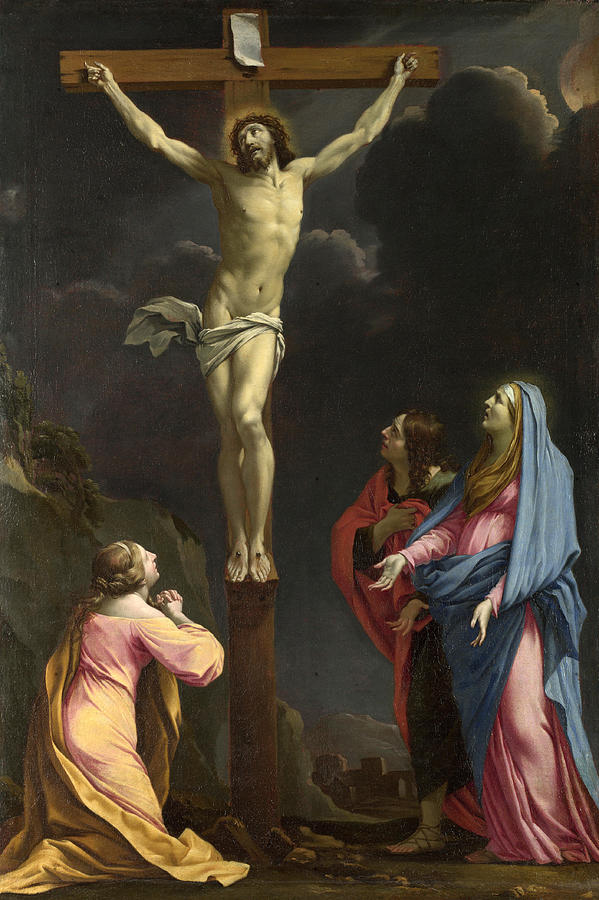
Moreover, says Saint Antoninus, “while other martyrs suffered by sacrificing their own lives, the Blessed Virgin suffered by sacrificing her Son’s life, a life that she loved far more than her own; so that she not only suffered in her soul all that her Son endured in His body, but moreover the sight of her Son’s torments brought more grief to her heart than if she had endured them all in her own person.”
No one can doubt that Mary suffered in her heart all the outrages which she saw inflicted on her beloved Jesus. Any one can understand that the sufferings of children are also those of their mothers who witness them.

Saint Augustine, considering the anguish endured by the mother of the Maccabees in witnessing the tortures of her sons, says, “she, seeing their sufferings, suffered in each one; because she loved them all, she endured in her soul what they endured in their flesh.”
Thus also did Mary suffer all those torments, scourges, thorns, nails, and the cross, which tortured the innocent flesh of Jesus, all entered at the same time into the heart of this Blessed Virgin, to complete her martyrdom. “He suffered in the flesh, and she in her heart,” writes that Blessed Amadeus. “So much so,” says Saint Lawrence Justinian, “that the heart of Mary became, as it were, a mirror of the Passion of the Son, in which might be seen, faithfully reflected, the spitting, the blows and wounds, and all that Jesus suffered.”
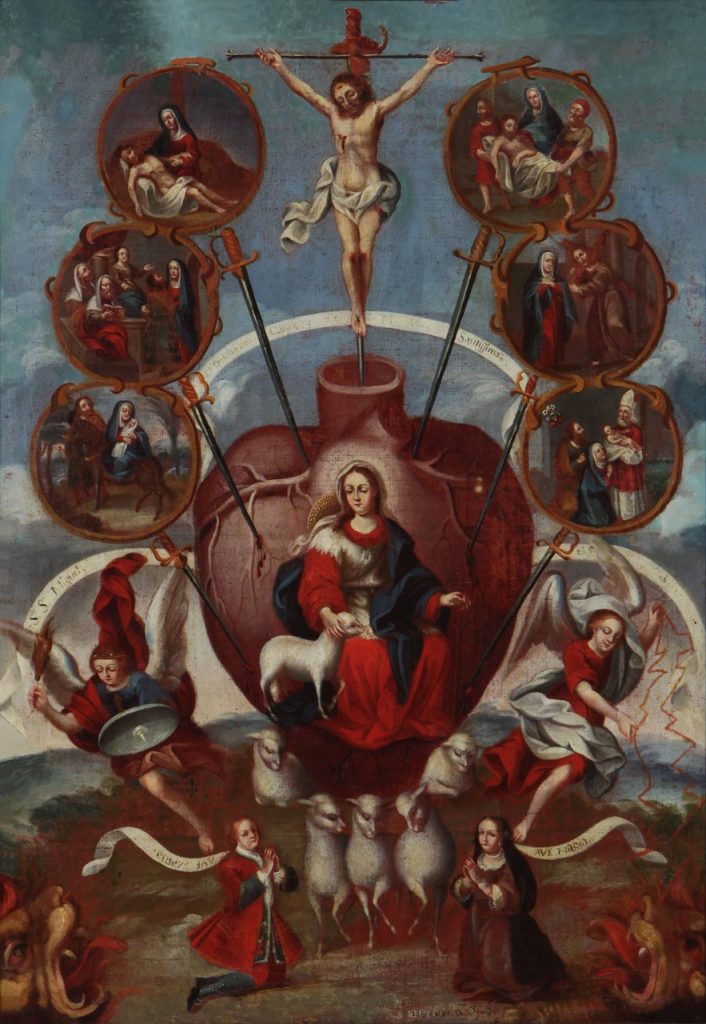
Saint Bonaventure also remarks that “those wounds—which were scattered over the body of our Lord were all united in the single heart of Mary.”
Thus was our Blessed Lady, through the compassion of her loving heart for her Son, scourged, crowned with thorns, insulted, and nailed to the cross. Whence the same Saint, considering Mary on Mount Calvary, present at the death of her Son, questions her in these words: “O Lady, tell me where didst thou stand? Was it only at the foot of the cross? Ah, much more than this, thou wast on the cross itself, crucified with thy Son.”
Richard of Saint Lawrence, on the words of the Redeemer, spoken by Isaias the prophet, “I have trodden the wine-press alone, and of the Gentiles there is not a man with me,” says, “It is true, O Lord, that in the work of human redemption, Thou didst suffer alone, and that there was not a man who sufficiently pitied Thee; but there was a woman with Thee, and she was Thine own Mother; she suffered in her heart all that Thou didst endure in Thy body.”
But all this is saying too little of Mary’s sorrows, since, as I have already observed, she suffered more in witnessing the sufferings of her beloved Jesus, than if she had herself endured all the outrages and death of her Son.
Erasmus, speaking of parents in general, says, that “they are more cruelly tormented by their children’s sufferings than by their own.”
This is not always true, but in Mary it evidently was so; for it is certain that she loved her Son and His life beyond all comparison more than herself or a thousand lives of her own. Therefore Blessed Amadeus rightly affirms, that “the afflicted Mother, at the sorrowful sight of the torments of her beloved Jesus, suffered far more than she would have done had she herself endured His whole Passion.”
The reason is evident, for, as Saint Bernard says, “the soul is more where it loves than where it lives.” Our Lord Himself had already said the same thing: “where our treasure is, there also is our heart.” If Mary, then, by love, lived more in her Son than in herself, she must have endured far greater torments in the sufferings and death of her Son than she would have done, had the most cruel death in the world been inflicted upon her.
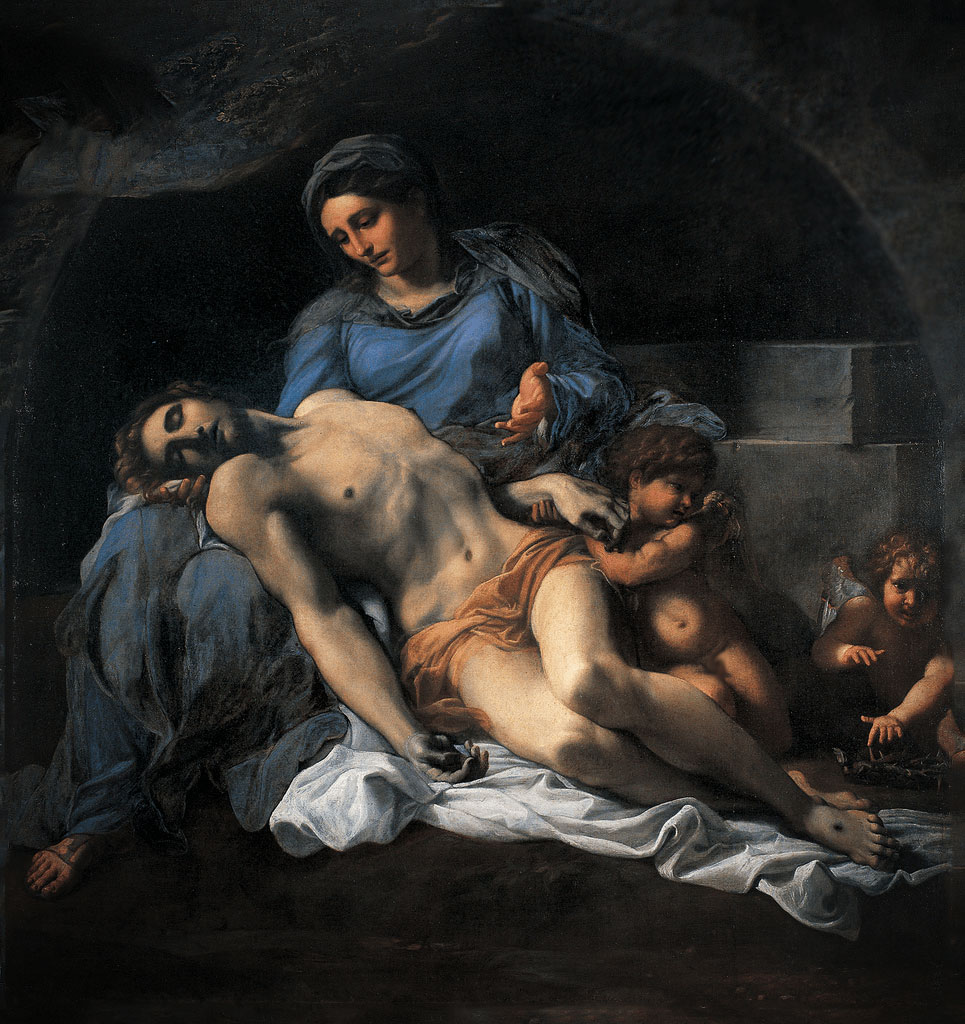
Here we must reflect on another circumstance which rendered the martyrdom of Mary beyond all comparison greater than the torments of all the martyrs: it is, that in the Passion of Jesus she suffered much, and she suffered, moreover, without the least alleviation. The martyrs suffered under the torments inflicted on them by tyrants; but the love of Jesus rendered their pains sweet and agreeable.
A Saint Vincent was tortured on a rack, torn with pincers, burnt with red-hot iron plates; but, as Saint Augustine remarks, “it seemed as if it was one who suffered, and another who spoke.” The Saint addressed the tyrant with such energy and contempt for his torments, that it seemed as if one Vincent suffered and another spoke; so greatly did God strengthen him with the sweetness of His love in the midst of all he endured.
A Saint Boniface had his body torn with iron hooks; sharp-pointed reeds were thrust between his nails and flesh; melted lead was poured into his mouth; and in the midst of all he could not tire saying “I give Thee thanks, O Lord Jesus Christ.”
A Saint Mark and a Saint Marcellinus were bound to a stake, their feet pierced with nails; and when the tyrant addressed them, saying, “Wretches, see to what a state you are reduced; save yourselves from these torments,” they answered: “Of what pains, of what torments dost thou speak? We never enjoyed so luxurious a banquet as in the present moment, in which we joyfully suffer for the love of Jesus Christ.”
A Saint Lawrence suffered; but when roasting on the gridiron, “the interior flame of love,” says Saint Leo, “was more powerful in consoling his soul than the flame without in torturing his body.” Hence love Tendered him so courageous that he mocked the tyrant, saying, “If thou desirest to feed on my flesh, a part is sufficiently roasted; turn it, and eat.” But how, in the midst of so many torments, in that prolonged death, could the Saint thus rejoice? “Ah!” replies Saint Augustine, “inebriated with the wine of Divine love, he felt neither torments nor death.”
So that the more the holy martyrs loved Jesus, the less did they feel their torments and death; and the sight alone of the sufferings of a crucified God was sufficient to console them.
But was our suffering Mother also consoled by love for her Son, and the sight of His torments? Ah, no; for this very Son who suffered was the whole cause of them, and the love she bore Him was her only and most cruel executioner; for Mary’s whole martyrdom consisted in beholding and pitying her innocent and beloved Son, Who suffered so much. Hence, the greater was her love for Him, the more bitter and inconsolable was her grief. “Great as the sea is thy destruction; who shall heal thee?”

Ah, Queen of Heaven, love hath mitigated the sufferings of other martyrs, and healed their wounds; but who hath ever soothed thy bitter grief? Who hath ever healed the too cruel wounds of thy heart, “Who shall heal thee,” since that very Son Who could give thee consolation was, by His sufferings, the only cause of thine, and the love which thou didst bear Him was the whole ingredient of thy martyrdom.
So that, as other martyrs, as Diez remarks, are all represented with the instruments of their sufferings—a Saint Paul with a sword, a Saint Andrew with a cross, a Saint Lawrence with a gridiron—Mary is represented with her dead Son in her arms; for Jesus Himself, and He alone, was the instrument of her martyrdom, by reason of the love she bore Him.
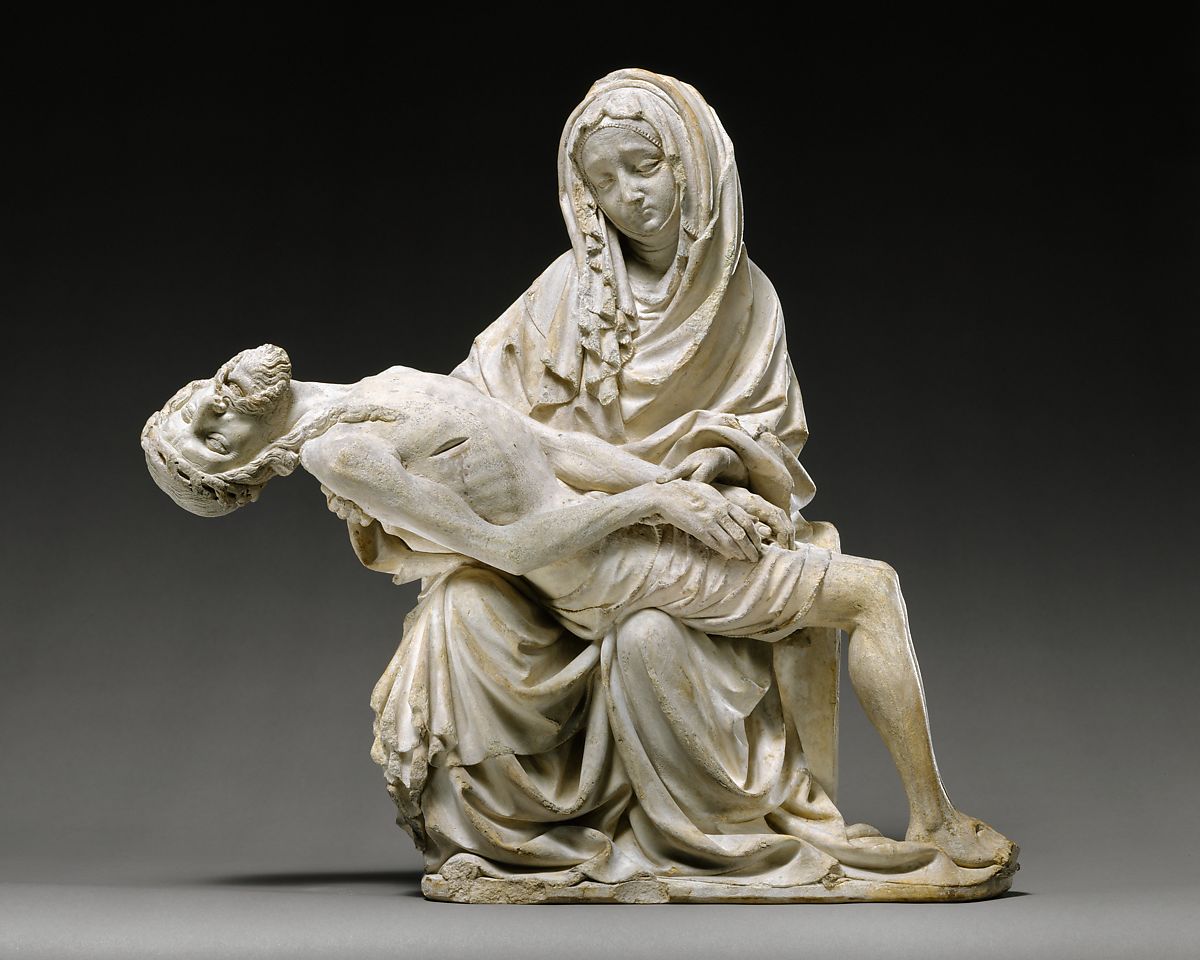
Richard of Saint Victor confirms in a few words all that I have now said: “In other martyrs, the greatness of their love soothed the pains of their martyrdom; but in the Blessed Virgin, the greater was her love, the greater were her sufferings, the more cruel was her martyrdom.”
It is certain that the more we love a thing, the greater is the pain we feel in losing it. We are more afflicted at the loss of a brother than at that of a beast of burden; we are more grieved at the loss of a son than at that of a friend.
Now, Cornelius a Lapide says, “that to understand the greatness of Mary’s grief at the death of her Son, we must understand the greatness of the love she bore Him.” But who can ever measure that love?
Blessed Amadeus says that “in the heart of Mary were united two kinds of love for her Jesus—supernatural love, by which she loved Him as her God, and natural love, by which she loved Him as her Son.” So that these two loves became one; but so immense a love, that William of Paris even says that the Blessed Virgin “loved Him as much as it was possible for a pure creature to love Him.”
Hence Richard of Saint Victor affirms that “as there was no love like her love, so there was no sorrow like her sorrow.” And if the love of Mary towards her Son was immense, immense also must have been her grief in losing Him by death. “Where there is the greatest love,” says Blessed Albert the Great, “there also is the greatest grief.”
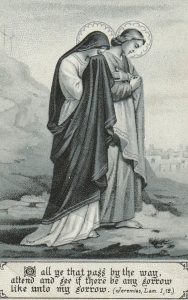
Let us now imagine to ourselves the Divine Mother standing—near her Son expiring on the cross, and justly applying to herself the words of Jeremias, thus addressing us: “O all ye that pass by the way attend, and see if there be any sorrow like to my sorrow.” O you who spend your lives upon earth, and pity me not, stop awhile to look at me, now that I behold this beloved Son dying before my eyes; and then see if, amongst all those who are afflicted and tormented, a sorrow is to be found like unto my sorrow.
“No, O most suffering of all mothers,” replies Saint Bonaventure, “no more bitter grief than thine can be found; for no Son more dear than thine can be found.” Ah, “there never was a more amiable Son in the world than Jesus,” says Richard of Saint Lawrence; “nor has there ever been a mother who more tenderly loved her Son than Mary! But since there never has been in the world a love like unto Mary’s love, how can any sorrow be found like unto Mary’s sorrow?”
Therefore Saint Ildephonsus did not hesitate to assert, “to say that Mary’s sorrows were greater than all the torments of the martyrs united, was to say too little.” And Saint Anselm adds, that “the most cruel tortures inflicted on the holy martyrs were trifling, or as nothing in comparison with the martyrdom of Mary.” Saint Basil of Seleucia also writes, “that as the sun exceeds all the other planets in splendour, so did Mary’s sufferings exceed those of all the other martyrs.” A learned author concludes with a beautiful sentiment. He says that so great was the sorrow of this tender Mother in the Passion of Jesus, that she alone compassionated in a degree by any means adequate to its merits the death of a God made man.
But here Saint Bonaventure, addressing this Blessed Virgin, says, “And why, O Lady, didst thou also go to sacrifice thyself on Calvary? Was not a crucified God sufficient to redeem us, that thou, His Mother, wouldst also go to be crucified with Him?” Indeed, the death of Jesus was more than enough to save the world, and an infinity of worlds; but this good Mother, for the love she bore us, wished also to help the cause of our salvation with the merits of her sufferings, which she offered for us on Calvary.
Therefore, Blessed Albert the Great says, “that as we are under great obligations to Jesus for His Passion endured for our love, so also are we under great obligations to Mary, for the martyrdom which she voluntarily suffered for our salvation in the death of her Son.”
I say voluntarily, since, as Saint Agnes revealed to Saint Bridget, “our compassionate and benign Mother was satisfied rather to endure any torment than that our souls should not be redeemed, and be left in their former state of perdition.”
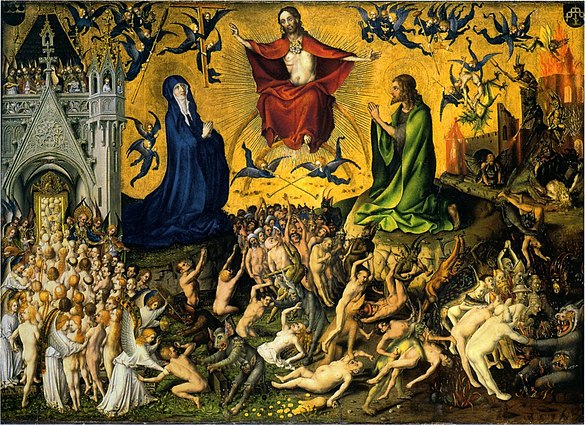
And, indeed, we may say that Mary’s only relief in the midst of her great sorrow in the Passion of her Son, was to see the lost world redeemed by His death, and men who were His enemies reconciled with God. “While grieving she rejoiced,” says Simon of Cassia, “that a sacrifice was offered for the redemption of all, by which He who was angry was appeased.”
So great a love on the part of Mary deserves our gratitude, and that gratitude should be shown by at least meditating upon and pitying her in her sorrow. But she complained to Saint Bridget that very few did so, and that the greater part of the world lived in forgetfulness of them: “I look around at all who are on earth, to see if by chance there are any who pity me, and meditate upon my sorrows; and I find that there are very few. Therefore, my daughter, though I am forgotten by many, at least do thou not forget me; consider my anguish, and imitate, as far as thou canst, my grief.”
To understand how pleasing it is to the Blessed Virgin that we should remember her dolours, we need only know that, in the year 1239, she appeared to seven devout clients of hers (who were afterwards founders of the religious order of the Servants of Mary), with a black garment in her hand, and desired them, if they wished to please her, often to meditate on her sorrows: for this purpose, and to remind them of her sorrows, she expressed her desire that in future they should wear that mourning dress.

Jesus Christ Himself revealed to the Blessed Veronica da Binasco, that He is, as it were, more pleased in seeing His Mother compassionated than Himself; for thus He addressed her: “My daughter, tears shed for My Passion are dear to Me; but as I love My Mother Mary with an immense love, the meditation of the torments which she endured at My death is even more agreeable to Me.”
Wherefore the graces promised by Jesus to those who are devoted to the dolours of Mary are very great. Pelbert relates that it was revealed to Saint Elizabeth, that after the assumption of the Blessed Virgin into heaven, Saint John the Evangelist desired to see her again. The favour was granted him; his dear Mother appeared to him, and with her Jesus Christ also appeared; the Saint then heard Mary ask her Son to grant some special grace to all those who are devoted to her dolours. Jesus promised her four principal ones: First, that those who before death invoke the Divine Mother in the name of her sorrows should obtain true repentance of all their sins. Second, that He would protect all who have this devotion in their tribulations, and that He would protect them especially at the hour of death. Third, that He would impress upon their minds the remembrance of His Passion, and that they should have their reward for it in heaven. Fourth, that He would commit such devout clients to the hands of Mary, with the power to dispose of them in whatever manner she might please, and to obtain for them all the graces she might desire. In proof of this, let us see, in the following example, how greatly devotion to the dolours of Mary aids in obtaining eternal salvation.
Example
In the revelations of Saint Bridget we read that there was a rich man, as noble by birth as he was vile and sinful in his habits. He had given himself, by an express compact, as a slave to the devil; and for sixty successive years had served him, leading such a life as may be imagined, and never approaching the sacraments.
Now this prince was dying; and Jesus Christ, to show him mercy, commanded Saint Bridget to tell her confessor to go and visit him, and exhort him to confess his sins. The confessor went, and the sick man said that he did not require confession, as he had often approached the sacrament of penance. The priest went a second time; but this poor slave of hell persevered in his obstinate determination not to confess. Jesus again told the Saint to desire the confessor to return. He did so; and on this third occasion told the sick man the revelation made to the Saint, and that he had returned so many times because our Lord, who wished to show him mercy, had so ordered.
On hearing this the dying man was touched, and began to weep: “But how,” he exclaimed, “can I be saved; I, who for sixty years have served the devil as his slave, and have my soul burdened with innumerable sins?” “My son,” answered the father, encouraging him, “doubt not; if you repent of them, on the part of God I promise you pardon.”
Then, gaining confidence, he said to the confessor, “Father, I looked upon myself as lost, and already despaired of salvation; but now I feel a sorrow for my sins, which gives me confidence; and since God has not yet abandoned me, I will make my confession.” In fact he made his confession four times on that day, with the greatest marks of sorrow, and on the following morning received the holy communion.
On the sixth day, contrite and resigned, he died. After his death, Jesus Christ again spoke to Saint Bridget, and told her that that sinner was saved; that he was then in purgatory, and that he owed his salvation to the intercession of the Blessed Virgin His Mother; for the deceased, although he had led so wicked a life, had nevertheless always preserved devotion to her dolours, and whenever he thought of them, pitied her.
Prayer
O my afflicted Mother! Queen of martyrs and of sorrows, thou didst so bitterly weep over thy Son, who died for my salvation; but what will thy tears avail me if I am lost? By the merit, then, of thy sorrows, obtain for me true contrition for my sins, and a real amendment of life, together with constant and tender compassion for the sufferings of Jesus and thy dolours.
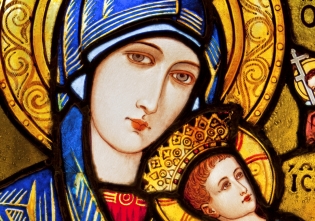
And if Jesus and thou, being so innocent, have suffered so much for love of me, obtain that at least I, who am deserving of hell, may suffer something for your love. “O Lady,” will I say with St. Bonaventure, “if I have offended thee, in justice wound my heart; if I have served thee, I now ask wounds for my reward. It is shameful to me to see my Lord Jesus wounded, and thee wounded with Him, and myself without a wound.”
In fine, O my Mother, by the grief thou didst experience in seeing thy Son bow down His head and expire on the cross in the midst of so many torments, I beseech thee to obtain me a good death. Ah, cease not, O advocate of sinners, to assist my afflicted soul in the midst of the combats in which it will have to engage on its great passage from time to eternity. And as it is probable that I may then have lost my speech, and strength to invoke thy name and that of Jesus, who are all my hope, I do so now; I invoke thy Son and thee to succour me in that last moment; and I say, “Jesus and Mary, to you I commend my soul.” Amen.
Introductory Prayer
Click the ▶ Button to pray with the Introductory Seven Dolors prayer podcast, or play the podcast in a New Window
The Rosary of the Seven Sorrows of The Virgin Mary.
In the name of the Father, and of the Son, and of the Holy Spirit. Amen.
My God, I offer You this rosary for Your Glory. I want to honor Your holy mother The Blessed Virgin, by meditating upon and sharing in her suffering. I humbly beg You to give me true repentance for all my sins. Give me wisdom and humility, so that I may receive all the indulgences contained within this prayer.
I am truly sorry for the pains You suffered in Your most bitter passion, because of my sins. For love of You and before Your Holy Presence, I utterly renounce and forsake, all the sins of my whole life. I ask pardon of You, with all my heart. I firmly resolve to amend my life, and would rather die than offend You again.
In honor of the tears of our Sorrowful Mother:
Our Father…Hail Mary (3).
Most merciful Mother, remind us always about the sorrows of your Son, Jesus.
1 Click the ▶ Button to listen to the 1st Fr. Ripperger meditation podcast, or play the podcast in a New Window
(Skip the first meditation, go to pray the prayer of the First Sword of Sorrow: Simeon Announces the Suffering Destiny of Jesus.)
St. Alphonsus: On The First Dolour
Of Saint Simeon’s Prophesy
In this valley of tears every man is born to weep, and all must suffer, by enduring the evils which are of daily occurrence. But how much greater would the misery of life be, did we also know the future evils which await us! “Unfortunate, indeed, would his lot be,” says Seneca, “who, knowing the future, would have to suffer all by anticipation.”
Our Lord shows us this mercy. He conceals the trials which await us, that, whatever they may be, we may endure them but once. He did not show Mary this compassion; for she, whom God willed to be the Queen of Sorrows, and in all things like His Son, had to see always before her eyes and continually to suffer all the torments that awaited her; and these were the sufferings of the Passion and death of her beloved Jesus; for in the temple Saint Simeon, having received the Divine Child in his arms, foretold to her that that Son would be a mark for all the persecutions and oppositions of men. “Behold, this Child is set . . . for a sign which shall be contradicted.” And therefore, that a sword of sorrow should pierce her soul: “And thy own soul a sword shall pierce.”

The Blessed Virgin herself told Saint Matilda, that, on this announcement of Saint Simeon, “all her joy was changed into sorrow.” For, as it was revealed to Saint Teresa, though the Blessed Mother already knew that the life of her Son would be sacrificed for the salvation of the world, yet she then learnt more distinctly and in greater detail the sufferings and cruel death that awaited her poor Son.
She knew that He would be contradicted, and this in everything: contradicted in His doctrines; for, instead of being believed, He would be esteemed a blasphemer for teaching that He was the Son of God; this He was declared to be by the impious Caiphas, saying, “He hath blasphemed, He is guilty of death.” Contradicted in His reputation; for He was of noble, even of royal descent, and was despised as a peasant: “Is not this the carpenter’s son?” “Is not this the carpenter, the son of Mary?” He was wisdom itself, and was treated as ignorant: “How doth this man know letters, having never learned?” As a false prophet: “And they blindfolded Him, and smote His face . . . saying: Prophesy, who is it that struck Thee?” He was treated as a madman: “He is mad, why hear you Him?” As a drunkard, a glutton, and a friend of sinners: “Behold a man that is a glutton, and a drinker of wine, a friend of publicans and sinners.” As a sorcerer: “By the prince of devils He casteth out devils.” As a heretic, and possessed by the evil spirit: “Do we not say well of Thee that Thou art a Samaritan, and hast a devil?”
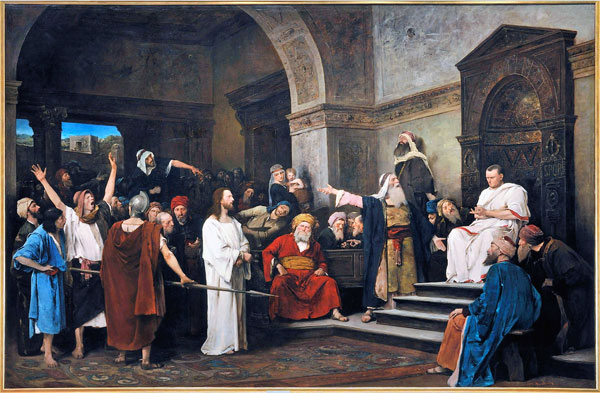
In a word, Jesus was considered so notoriously wicked, that, as the Jews said to Pilate, no trial was necessary to condemn Him. “If He were not a malefactor, we would not have delivered Him up to thee.”
He was contradicted in His very soul; for even His Eternal Father, to give place to Divine Justice, contradicted Him, by refusing to hear His prayer, when He said, “Father, if it be possible, let this chalice pass from Me;” and abandoned Him to fear, weariness, and sadness; so that our afflicted Lord exclaimed, “My soul is sorrowful unto death!” and His interior sufferings even caused Him to sweat blood.
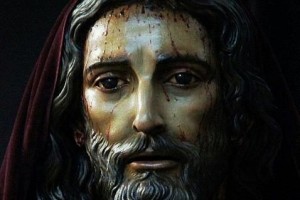
Contradicted and persecuted, in fine, in His body and in His life; for He was tortured in all His sacred members, in His hands, His feet, His face, His head, and in His whole body; so that, drained of His blood, and an object of scorn, He died of torments on an ignominious cross.
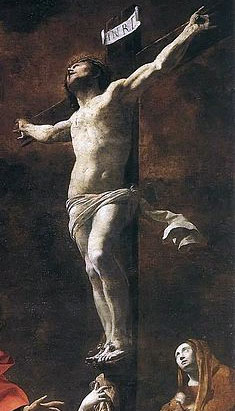
When David, in the midst of all his pleasures and regal grandeur, heard, from the Prophet Nathan, that his son should die—”The child that is born to thee shall surely die,” he could find no peace, but wept, fasted, and slept on the ground. Mary with the greatest calmness received the announcement that her Son should die, and always peacefully submitted to it; but what grief must she continually have suffered, seeing this amiable Son always near her, hearing from Him words of eternal life, and witnessing His holy demeanour! Abraham suffered much during the three days he passed with his beloved Isaac, after knowing that he was to lose him. O God, not for three days, but for three and thirty years had Mary to endure a like sorrow! But do I say a like sorrow? It was as much greater as the Son of Mary was more lovely than the son of Abraham.
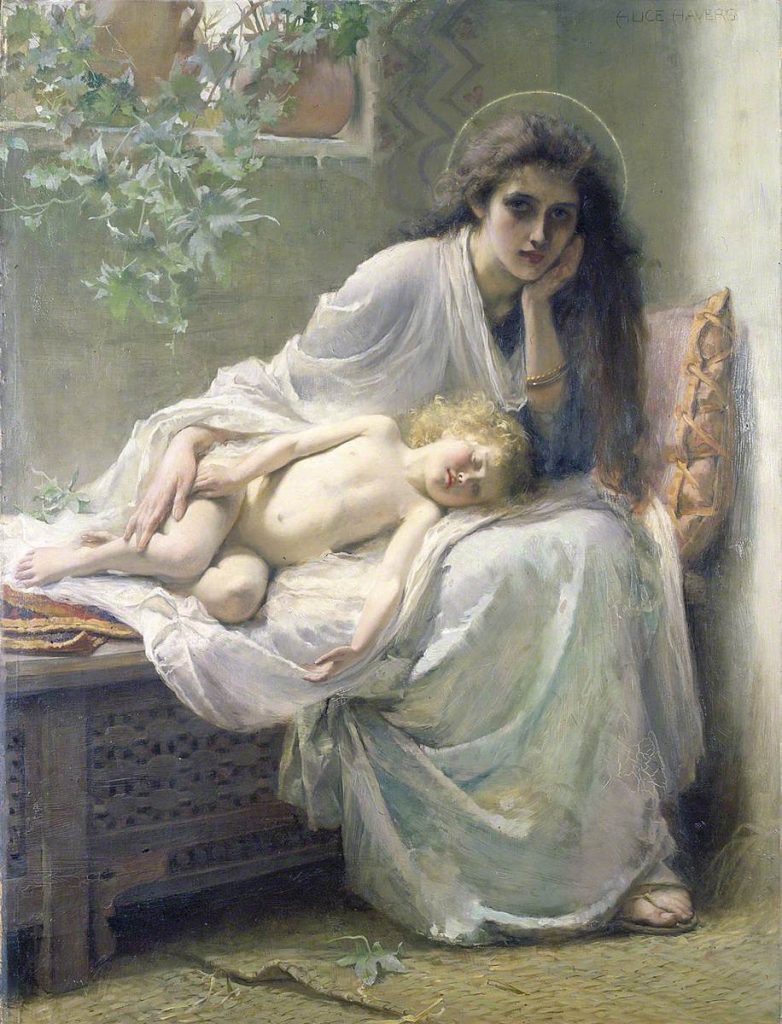
The Blessed Virgin herself revealed to Saint Bridget, that, while on earth, there was not an hour in which this grief did not pierce her soul: “As often,” she continued, “as I looked at my Son, as often as I wrapped Him in His swaddling-clothes, as often as I saw His hands and feet, so often was my soul absorbed, so to say, in fresh grief; for I thought how He would be crucified.”
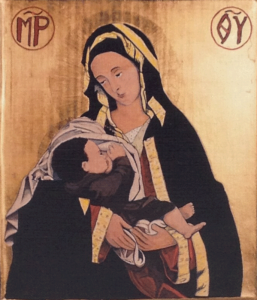
The Abbot Rupert contemplates Mary suckling her Son, and thus addressing Him: “A bundle of myrrh is my Beloved to me; He shall abide between my breasts.” Ah, Son, I clasp Thee in my arms, because Thou art so dear to me; but the dearer Thou art to me, the more dost Thou become a bundle of myrrh and sorrow to me when I think of Thy sufferings. “Mary,” says Saint Bernardine of Sienna, “reflected that the strength of the Saints was to be reduced to agony; the beauty of Paradise to be disfigured; the Lord of the world to be bound as a criminal; the Creator of all things to be made livid with blows; the Judge of all to be condemned; the Glory of heaven despised; the King of kings to be crowned with thorns, and treated as a mock king.”
Father Engelgrave says, that it was revealed to the same Saint Bridget, that the afflicted Mother, already knowing what her Son was to suffer, “when suckling Him, thought of the gall and vinegar; when swathing Him, of the cords with which He was to be hound, when bearing Him in her arms, of the cross to which He was to be nailed; when sleeping, of His death.” As often as she put Him on His garment, she reflected that it would one day be torn from Him, that He might be crucified; and when she beheld His sacred hands and feet, she thought of the nails which would one day pierce them; and then, as Mary said to Saint Bridget, “my eyes filled with tears, and my heart was tortured with grief.”
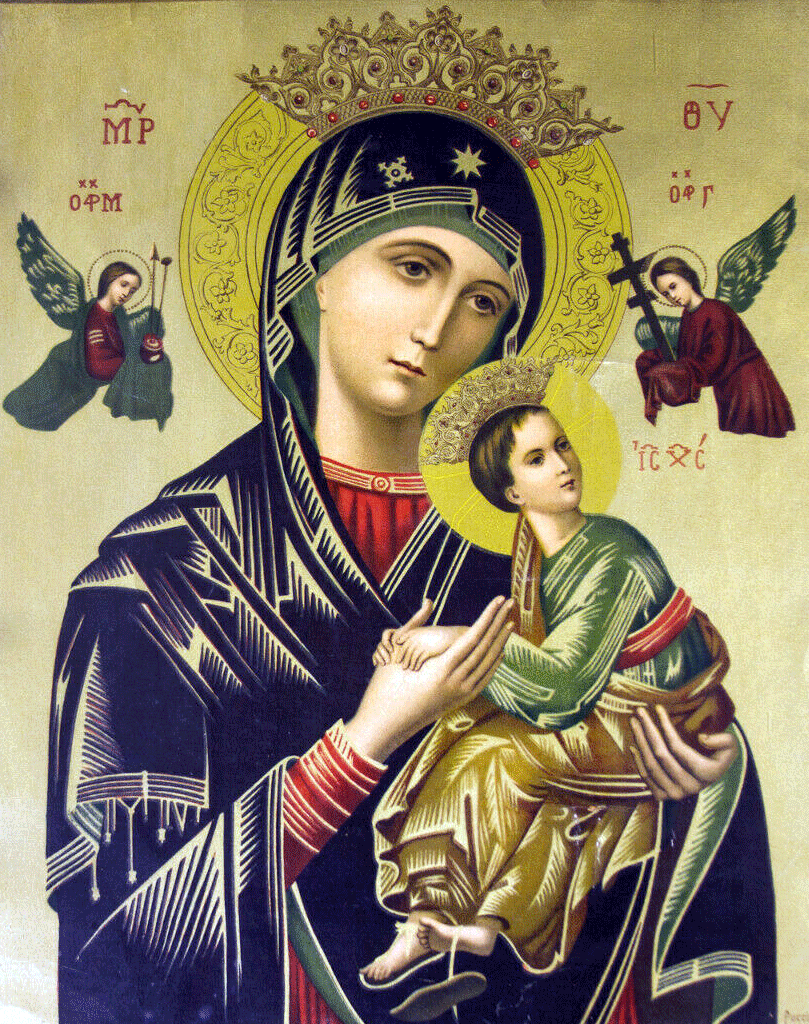
of Observing the Instruments of His Torture
The Evangelist says, that as Jesus Christ advanced in years, so also did “He advance in wisdom and in grace with God and men.” This is to be understood as Saint Thomas explains it, that He advanced in wisdom and grace in the estimation of men and before God, inasmuch as all His works would continually have availed to increase His merit, had not grace been conferred upon Him from the beginning, in its complete fulness, in virtue of the hypostatic union. But since Jesus advanced in the love and esteem of others, how much more must He have advanced in that of Mary! But, O God, as love increased in her, so much the more did her grief increase at the thought of having to lose Him by so cruel a death; and the nearer the time of the Passion of her Son approached, so much the deeper did that sword of sorrow, foretold by Saint Simeon, pierce the heart of His Mother. This was precisely revealed by the angel to Saint Bridget, saying: “That sword of sorrow was every hour approaching nearer to the Blessed Virgin, as the time for the Passion of her Son drew near.”

Since, then, Jesus, our King, and His most holy Mother, did not refuse, for love of us, to suffer such cruel pains throughout their lives, it is reasonable that we, at least, should not complain if we have to suffer something. Jesus, crucified, once appeared to Sister Magdalen Orsini, a Dominicaness, who had been long suffering under a great trial, and encouraged her to remain, by means of that affliction, with Him on the cross. Sister Magdalen complainingly answered: “O Lord, Thou west tortured on the cross only for three hours, and I have endured my pain for many years.” The Redeemer then replied: “Ah, ignorant soul, what dost thou say? from the first moment of My conception I suffered in heart all that I afterwards endured dying on the cross.” If, then, we also suffer and complain, let us imagine Jesus, and His Mother Mary, addressing the same words to ourselves.
Example
Father Roviglione, of the Society of Jesus, relates, that a young man had the devotion of every day visiting a statue of our Lady of Sorrows, in which she was represented with seven swords piercing her heart. The unfortunate youth one night committed a mortal sin. The next morning, going as usual to visit the image, he perceived that there were no longer only seven, but eight swords in the heart of Mary. Wondering at this, he heard a voice telling him that his crime had added the eighth. This moved his heart; and, penetrated with sorrow, he immediately went to confession, and by the intercession of his advocate recovered divine grace.
Prayer
Ah, my Blessed Mother, it is not one sword only with which I have pierced thy heart, but I have done so with as many as are the sins which I have committed. Ah, Lady, it is not to thee, who art innocent, that sufferings are due, but to me, who am guilty of so many crimes. But since thou hast been pleased to suffer so much for me, ah, by thy merits, obtain me great sorrow for my sins, and patience under the trials of this life, which will always be light in comparison with my demerits; for I have often deserved hell. Amen.
1 Click the ▶ Button to pray with the 1st of the Seven Dolors prayers, or play the podcast in a New Window
1 The First Sword of Sorrow:
Simeon Announces the Suffering Destiny of Jesus.
O Mother of Sorrows, how deeply your heart was pierced with sorrow, when Simeon announced that Jesus, your beloved Child, was to be a Sign that would be rejected. Your heart knew that He was to be The Suffering Messiah the prophets had foretold, The Man of Sorrows, Who would carry all our sins, and heal us by His wounds. Through this bitter sorrow, obtain for us the grace, never to reject Jesus, or refuse Him anything. Help us to completely surrender our lives to Him, and to live according to His Most Holy Will in everything.
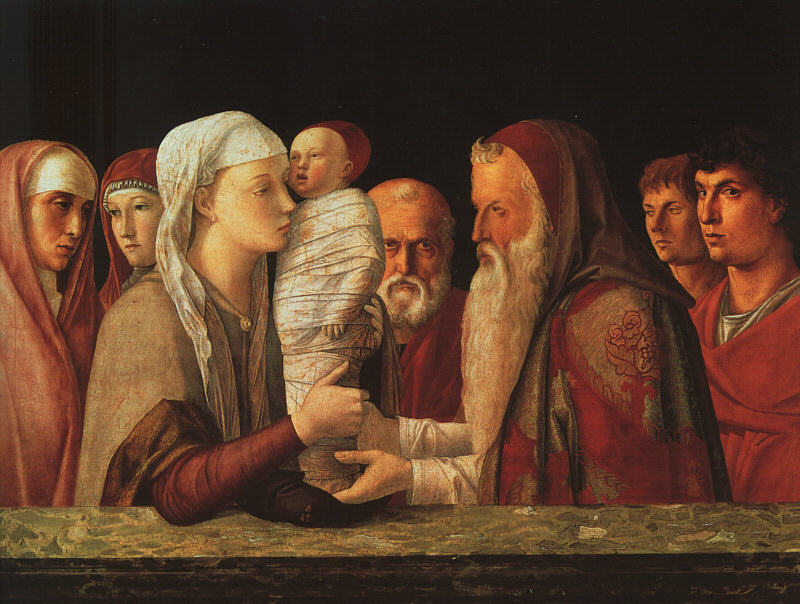
Our Father…Hail Mary (7).
Scriptural rosary verses may be scanned silently on each bead while the enunciation of the Ave Maria proceeds uninterrupted.
- And after eight days were accomplished, that the child should be circumcised, his name was called JESUS, which was called by the angel, before he was conceived in the womb. – Luke 2:21
- And after the days of her purification, according to the law of Moses, were accomplished, they carried him to Jerusalem, to present him to the Lord: As it is written in the law of the Lord: Every male opening the womb shall be called holy to the Lord: And to offer a sacrifice, according as it is written in the law of the Lord, a pair of turtledoves, or two young pigeons: – Luke 2:22-24
- And behold there was a man in Jerusalem named Simeon, and this man was just and devout, waiting for the consolation of Israel; and the Holy Ghost was in him. And he had received an answer from the Holy Ghost, that he should not see death, before he had seen the Christ of the Lord. And he came by the Spirit into the temple. And when his parents brought in the child Jesus, to do for him according to the custom of the law, He also took him into his arms, and blessed God, and said: – Luke 2:25-28
- Now thou dost dismiss thy servant, O Lord, according to thy word in peace. – Luke 2:29
- Because my eyes have seen thy salvation, which thou hast prepared before the face of all peoples: A light to the revelation of the Gentiles, and the glory of thy people Israel. – Luke 2:30-32
- And his father and mother were wondering at those things which were spoken concerning him. And Simeon blessed them, and said to Mary his mother: Behold this child is set for the fall, and for the resurrection of many in Israel, and for a sign which shall be contradicted. – Luke2: 33-34
- And thy own soul a sword shall pierce, that, out of many hearts, thoughts may be revealed. – Luke 2:35
Most merciful Mother, remind us always about the sorrows of your Son, Jesus.
2 Click the ▶ Button to listen to the 2nd Fr. Ripperger meditation podcast, or play the podcast in a New Window
(Skip the second meditation, go to pray the prayer of the Second Sword of Sorrow: Mary Escapes into Egypt with Jesus and Joseph.)
St. Alphonsus: On The Second Dolour
Of the Flight of Jesus to Egypt
As the stag, wounded by an arrow, carries the pain with him wherever he goes, because he carries with him the arrow which has wounded him, so did the Divine Mother, after the sad prophecy of Saint Simeon, as we have already seen in the consideration of the first dolour, always carry her sorrow with her in the continual remembrance of the Passion of her Son.
Hailgrino, explaining this passage of the Canticles, “The hairs of thy head, as the purple of the king, bound in the channel,” says that these purple hairs were Mary’s continual thoughts of the Passion of Jesus, which kept the blood which was one day to flow from His wounds always before her eyes: “Thy mind, O Mary, and thy thoughts, steeped in the blood of our Lord’s Passion, were always filled with sorrow, as if they actually beheld the blood flowing from His wounds.”
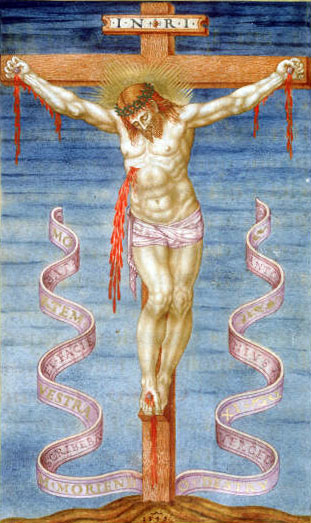
Thus her Son Himself was that arrow in the heart of Mary; and the more amiable He appeared to her, so much the more deeply did the thought of losing Him by so cruel a death wound her heart. Let us now consider the second sword of sorrow which wounded Mary, in the flight of her Infant Jesus into Egypt from the persecution of Herod.
Herod, having heard that the expected Messias was born, foolishly feared that He would deprive him of his kingdom. Hence Saint Fulgentius, reproving him for his folly, thus addresses him: “Why art thou troubled, O Herod? This King who is born comes not to conquer kings by the sword, but to subjugate them wonderfully by His death.” The impious Herod, therefore, waited to hear from the holy Magi where the King was born, that he might take His life; but finding himself deceived, he ordered all the infants who could be found in the neighbourhood of Bethlehem to be put to death.
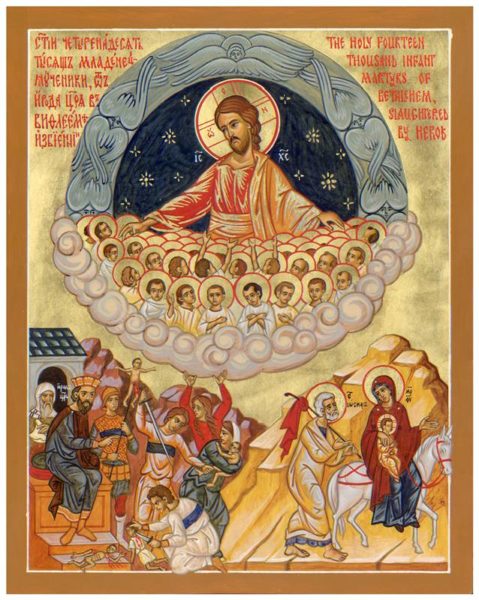
Then it was that the angel appeared in a dream to Saint Joseph, and desired him to “Arise, and take the Child and His Mother, and fly into Egypt.” According to Gerson, Saint Joseph immediately, on that very night, made the order known to Mary; and taking the Infant Jesus, they set out on their journey, as it is sufficiently evident from the Gospel itself: “Who arose and took the Child and His Mother, by night, and retired into Egypt.” O God, says Blessed Albert the Great, in the name of Mary, “must He then fly from men, who came to save men?” Then the afflicted Mother knew that already the prophecy of Simeon concerning her Son began to be verified: “He is set for a sign that shall be contradicted.” Seeing that He was no sooner born than He was persecuted unto death, what anguish, writes Saint John Chrysostom, must the intimation of that cruel exile of herself and her Son have caused in her heart: “Flee from thy friends to strangers, from God’s temple to the temples of devils. What greater tribulation than that a new-born child, hanging from its mother’s breast, and she too in poverty, should with Him be forced to fly ?”

Any one may imagine what Mary must have suffered on this journey. To Egypt the distance was great. Most authors agree that it was three hundred miles; so that it was a journey of upwards of thirty days. The road was, according to Saint Bonaventure’s description of it, “rough, unknown, and little frequented.” It was in the winter season; so that they had to travel in snow, rain, and wind, through rough and dirty roads. Mary was then fifteen years of age a delicate young woman, unaccustomed to such journeys. They had no one to attend upon them. Saint Peter Chrysologus says, “Joseph and Mary have no male or female servants; they were themselves both masters and servants.”

O God, what a touching sight must it have been to have beheld that tender Virgin, with her new-born Babe in her arms, wandering through the world! “But how,” asks Saint Bonaventure, “did they obtain their food? Where did they repose at night? How were they lodged? What can they have eaten but a piece of hard bread, either brought by Saint Joseph or begged as an alms? Where can they have slept on such a road (especially on the two hundred miles of desert, where there were neither houses nor inns, as authors relate), unless on the sand or under a tree in a wood, exposed to the air and the dangers of robbers and wild beasts, with which Egypt abounded. Ah, had any one met these three greatest personages in the world, for whom could he have taken them but for three poor wandering beggars.”
They resided in Egypt, according to Brocard and Jansenius, in a district called Maturea; though Saint Anselm says that they lived in the city of Heliopolis, or at Memphis, now called old Cairo. Here let us consider the great poverty they must have suffered during the seven years which, according to Saint Antoninus, Saint Thomas, and others, they spent there. They were foreigners unknown, without revenues, money, or relations, barely able to support themselves by their humble efforts. “As they were destitute,” says Saint Basil, “it is evident that they must have laboured much to provide themselves with the necessaries of life.” Landolph of Saxony has, moreover, written (and let this be a consolation for the poor), that “Mary lived there in the midst of such poverty that at times she had not even a bit of bread to give to her Son, when, urged by hunger, He asked for it.”
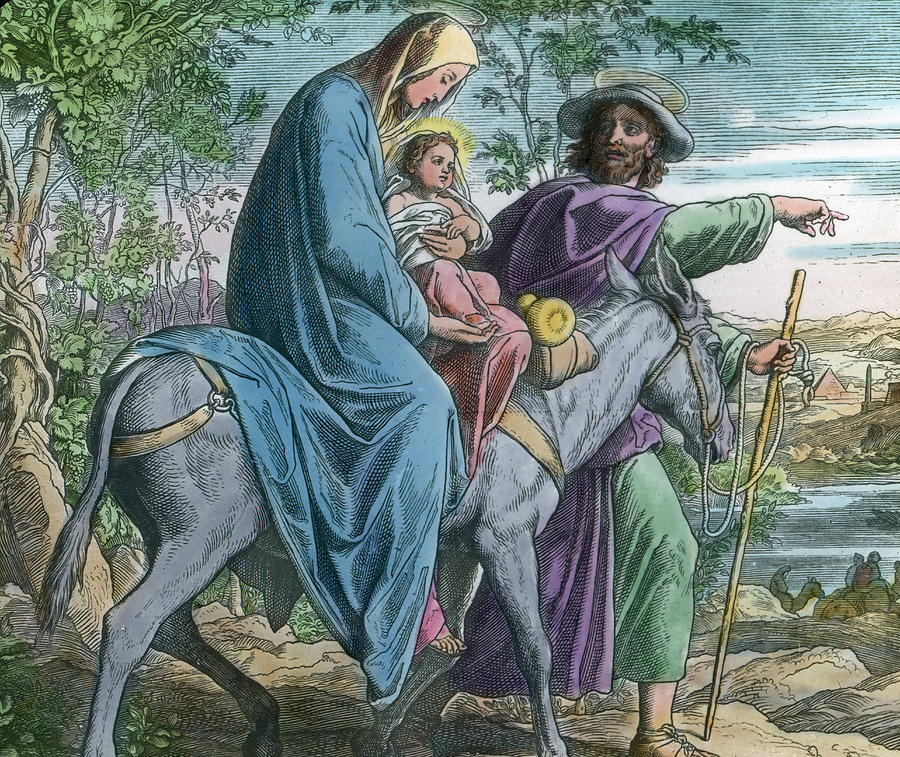
After the death of Herod, Saint Matthew relates, the angel again appeared to Saint Joseph in a dream and directed him to return to Judea. Saint Bonaventure, speaking of this return, considers how much greater the Blessed Virgin’s sufferings must have been on account of the pains of Jesus being so much increased as He was then about seven years of age an age, remarks the Saint, at which “He was too big to be carried, and not strong enough to walk without assistance.”
The sight, then, of Jesus and Mary wandering as fugitives through the world teaches us that we also must live as pilgrims here below, detached from the goods which the world offers us, and which we must soon leave to enter eternity: “We have not here a lasting city, but seek one that is to come.” To which Saint Augustine adds: “Thou art a guest; thou givest a look, and passest on.” It also teaches us to embrace crosses, for without them we cannot live in this world. Blessed Veronica da Binasco, an Augustinian nun, was carried in spirit to accompany Mary with the Infant Jesus on their journey into Egypt; and after it the Divine Mother said, “Daughter, thou hast seen with how much difficulty we have reached this country; now learn that no one receives graces without suffering.” Whoever wishes to feel less the sufferings of this life must go in company with Jesus and Mary: “Take the Child and His Mother.” All sufferings become light, and even sweet and desirable, to him who by his love bears this Son and this Mother in his heart. Let us, then, love them; let us console Mary by welcoming in our hearts her Son, whom men even now continue to persecute by their sins.
Example
The most holy Virgin one day appeared to Blessed Collette, a Franciscan nun, and showed her the Infant Jesus in a basin, torn to pieces, and then said: “Thus it is that sinners continually treat my Son, renewing His death and my sorrows. My daughter, pray for them, that they may be converted.”

To this we may add another vision, which the venerable sister Joanna of Jesus and Mary, also a Franciscan nun, had. She was one day meditating on the Infant Jesus persecuted by Herod, when she heard a great noise, as of armed men pursuing some one; and immediately she saw before her a most beautiful child, who, all out of breath and running, exclaimed: “O my Joanna, help Me, conceal Me! I am Jesus of Nazareth; I am flying from sinners, who wish to kill Me, and persecute Me as Herod did. Do thou save Me.”
Prayer
Then, O Mary, even after thy Son hath died by the hands of men, who persecuted Him unto death, these ungrateful men have not yet ceased persecuting Him by their sins, and continue to afflict thee, O sorrowful Mother! And, O God, I also have been one of these. Ah, my most sweet Mother, obtain me tears to weep over such ingratitude. By the sufferings thou didst endure in thy journey to Egypt, assist me in the journey in which I am now engaged towards eternity; that thus I may at length be united with thee in loving my persecuted Saviour in the kingdom of the blessed. Amen.
2 Click the ▶ Button to pray with the 2nd of the Seven Dolors prayers, or play the podcast in a New Window
2 The Second Sword of Sorrow:
Mary Escapes into Egypt with Jesus and Joseph.
O Mother of Sorrows, what pain filled your heart as you fled your home and country, knowing that the tyrant, Herod, was intent on murdering your little Child, Whom you loved above all else. The hardships of travel, the long journey, and life as a refugee, were nothing compared to the torment of such demonic malice directed toward Jesus. Through this bitter sword of sorrow, obtain for us the grace never to risk the life of Jesus in our souls through deliberate sin.
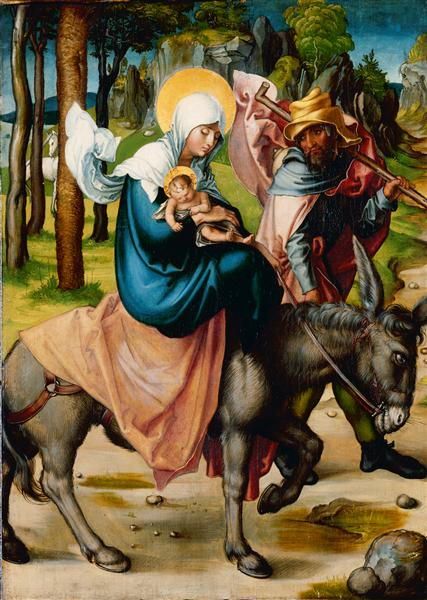
Our Father…Hail Mary (7).
- When Jesus therefore was born in Bethlehem of Juda, in the days of king Herod, behold, there came wise men from the east to Jerusalem, saying, where is he that is born king of the Jews? For we have seen his star in the east, and are come to adore him. – Matthew 2:1-2
- Then Herod, privately calling the wise men, learned diligently of them the time of the star which appeared to them; And sending them into Bethlehem, said, go and diligently inquire after the child, and when you have found him, bring me word again, that I also may come to adore him. – Matthew 2:7-8
- And entering into the house, they found the child with Mary his mother, and falling down they adored him; and opening their treasures, they offered him gifts; gold, frankincense, and myrrh. – Matthew 2:11
- And having received an answer in sleep that they should not return to Herod, they went back another way into their country. – Matthew 2:12
- And after they were departed, behold an angel of the Lord appeared in sleep to Joseph, saying: Arise, and take the child and his mother, and fly into Egypt: and be there until I shall tell thee. For it will come to pass that Herod will seek the child to destroy him. – Matthew 2:13
- Then Herod perceiving that he was deluded by the wise men, was exceeding angry; and sending killed all the men children that were in Bethlehem, and in all the borders thereof, from two years old and under, according to the time which he had diligently inquired of the wise men. – Matthew 2:16
- Thus saith the Lord: A voice was heard on high of lamentation, of mourning, and weeping, of Rachel weeping for her children, and refusing to be comforted for them, because they are not. – Jeremiah 31:15
Most merciful Mother, remind us always about the sorrows of your Son, Jesus.
3 Click the ▶ Button to listen to the 3rd Fr. Ripperger meditation podcast, or play the podcast in a New Window
(Skip the third meditation, go to pray the prayer of the Third Sword of Sorrow: Mary Seeks Jesus, Lost in Jerusalem.)
St. Alphonsus: On The Third Dolour
Of the Loss of Jesus in the Temple
The Apostle Saint James says that our perfection consists in the virtue of patience. “And patience hath a perfect work, that you may be perfect and entire, failing in nothing.” Our Lord having, then, given us the blessed Virgin Mary as a model of perfection, it was necessary that she should be laden with sorrows, that in her we might admire heroic patience, and endeavour to imitate it.

The sorrow which we have this day to consider was one of the greatest that Mary had to endure in her life, the loss of her Son in the temple. He who is born blind feels but little the privation of the light of day; but he who has once enjoyed it, and loses it by becoming blind, indeed suffers much. Thus it is also with those unhappy souls who, blinded by the mire of this world, have but little knowledge of God: they suffer but little at not finding Him; but, on the other hand, he who, illumined by celestial light, has become worthy to find by love the sweet presence of the supreme good, O God, how bitterly does he grieve when he finds himself deprived of it!
Hence, let us see how much Mary must have suffered from this third sword of sorrow which pierced her heart, when, having lost her Jesus in Jerusalem for three days, she was deprived of His most sweet presence, accustomed as she was constantly to enjoy it.
St. Luke relates, in the second chapter of his Gospel, that the Blessed Virgin, with her spouse St. Joseph, and Jesus, was accustomed every year at the paschal solemnity to visit the temple. When her Son was twelve years of age, she went as usual, and Jesus remained in Jerusalem. Mary did not at once perceive it, thinking He was in company with others. When she reached Nazareth, she inquired for her Son; but not finding Him, she immediately returned to Jerusalem to seek for Him, and only found Him after three days.
Now let us imagine what anxiety this afflicted Mother must have experienced in those three days during which she was seeking everywhere for her Son, and inquiring for Him with the spouse in the Canticles: “Have you seen him whom my soul loveth?” But she could have no tidings of Him. O, with how far greater tenderness must Mary, overcome by fatigue, and having not yet found her beloved Son, have repeated those words of Ruben, concerning his brother Joseph: “The boy doth not appear; and whither shall I go?”
“My Jesus doth not appear, and I no longer know what to do to find Him; but where shall I go without my treasure?” Weeping continually, with how much truth did she repeat with David, during those three days, “My tears have been my bread day and night, whilst it is said to me daily: Where is thy God?”
Wherefore Pelbart, with reason, says, that “during those nights the afflicted Mary did not sleep; she was constantly weeping, and entreating God that He would enable her to find her Son.”
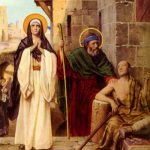 I sought him whom my soul loveth: I sought him, and found him not. I will rise, and will go about the city: in the streets and the broad ways I will seek him whom my soul loveth: I sought him, and I found him not. The watchmen who keep the city, found me: Have you seen him, whom my soul loveth? – Canticles 3:1-2
I sought him whom my soul loveth: I sought him, and found him not. I will rise, and will go about the city: in the streets and the broad ways I will seek him whom my soul loveth: I sought him, and I found him not. The watchmen who keep the city, found me: Have you seen him, whom my soul loveth? – Canticles 3:1-2
Frequently, during that time, according to St. Bernard, she addressed her Son in the words of the spouse in the Canticles: “Show me where thou feedest, where thou liest in the mid-day, lest I begin to wander.” My Son, tell me where Thou art, that I may no longer wander, seeking Thee in vain.
There are some who assert, and not without reason, that this dolour was not only one of the greatest, but the greatest and most painful of all. For, in the first place, Mary, in her other dolours, had Jesus with her: she suffered when Saint Simeon prophesied to her in the temple; she suffered in the flight into Egypt; but still in company with Jesus; but in this dolour she suffered far from Jesus, not knowing where He was: “And the light of my eyes itself is not with me.”
Thus weeping she then said, “Ah, the light of my eyes, my dear Jesus, is no longer with me; He is far from me, and I know not whither He is gone.” Origen says that through the love which this holy Mother bore her Son, “she suffered more in this loss of Jesus than any martyr ever suffered in the separation of his soul from his body.” Ah, too long indeed were those three days for Mary; they seemed three ages; they were all bitterness, for there was none to comfort her. And who can ever comfort me, she said with Jeremias, who can console me, since He who alone could do so is far from me and therefore my eyes can never weep enough: “Therefore do I weep, and my eyes run down with water: because the Comforter . . . is far from me.” And with Tobias she repeated, “What manner of joy shall be to me who sit in darkness, and see not the light of heaven?”
In the second place, Mary, in all her other sorrows, well understood their cause, the redemption of the world, the Divine will; but in this she knew not the cause of the absence of her Son. “The sorrowful Mother,” says Lanspergius, “was grieved at the absence of Jesus, because, in her humility, she considered herself unworthy to remain longer with or to attend upon Him on earth, and have the charge of so great a treasure.” “And who knows,” perhaps she thought within herself “maybe I have not served Him as I ought; perhaps I have been guilty of some negligence, for which He has left me.” “They sought Him,” says Origen, “lest perchance He had entirely left them.”
It is certain that, to a soul which loves God, there can be no greater pain than the fear of having displeased Him. Therefore in this sorrow alone did Mary complain, lovingly expostulating with Jesus, after she had found Him: “Son, why hast Thou done so to us? Thy father and I have sought Thee sorrowing.” By these words she had no idea of reproving Jesus, as heretics blasphemously assert, but only meant to express to Him the grief proceeding from the great love she bore Him, which she had experienced during His absence: “It was not a rebuke,” says Denis the Carthusian, “but a loving complaint.”
In fine, this sword so cruelly pierced the heart of the most holy Virgin, that the blessed Benvenuta, desiring one day to share the holy Mother’s pain in this dolour, and entreating her for this favour, Mary appeared to her with the Infant Jesus in her arms; but while Benvenuta was enjoying the sight of this most beautiful child, in a moment she was deprived of it. So great was her grief, that she had recourse to Mary, entreating her to mitigate it, that it might not cause her death. In three days the holy Virgin again appeared, and said: “Know, my daughter, that thy sorrow is only a small part of that which I endured when I lost my Son.”
This sorrow of Mary ought, in the first place, to serve as a consolation to those souls who are desolate, and no longer enjoy, as they once enjoyed, the sweet presence of their Lord. They may weep, but they should weep in peace, as Mary wept the absence of her Son; and let them take courage, and not fear that on this account they have lost the Divine favour; for God Himself assured Saint Teresa, that “no one is lost without knowing it; and that no one is deceived without wishing to be deceived.”
If our Lord withdraws Himself from the sight of a soul which loves Him, He does not, therefore, depart from the heart; He often conceals Himself from a soul, that she may seek Him with a more ardent desire and greater love. But whoever wishes to find Jesus, must seek Him, not amidst delights and the pleasures of the world, but amidst crosses and mortifications, as Mary sought Him: “we sought Thee sorrowing,” as Mary said to her Son. “I learn, then, from Mary,” says Origen, “to seek Jesus.”
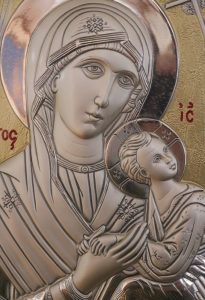
Moreover, in this world she would seek no other good than Jesus. Job was not unhappy when he lost all that he possessed on earth; riches, children, health, and honours, and even descended from a throne to a dunghill; but because he had God with him, he was even then happy. Saint Augustine says, “he had lost what God had given him but he still had God Himself.”
Truly miserable and unhappy are those souls which have lost God. If Mary wept the absence of her Son for three days, how should sinners weep, who have lost divine grace, and to whom God says: “You are not my people, and I will not be yours.” For this is the effect of sin; it separates the soul from God: “Your iniquities have divided between you and your God.” Hence, if sinners possess all the riches of the earth, but have lost God, all, even in this world, becomes vanity and affliction to them, as Solomon confessed: “Behold, all is vanity and vexation of spirit.” But the greatest misfortune of these poor blind souls is, as St. Augustine observes, that “if they lose an ox, they do not fail to go in search of it; if they lose a sheep, they use all diligence to find it; if they lose a beast of burden, they cannot rest; but when they lose their God, who is the supreme good, they eat, drink, and repose.”
Example
In the Annual Letters of the Society of Jesus, it is related that in India a young man was leaving his room with the intention of committing a sin, when he heard a voice saying: “Stop! where art thou going?” He turned round, and saw an image in relief, representing our Lady of Sorrows, who, drawing out the sword which was in her breast, said: “Take this dagger and pierce my heart, rather than wound my Son by committing such a sin.” On hearing these words, the youth prostrated himself on the ground, and bursting into tears, with deep sorrow, asked and obtained pardon from God and our Blessed Lady.
Prayer
O Blessed Virgin, why dost thou afflict thyself, seeking for thy lost Son? Is it that thou knowest not where He is? Knowest thou not that He is in thy heart? Art thou ignorant that He feeds amongst lilies? Thou thyself hast said it: “My Beloved to me, and I to Him, who feedeth among the lilies.” These, thy thoughts and affections, which are all humble, pure, and holy, are all lilies which invite thy Divine Spouse to dwell in thee.
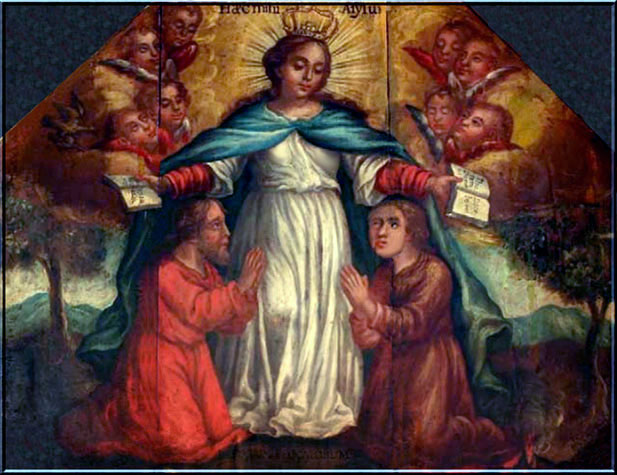
Ah, Mary, dost thou sigh after Jesus, thou who lovest none but Jesus? Leave sighs to me, and to so many sinners who love Him not, and who have lost Him by offending Him. My most amiable Mother, if through my fault thy Son is not yet returned to my soul, do thou obtain for me that I may find Him. I well know that He is found by those who seek Him: “The Lord is good to the soul that seeketh Him.” But do thou make me seek Him as I ought. Thou art the gate through which all find Jesus; through thee I also hope to find Him. Amen.
3 Click the ▶ Button to pray with the 3rd of the Seven Dolors prayers, or play the podcast in a New Window
3 The Third Sword of Sorrow:
Mary Seeks Jesus, Lost in Jerusalem.
O Mother of Sorrows, what grief filled your heart as you and Joseph searched desperately for Jesus, when you could not find Him among your relatives and friends returning home from Jerusalem. When your Son replied that He must be about His Father’s business, you accepted that He had begun the mission that would lead to His sacrificial death. The sorrow of those three days of separation, prepared you for the three days of suffering you endured while His body lay lifeless in the tomb. Through this bitter sword of sorrow, obtain for us the grace to accept the ways of Divine Providence, even when we do not understand them.

Our Father…Hail Mary (7).
- And his parents went every year to Jerusalem, at the solemn day of the pasch. And when he was twelve years old, they going up into Jerusalem, according to the custom of the feast…. – Luke 2:41-42
- And having fulfilled the days, when they returned, the child Jesus remained in Jerusalem; and his parents knew it not. – Luke 2:43
- And thinking that he was in the company, they came a day’s journey, and sought him among their kinsfolks and acquaintance. And not finding him, they returned into Jerusalem, seeking him. – Luke 2:44-45
- And it came to pass, that, after three days, they found him in the temple, sitting in the midst of the doctors, hearing them, and asking them questions. And all that heard him were astonished at his wisdom and his answers. – Luke 2:46-47
- And seeing him, they wondered. And his mother said to him: Son, why hast thou done so to us? behold thy father and I have sought thee sorrowing. – Luke 2:46-47
- And he said to them: How is it that you sought me? did you not know, that I must be about my father’s business? – Luke 2:49
- And they understood not the word that he spoke unto them. And he went down with them, and came to Nazareth, and was subject to them. And his mother kept all these words in her heart. – Luke2:50-51
Most merciful Mother, remind us always about the sorrows of your Son, Jesus.
4 Click the ▶ Button to listen to the 4th Fr. Ripperger meditation podcast, or play the podcast in a New Window
(Skip the fourth meditation, go to pray the prayer of the Fourth Sword of Sorrow: Mary meets Jesus as He carries His cross to Calvary.)
St. Alphonsus: On The Fourth Dolour
On the Meeting of Mary with Jesus, when He was Going to Death
Saint Bernardine says, that to form an idea of the greatness of Mary’s grief in losing her Jesus by death, we must consider the love that this Mother bore to her Son. All mothers feel the sufferings of their children as their own.
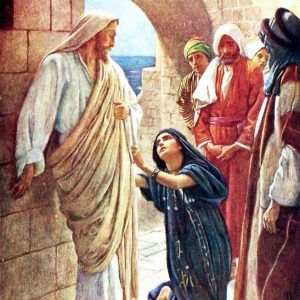
Hence, when the Canaanitish woman entreated our Saviour to deliver her daughter from the devil that tormented her, she asked Him rather to pity her, the mother, than her daughter: “Have mercy on me, O Lord, Thou Son of David, my daughter is grievously troubled by a devil.”
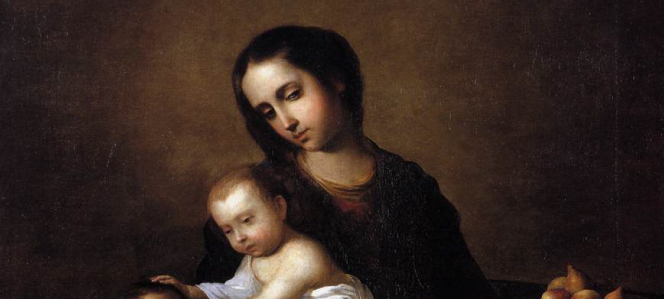
But what mother ever loved her son as Mary loved Jesus? He was her only Son, reared amidst so many troubles; a most amiable Son, and tenderly loving His Mother; a Son who, at the same time that He was her Son, was also her God, who had come on earth to enkindle in the hearts of all the fire of Divine love, as He Himself declared: “I am come to cast fire on the earth, and what will I but that it be kindled?”
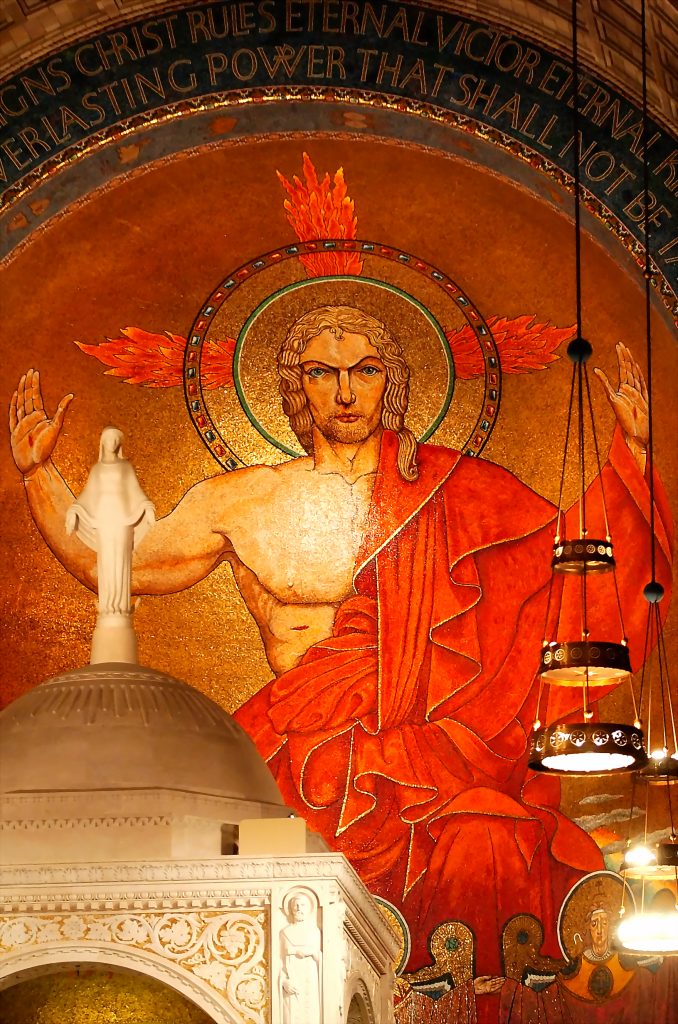
Let us only imagine what a flame He must have enkindled in that pure heart of His holy Mother, void as it was of every earthly affection.
In fine, the Blessed Virgin herself told Saint Bridget, “that love had rendered her heart and that of her Son but one.” That blending together of Servant and Mother, of Son and God, created in the heart of Mary a fire composed of a thousand flames.
But the whole of this flame of love was afterwards, at the time of the Passion, ranged into a sea of grief, when Saint Bernardine declares, “that if all the sorrows of the world were united, they would not equal that of the glorious Virgin Mary.”
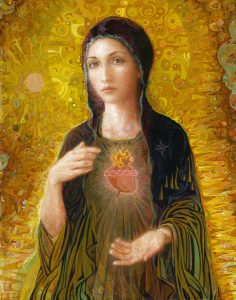
Yes, because, as Richard of St. Lawrence writes, “the more tenderly this Mother loved, so much the more deeply was she wounded.” The greater was her love for Him, the greater was her grief at the sight of His sufferings; and especially when she met her Son, already condemned to death, and bearing His cross to the place of punishment. This is the fourth sword of sorrow which we have this day to consider.
The Blessed Virgin revealed to Saint Bridget, that when the time of the Passion of our Lord was approaching, her eyes were always filled with tears, as she thought of her beloved Son, whom she was about to lose on earth, and that the prospect of that approaching suffering caused her to be seized with fear, and a cold sweat to cover her whole body.
Behold, the appointed day at length came, and Jesus, in tears, went to take leave of His Mother, before going to death. Saint Bonaventure, contemplating Mary on that night, says: “Thou didst spend it without sleep, and whilst others slept thou didst remain watching.” In the morning the disciples of Jesus Christ came to this afflicted Mother, the one to bring her one account, the other another; but all were tidings of sorrow, verifying in her the prophecy of Jeremias: “Weeping, she hath wept in the night, and her tears are on her cheeks; there is none to comfort her of all them that were dear to her.”
Some of them came to relate to her the cruel treatment of her Son in the house of Caiphas; and others, the insults He had received from Herod. Finally to come to our point, I omit all the rest—Saint John came, and announced to Mary, that the most unjust Pilate had already condemned Him to die on the cross. I say the most unjust Pilate; for, as Saint Leo remarks, This unjust judge condemned Him to death with the same lips with which he had declared Him innocent.”
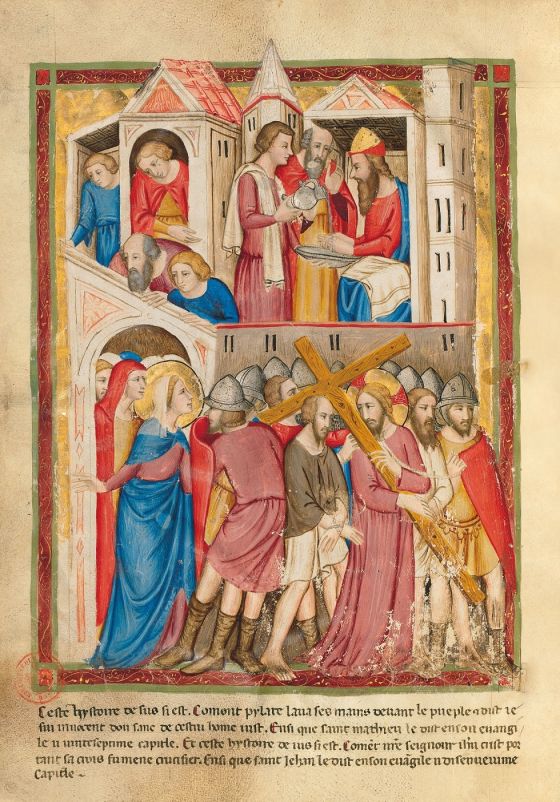
“Ah, afflicted Mother,” said Saint John, “thy Son is already condemned to death; He is already gone forth, bearing Himself His cross, on His way to Calvary,” as the Saint afterwards related in his Gospel: “and bearing His own cross, He went forth to that place which is called Calvary.” “Come, if thou desirest to see Him, and bid Him a last farewell, in some street through which He must pass.”
Mary goes with Saint John, and by the blood with which the way is sprinkled, she perceives that her Son has already passed. This she revealed to Saint Bridget: “By the footsteps of my Son, I knew where He had passed: for along the way the ground was marked with blood.” Saint Bonaventure represents the afflicted Mother taking a shorter way, and placing herself at the corner of a street, to meet her afflicted Son as He was passing by. “The most sorrowful Mother,” says Saint Bernard, “met her most sorrowful Son.” While Mary was waiting in that place, how much must she have heard said by the Jews, who soon recognised her, against her beloved Son, and perhaps even words of mocking against herself.
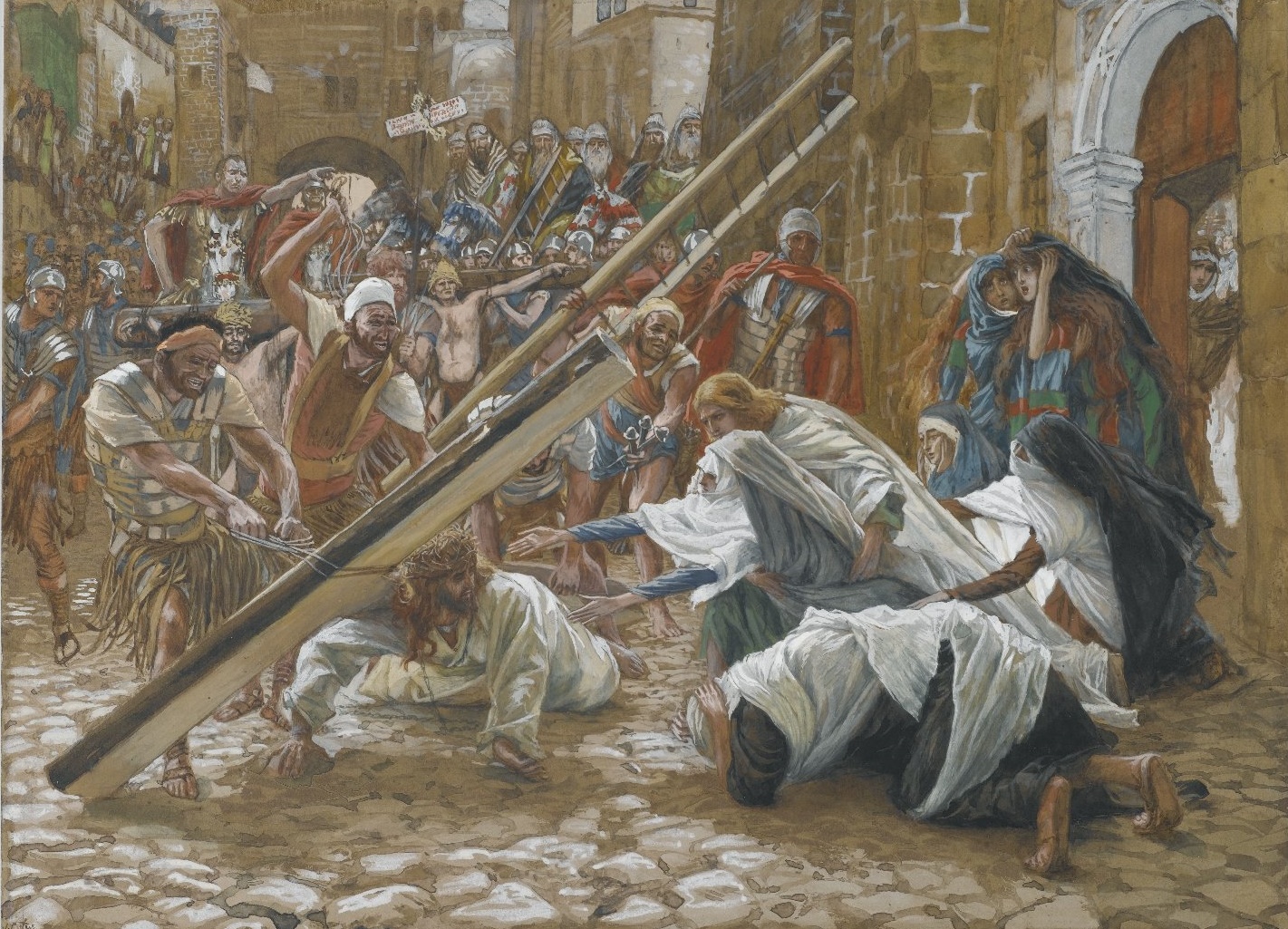
Alas, what a scene of sorrows then presented itself before her! the nails, the hammers, the cords, the fatal instruments of the death of her Son, all of which were borne before Him. And what a sword must the sound of that trumpet have been to her heart, which proclaimed the sentence pronounced against her Jesus!
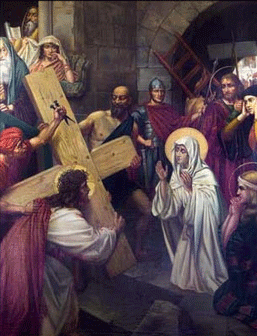
But behold, the instruments, the trumpeter, and the executioners, have already passed; she raised her eyes, and saw, O God ! a young man covered with blood and wounds from head to foot, a wreath of thorns on His head, and two heavy beams on His shoulders. She looked at Him, and hardly recognised Him, saying, with Isaias, “and we have seen Him, and there was no sightliness.”
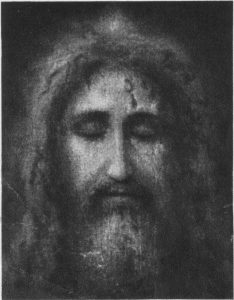
Yes, for the wounds, the bruises, and the clotted blood, gave Him the appearance of a leper: “we have thought Him as it were a leper,” so that He could no longer be known: “and His look was, as it were, hidden and despised; whereupon we esteemed Him not.”
But at length love revealed Him to her, and as soon as she knew that it indeed was He, ah what love and fear must then have filled her heart! as Saint Peter of A1cantara says in his meditations. On the one hand she desired to behold Him, and on the other she dreaded so heart-rending a sight. At length they looked at each other. The Son wiped from His eyes the clotted blood, which, as it was revealed to Saint Bridget, prevented Him from seeing, and looked at His Mother, and the Mother looked at her Son. Ah, looks of bitter grief, which, as so many arrows, pierced through and through those two beautiful and loving souls.
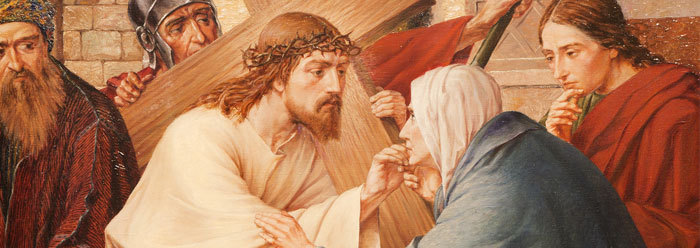
When Margaret, the daughter of Sir Thomas More, met her father on his way to death, she could only exclaim, “O father! father!” and fell fainting at his feet. Mary, at the sight of her Son, on His way to Calvary, did not faint, no, for it was not becoming, as Father Suarez remarks, that this Mother should lose the use of her reason; nor did she die, for God reserved her for greater grief: but though she did not die, her sorrow was enough to have caused her a thousand deaths.
The Mother would have embraced Him, as Saint Anselm says, but the guards thrust her aside with insults, and urged forward the suffering Lord; and Mary followed Him. Ah, holy Virgin, whither goest thou? To Calvary. And canst thou trust thyself to behold Him, who is thy life, hanging on a cross?” And thy life shall be, as it were, hanging before thee.”
“Ah, stop, my Mother” (says Saint Lawrence Justinian, in the name of the Son), “where goest thou? Where wouldst thou come? If thou comest whither I go, thou wilt be tortured with my sufferings, and I with thine.” But although the sight of her dying Jesus was to cost her such bitter sorrow, the loving Mary will not leave Him: the Son advanced, and the Mother followed, to be also crucified with her Son, as the Abbot William says: “the Mother also took up her cross and followed, to be crucified with Him.” “We even pity wild beasts,” as Saint John Chrysostom writes; and did we see a lioness following her cub to death, the sight would move us to compassion. And shall we not also be moved to compassion on seeing Mary follow her immaculate Lamb to death?
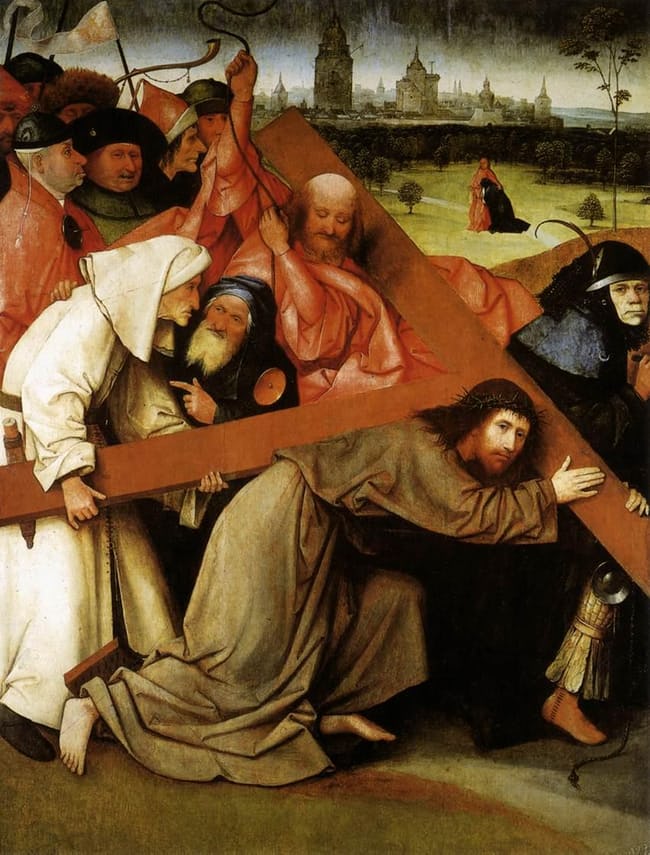
Let us, then, pity her, and let us also accompany her Son and herself, by bearing with patience the cross which our Lord imposes on us. Saint John Chrysostom asks why Jesus Christ, in His other sufferings, was pleased to endure them alone, but in carrying His cross was assisted by the Cyrenean? He replies, that it was “that thou mayest understand that the cross of Christ is not sufficient without thine.”
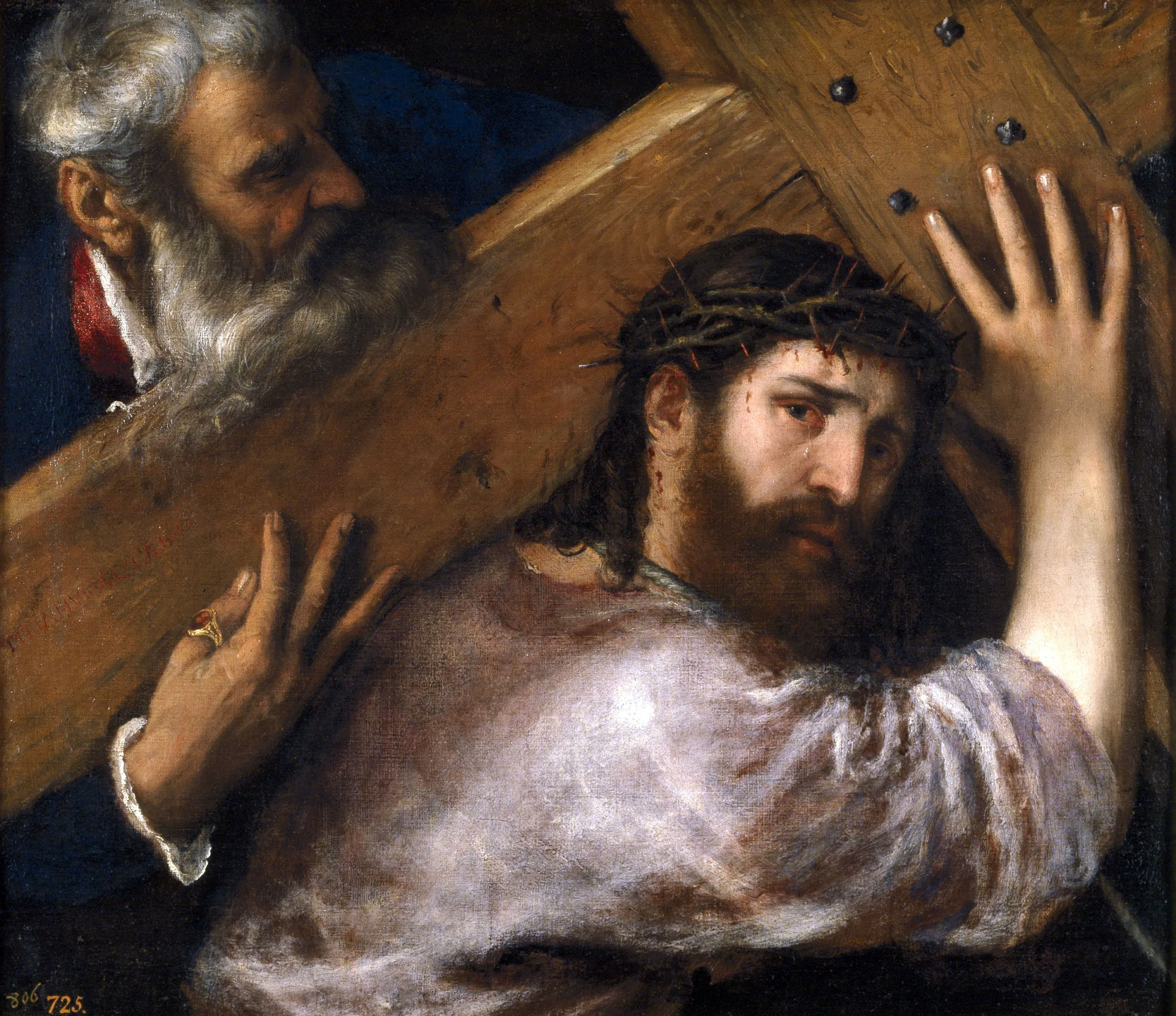
Example
Our Saviour one day appeared to Sister Diomira, a nun in Florence, and said, “Think of Me, and love Me, and I will think of thee and love thee.” At the same time He presented her with a bunch of flowers and a cross, signifying thereby that the consolations of the Saints in this world are always to be accompanied by the cross. The cross unites souls to God. Blessed Jerome Emilian, when a soldier, and loaded with sins, was shut up by his enemies in a tower. There, moved by his misfortunes, and enlightened by God to change his life, he had recourse to the ever-blessed Virgin; and from that time, by the help of this Divine Mother, he began to lead the life of a saint, so much so that he merited once to see the very high place which God had prepared for him in heaven. He became the founder of the religious order of the Somaschi, died as a saint, and has lately been canonized by the holy Church.
Prayer
My sorrowful Mother, by the merit of that grief which thou didst feel in seeing thy beloved Jesus led to death, obtain me the grace, that I also may bear with patience the crosses which God sends me. Happy indeed shall I be, if I only know how to accompany thee with my cross until death. Thou with thy Jesus—and you were both innocent—hast carried a far heavier cross; and shall I, a sinner, who have deserved hell, refuse to carry mine? Ah, immaculate Virgin, from thee do I hope for help to bear all crosses with patience. Amen.

4 Click the ▶ Button to pray with the 4th of the Seven Dolors prayers, or play the podcast in a New Window
4 The Fourth Sword of Sorrow:
Mary meets Jesus as He carries His cross to Calvary.
O Mother of Sorrows, how it must have wounded your tender, maternal heart, to see your beloved Son, Jesus, carrying His cross to Calvary, the place of execution. How it must have pained you to see Him so bloodied, beaten and defiled, as He strained to fulfill His deepest desire, to give His life as a ransom for us. Through this bitter sword of sorrow, obtain for us the grace to deny ourselves, pick up our crosses and follow Jesus with perseverance and love.
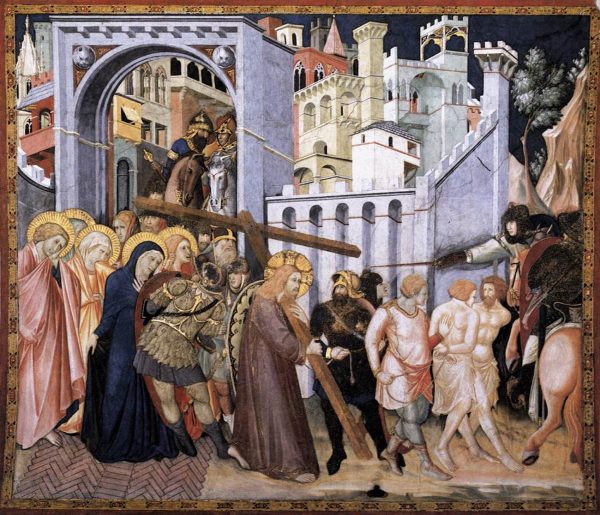
Our Father…Hail Mary (7).
- And bearing his own cross, he went forth to that place which is called Calvary, but in Hebrew Golgotha. – John 19:17
- Surely he hath borne our infirmities and carried our sorrows: and we have thought him as it were a leper, and as one struck by God and afflicted. – Isaiah 53:4
- And there followed him a great multitude of people, and of women, who bewailed and lamented him. But Jesus turning to them, said: Daughters of Jerusalem, weep not over me; but weep for yourselves, and for your children. – Luke 23:27-28
- And as they led him away, they laid hold of one Simon of Cyrene, coming from the country; and they laid the cross on him to carry after Jesus. – Luke 23:26
- And he that taketh not up his cross, and followeth me, is not worthy of me. – Matthew 10:38
- He was offered because it was his own will, and he opened not his mouth: he shall be led as a sheep to the slaughter, and shall be dumb as a lamb before his shearer, and he shall not open his mouth. – Isaiah 53:7
- And they bring him into the place called Golgotha, which being interpreted is, The place of Calvary. – Mark 15:22
Most merciful Mother, remind us always about the sorrows of your Son, Jesus.
5 Click the ▶ Button to listen to the 5th Fr. Ripperger meditation podcast, or play the podcast in a New Window
(Skip the fifth meditation, go to pray the prayer of the Fifth Sword of Sorrow: Mary Stands Near the Cross of Her Son, Jesus.)
St. Alphonsus: On The Fifth Dolour
Of the Death of Jesus
We have now to witness a new kind of martyrdom—a Mother condemned to see an innocent Son, and one whom she loves with the whole affection of her soul, cruelly tormented and put to death before her own eyes: “There stood by the cross of Jesus His Mother.” Saint John believed that in these words he had said enough of Mary’s martyrdom.
Consider her at the foot of the cross in the presence of her dying Son, and then see if there be sorrow like unto her sorrow. Let us remain for a while this day on Calvary, and consider the fifth sword which, in the death of Jesus, transfixed the heart of Mary. As soon as our agonized Redeemer had reached the Mount of Calvary, the executioners stripped Him of His clothes, and piercing His hands and feet “not with sharp but with blunt nails,” as Saint Bernard says, to torment Him more, they fastened Him on the cross. Having crucified Him, they planted the cross, and thus left Him to die.
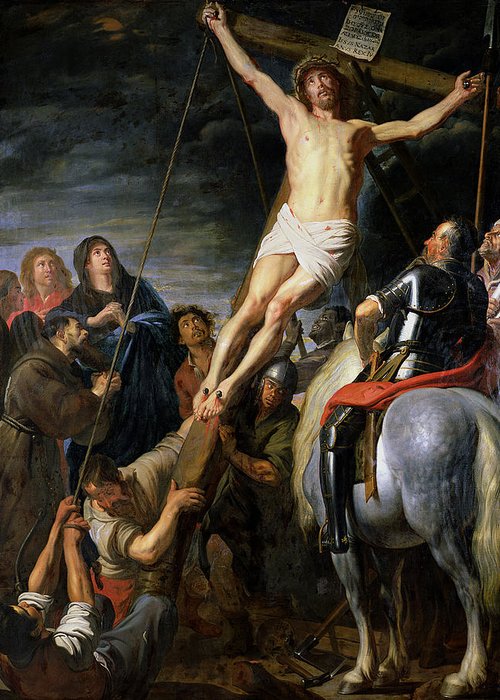
The executioners left Him; but not so Mary. She then drew nearer to the cross, to be present at His death: “I did not leave Him” (thus the Blessed Virgin revealed to Saint Bridget), “but stood nearer to the cross.”
“But what did it avail thee, O Lady,” says Saint Bonaventure, “to go to Calvary, and see this Son expire? Shame should have prevented thee; for His disgrace was thine, since thou wert His Mother. At least, horror of witnessing such a crime as the crucifixion of a God by His own creatures, should have prevented thee from going there.”
But the same Saint answers, “Ah, thy heart did not then think of its own sorrows, but of the sufferings and death of thy dear Son,” and therefore thou wouldst thyself be present, at least to compassionate Him. “Ah, true Mother,” says the Abbot William, “most loving Mother, whom not even the fear of death could separate from thy beloved Son.”
But, O God, what a cruel sight was it there to behold this Son in agony on the cross, and at its foot this Mother in agony, suffering all the torments endured by her Son!
Listen to the words in which Mary revealed to Saint Bridget the sorrowful state in which she saw her dying Son on the cross: “My dear Jesus was breathless, exhausted, and in His last agony on the cross; His eyes were sunk, half-closed, and lifeless; His lips hanging, and His mouth open; His cheeks hollow and drawn in; His face elongated; His nose sharp; His countenance sad: His head had fallen on His breast, His hair was black with blood, His stomach collapsed, His arms and legs stiff, and His whole body covered with wounds and blood.”
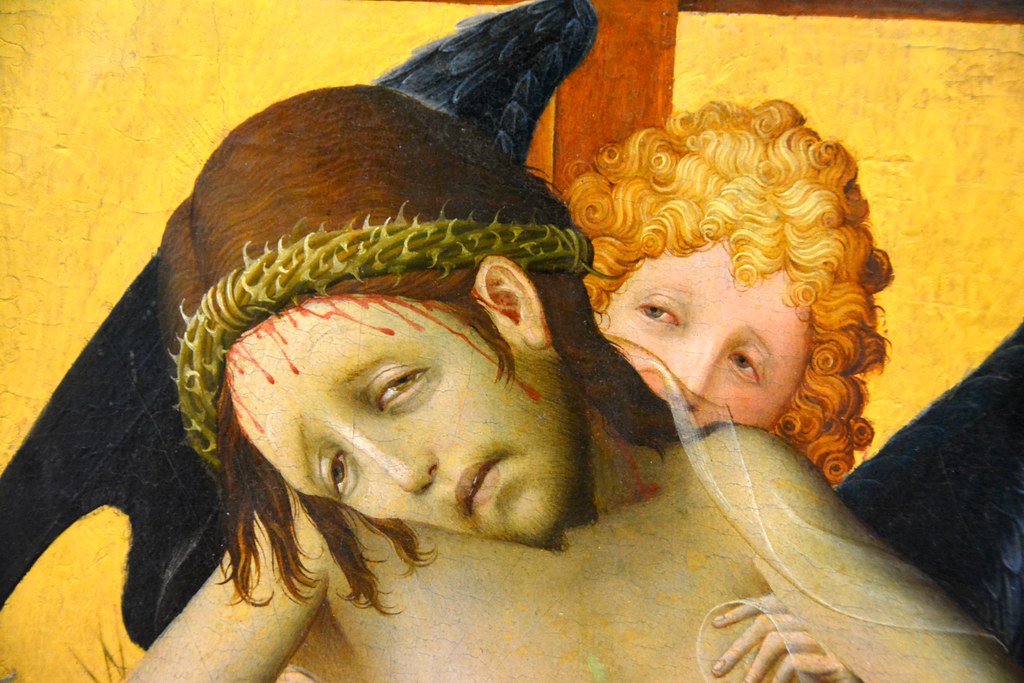
All these sufferings of Jesus were also those of Mary: “Every torture inflicted on the body of Jesus,” says Saint Jerome, “was a wound in the heart of the Mother.” “Whoever then was present on the Mount of Calvary,” says Saint John Chrysostom, “might see two altars, on which two great sacrifices were consummated; the one in the body of Jesus, the other in the heart of Mary.” Nay, better still may we say with Saint Bonaventure, “there was but one altar-that of the cross of the Son, on which, together with this Divine Lamb, the victim, the Mother was also sacrificed.”
Therefore the Saint asks this Mother, “O Lady, where art thou? Near the cross? Nay, rather, thou art on the cross, crucified, sacrificing thyself with thy Son.” Saint Augustine assures us of the same thing: “The cross and nails of the Son were also those of His Mother; with Christ crucified the Mother was also crucified.” Yes; for, as Saint Bernard says, “Love inflicted on the heart of Mary the tortures caused by the nails in the body of Jesus.” So much so that, as Saint Bernardine writes, “At the same time that the Son sacrificed His body, the Mother sacrificed her soul.”
Mothers ordinarily fly from the presence of their dying children; but when a mother is obliged to witness such a scene, she procures all possible relief for her child; she arranges his bed, that he may be more at east; she administers refreshments to him; and thus the poor mother soothes her own grief.
Ah, most afflicted of all Mothers! O Mary, thou hast to witness the agony of the dying Jesus; but thou canst administer Him no relief. Mary heard her Son exclaim, “I thirst,” but she could not even give Him a drop of water to refresh Him in that great thirst. She could only say, as Saint Vincent Ferrer remarks, “My Son, I have only the water of tears.”
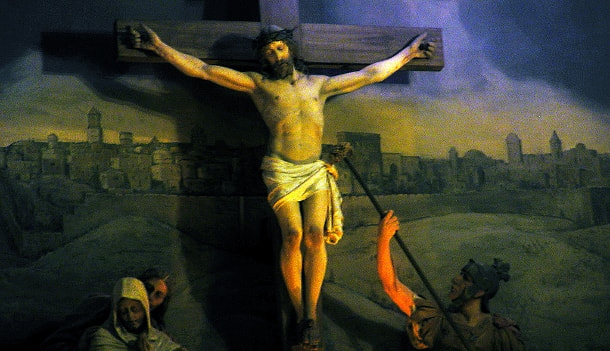
She saw that on that bed of torture her Son, suspended by three nails, could find no repose; she would have clasped Him in her arms to give Him relief, or that at least He might there have expired; but she could not. “In vain,” says Saint Bernard, “did she extend her arms; they sank back empty on her breast.”
She beheld that poor Son, who in His sea of grief sought consolation, as it was foretold by the prophet, but in vain: “I have trodden the winepress alone; I looked about, and there was none to help; I sought, and there was none to give aid.”
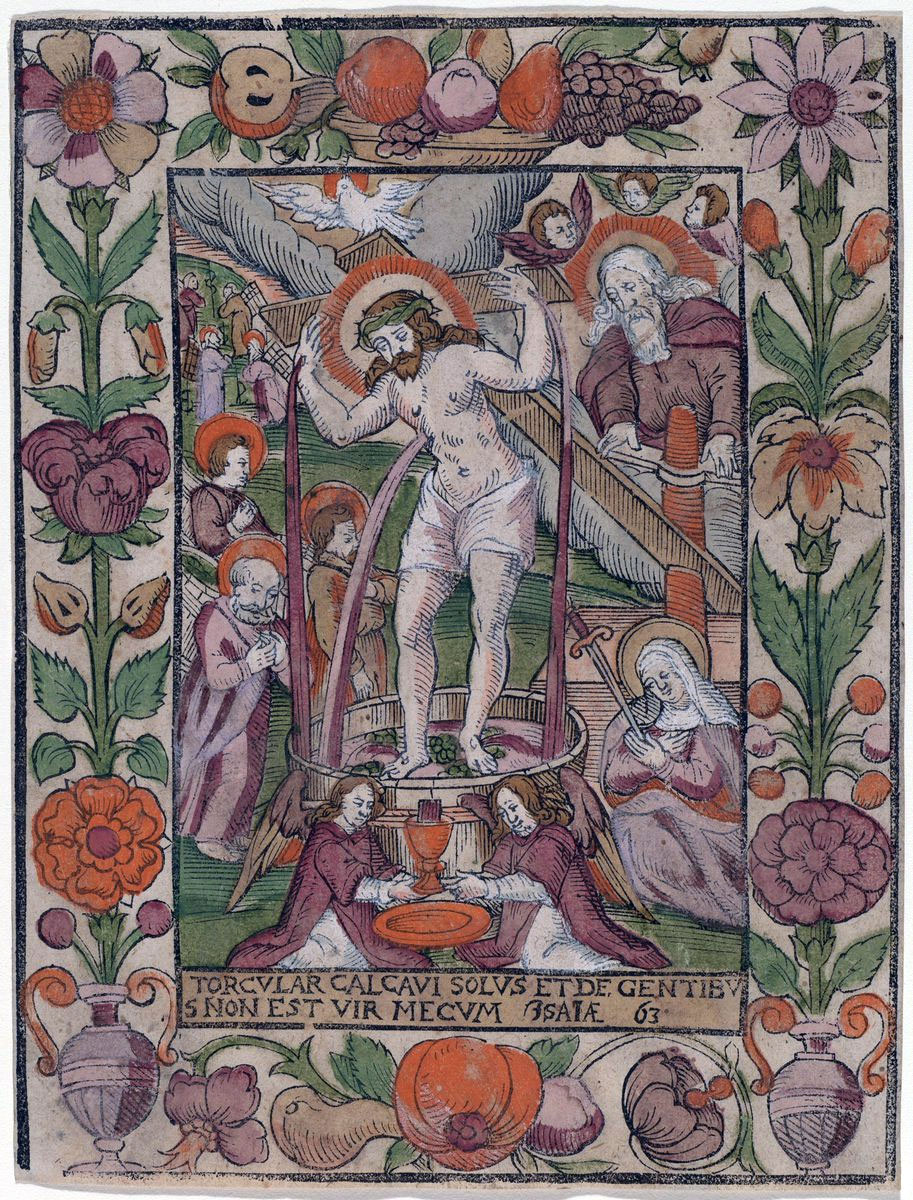
But who amongst men would console Him, since all were enemies? Even on the cross He was taunted and blasphemed on all sides: “and they that passed by, blasphemed Him, wagging their heads.” Some said in His face, “If thou be the Son of God, come down from the cross.” Others, “He saved others, Himself He cannot save.” Again, “If He be the King of Israel, let Him now come down from the cross.”

Our Blessed Lady herself said to St. Bridget, “I heard some say that my Son was a thief; others, that He was an impostor; others, that no one deserved death more than He did; and every word was a new sword of grief to my heart.”
But that which the most increased the sorrows which Mary endured through compassion for her Son, was hearing Him complain on the cross that even His Eternal Father had abandoned Him: “My God, my God, why hast Thou forsaken me?” Words which the Divine Mother told the same Saint Bridget, could never, during her whole life, depart from her mind.
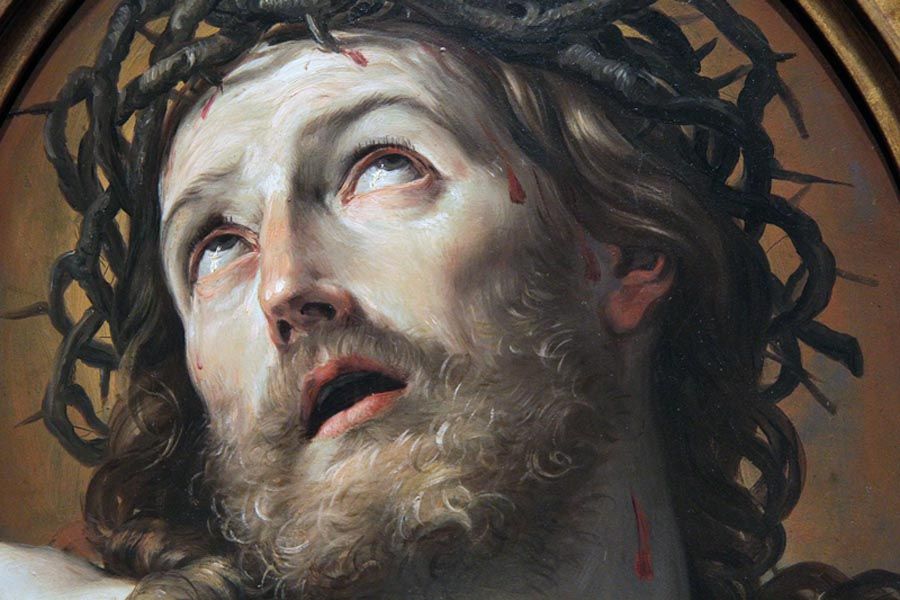
So that the afflicted Mother saw her Jesus suffering on every side; she desired to comfort Him, but could not. And that which grieved her the most was to see that she herself, by her presence and sorrow, increased the sufferings of her Son. “The grief,” says Saint Bernard, “which filled Mary’s heart, as a torrent flowed into and embittered the heart of Jesus.” “So much so,” says the same Saint, “that Jesus on the cross suffered more from compassion for His Mother than from His own torments.”
He thus speaks in the name of our Blessed Lady: “I stood with my eyes fixed on Him, and His on me, and He grieved more for me than for Himself.” And then, speaking of Mary beside her dying Son, he says, “that she lived dying without being able to die:” “Near the cross of Christ His Mother stood half-dead; she spoke not; dying she lived, and living she died; nor could she die, for death was her very life.”
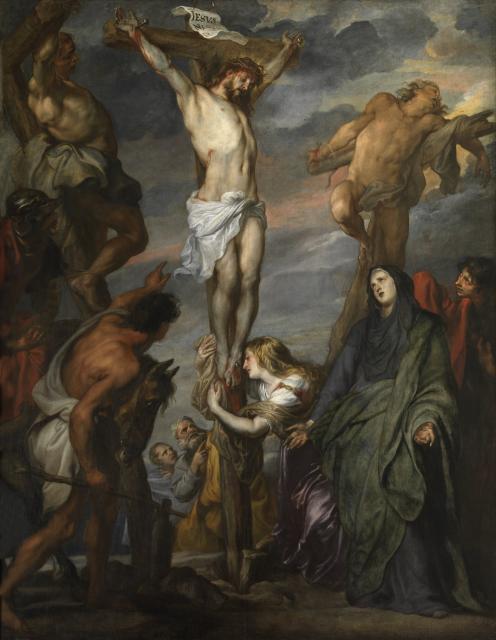
Passino writes that Jesus Christ Himself one day, speaking to blessed Baptista Varani of Camerino, assured her that when on the cross, so great was His affliction at seeing His Mother at His feet in such bitter anguish, that compassion for her caused Him to die without consolation; so much so, that the blessed Baptista, being supernaturally enlightened as to the greatness of this suffering of Jesus, exclaimed, “O Lord, tell me no more of this Thy sorrow, for I can no longer bear it.”
“All,” says Simon of Cassia, “who then saw this Mother silent, and not uttering a complaint in the midst of such great suffering, were filled with astonishment.” But if Mary’s lips were silent, her heart was not so, for she incessantly offered the life of her Son to the Divine Justice for our salvation.
Therefore we know that by the merits of her dolours she cooperated in our birth to the life of grace; and hence we are the children of her sorrows. “Christ,” says Lanspergius, “was pleased that she, the cooperatress in our redemption, and whom He had determined to give us for our Mother, should be there present; for it was at the foot of the cross that she was to bring us, her children, forth.”
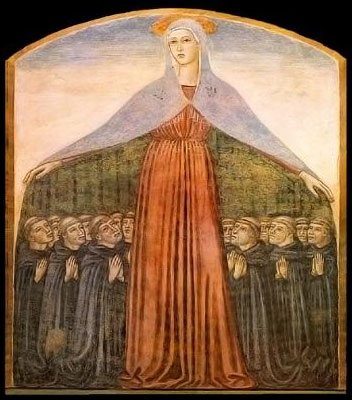
If any consolation entered that sea of bitterness, the heart of Mary, the only one was this, that she knew that by her sorrows she was leading us to eternal salvation, as Jesus Himself revealed to Saint Bridget: “My Mother Mary, on account of her compassion and love, was made the Mother of all in heaven and on earth.”
And indeed these were the last words with which Jesus bid her farewell before His death: this was His last recommendation, leaving us to her for her children in the person of Saint John: “Woman, behold thy son.”
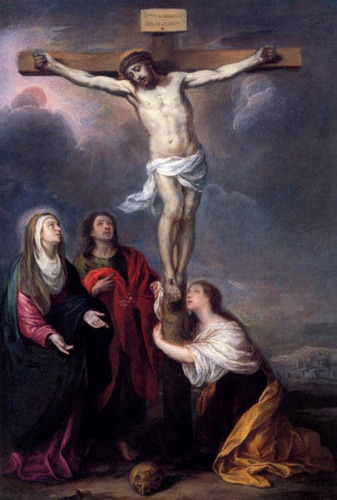
From that time Mary began to perform this good office of a Mother for us; for Saint Peter Damian attests, “that by the prayers of Mary, who stood between the cross of the good thief and that of her Son, the thief was converted and saved, and thereby she repaid a former service. For, as other authors also relate, this thief had been kind to Jesus and Mary on their journey to Egypt; and this same office the Blessed Virgin has ever continued, and still continues, to perform.
Example
A young man in Perugia promised the devil, that if he would enable him to attain a sinful object he had in view, he would give him his soul; and he gave him a written contract to this effect, signed in his own blood. When the crime had been committed, the devil demanded the performance of the promise; and for this purpose led him to the brink of a well, at the same time threatening, that if he did not throw himself in, he would drag him, body and soul, to hell. The wretched youth, thinking that it would be impossible to escape from his hands, got on the little parapet to cast himself in; but terrified at the idea of death, he told the devil that he had not courage to take the leap, but that if he was determined on his death, he must push him in. The young man wore a scapular of the Dolours of Mary; the devil therefore said, “Take off that scapular, and then I will push thee in.” But the youth, discovering in the scapular the protection still vouchsafed to him by the Divine Mother, refused to do so, and at length, after much altercation, the devil, filled with confusion, departed; and the sinner, grateful to the sorrowful Mother, went to thank her, and, penitent for his sins, presented as a votive offering to her altar, in the church of Santa Maria la Nuova in Perugia, a picture of what had taken place.
Prayer
Ah, Mother the most sorrowful of all mothers, thy Son is, then, dead; that Son so amiable, and who loved thee so much! Weep, then, for thou hast reason to weep. Who can ever console thee? The thought alone, that Jesus by His death conquered hell, opened heaven until then closed to men, and gained so many souls, can console thee. From that throne of the cross He will reign in so many hearts, which, conquered by His love, will serve Him with love.
Disdain not, in the meantime, O my Mother, to keep me near thee, to weep with thee, since I have so much reason to weep for the crimes by which I have offended Him. Ah, Mother of Mercy, I hope, first, through the death of my Redeemer, and then through thy sorrows, to obtain pardon and eternal salvation.
5 Click the ▶ Button to pray with the 5th of the Seven Dolors prayers, or play the podcast in a New Window
5 The Fifth Sword of Sorrow:
Mary Stands Near the Cross of Her Son, Jesus.
O Mother of Sorrows, here the prophecy of Simeon comes to its ultimate fulfillment. The sword of sorrow impales your heart as you stand beneath the cross of your Son. Crucified spiritually with your crucified Son, you offered Him to the Father, and united yourself completely to His self offering and sacrificial death. We simply cannot fathom the pain of your offering, or the depth of love that inspired it. Through this bitter sword of sorrow, obtain for us the grace to unite all our sufferings to our crucified Lord, with unselfish generosity and love.
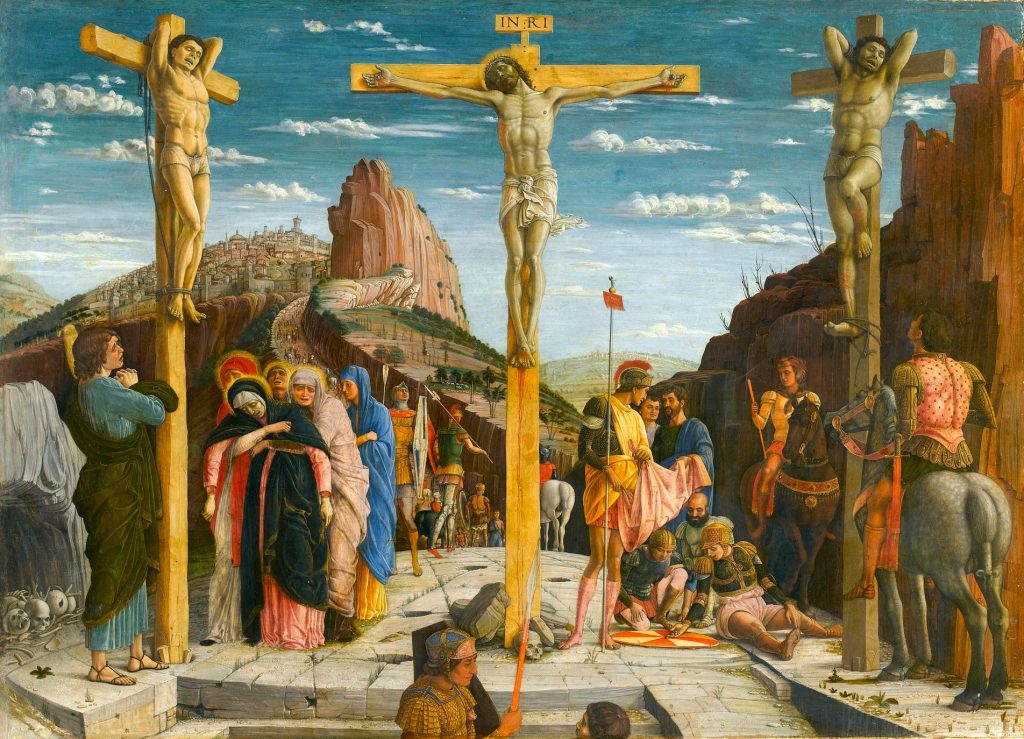
Our Father…Hail Mary (7).
- And Jesus said: Father, forgive them, for they know not what they do. But they, dividing his garments, cast lots. – Luke 23:34
- And he said to Jesus: Lord, remember me when thou shalt come into thy kingdom. And Jesus said to him: Amen I say to thee, this day thou shalt be with me in paradise. – Luke 23:42-43
- When Jesus therefore had seen his mother and the disciple standing whom he loved, he saith to his mother: Woman, behold thy son. After that, he saith to the disciple: Behold thy mother. And from that hour, the disciple took her to his own. – John 19:26-27
And the dragon was angry against the woman: and went to make war with the rest of her seed, who keep the commandments of God, and have the testimony of Jesus Christ. – Revelation 12:17 - And at the ninth hour, Jesus cried out with a loud voice, saying: Eloi, Eloi, lamma sabacthani? Which is, being interpreted, My God, my God, why hast thou forsaken me? – Mark 15:34
- Afterwards, Jesus knowing that all things were now accomplished, that the scripture might be fulfilled, said: I thirst. – John 19:28
- And Jesus crying out with a loud voice, said: Father, into thy hands I commend my spirit. And saying this, he gave up the ghost. – Luke 23:46
- Jesus therefore, when he had taken the vinegar, said: It is consummated. And bowing his head, he gave up the ghost. – John 19:30
Most merciful Mother, remind us always about the sorrows of your Son, Jesus.
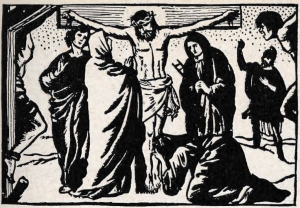
Click the ▶ Button to sing the prayer (key for Women), or play the song in a New Window ⧉
Click the ▶ Button to sing the prayer (key for Men), or play the song in a New Window ⧉
| Fr. Frederick William Faber (1849) | John Bacchus Dykes St. Cross (1861) |
|---|---|
| 1. Oh! come and mourn with me awhile; See, Mary calls us to her side; Oh! come and let us mourn with her; Jesus, our Love, is crucified! |
2. Have we no tears to shed for Him, While soldiers scoff and Jews deride? Ah, look how patiently He hangs: Jesus, our Love, is crucified! |
| 3. Sev’n times He spoke, sev’n words of love, And all three hours His silence cried For mercy on the souls of men: Jesus our Love, is crucified! |
4 Come, take thy stand beneath the Cross, And let the Blood from out that Side Fall gently on thee drop by drop; Jesus our Love, is crucified! Amen. |
Click ^ again to contract
Click the ▶ Button to sing the prayer (key for Women), or play the song in a New Window ⧉
Click the ▶ Button to sing the prayer (key for Men), or play the song in a New Window ⧉
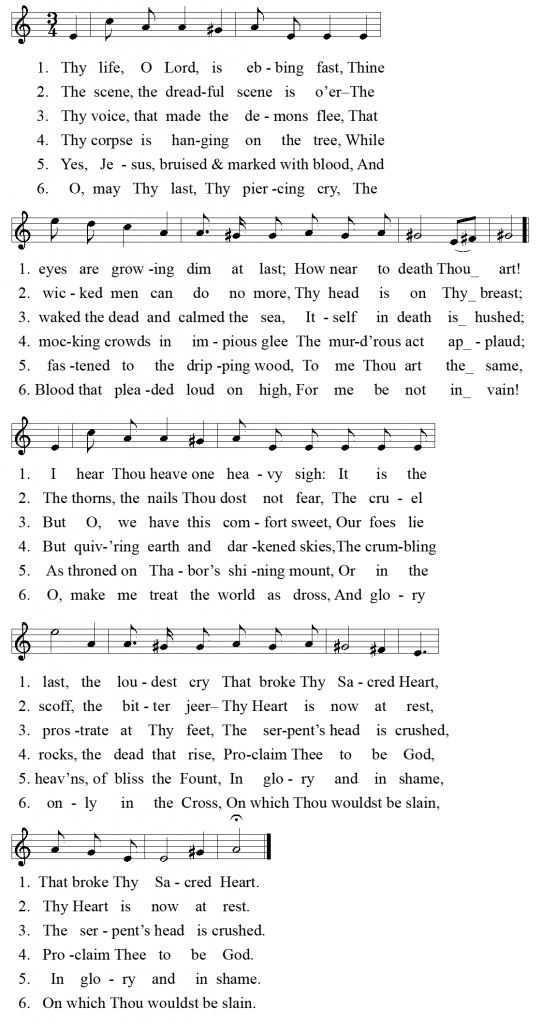
| Anonymous | The Sodalist’s Hymnal (1887) |
|---|---|
| 1. Thy life, O Lord, is ebbing fast, Thine eyes are growing dim at last; How near to death Thou art! I hear Thou heave one heavy sigh: It is the last, the loudest cry That broke Thy Sacred Heart, That broke Thy Sacred Heart. |
2. The scene, the dreadful scene is o’er– The wicked men can do no more, Thy head is on Thy breast; The thorns, the nails Thou dost not fear, The cruel scoff, the bitter jeer– Thy Heart is now at rest, Thy Heart is now at rest. |
| 3. Thy voice, that made the demons flee, That waked the dead and calmed the sea, Itself in death is hushed; But O, we have this comfort sweet, Our foes lie prostrate at Thy feet, The serpent’s head is crushed, The serpent’s head is crushed. |
4. Thy corpse is hanging on the tree, While mocking crowds in impious glee The murd’rous act applaud; But quiv’ring earth and darkened skies, The crumbling rocks, the dead that rise, Proclaim Thee to be God, Proclaim Thee to be God. |
| 5. Yes, Jesus, bruised and marked with blood, And fastened to the dripping wood, To me Thou art the same, As throned on Thabor’s shining mount, Or in the heav’ns, of bliss the Fount, In glory and in shame, In glory and in shame. |
6. O, may Thy last, Thy piercing cry, The Blood that pleaded loud on high, For me be not in vain! O, make me treat the world as dross, And glory only in the Cross, On which Thou wouldst be slain, On which Thou wouldst be slain! Amen. |
O Jesus, my Savior! I see You now dead on this cross. You speak no more; You breathe no more; because You have life no longer, having willed to lose it to give life to our souls. You have no longer any blood; for you have shed it all, by dint of torments, to wash away our sins. In one word, You have abandoned Yourself to death through Your love for us. He has loved us, and delivered Himself for us. – Ephesians 5:2. “Let us consider,” writes St. Francis de Sales, “this divine Savior stretched upon the cross, as upon His altar of honor, where He is dying of love for us; but a love more painful than that very death. Ah, why, then, do we not in spirit throw ourselves upon Him to die upon the cross with Him, Who has willed to die there for love of us? ‘I will hold Him’, we ought to say, ‘and will never let Him go. I will die with Him, and be burned up in the flames of His love. One and the same fire shall consume this divine Creator and His miserable creature. My Jesus is all mine, and I am all His. I will live and die upon his breast; neither death nor life shall ever separate him from me.'” – St. Alphonsus de Liguori, The Passion of Jesus Christ. 2. “The death of Jesus”.
6 Click the ▶ Button to listen to the 6th Fr. Ripperger meditation podcast, or play the podcast in a New Window
(Skip the sixth meditation, go to pray the prayer of the Sixth Sword of Sorrow: Mary Receives into Her Arms, the Body of Jesus Taken Down from the Cross.)
St. Alphonsus: On The Sixth Dolour
The Piercing of the Side of Jesus, and His descent from the Cross
“O, all ye that pass by the way, attend, and see if there be any sorrow like to my sorrow.” Devout souls, listen to what the sorrowful Mary says this day: “My beloved children, I do not wish you to console me; no, for my soul is no longer susceptible of consolation in this world after the death of my dear Jesus. If you wish to please me, this is what I ask of you; behold me, and see if there ever has been in the world a grief like mine, in seeing Him who was all my love torn from me with such cruelty.”
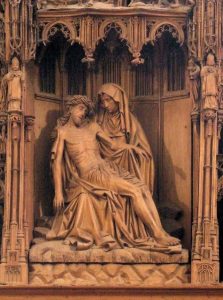
But, my sovereign Lady, since thou wilt not be consoled, and hast so great a thirst for sufferings, I must tell thee that, even with the death of thy Son, thy sorrows have not ended. On this day thou wilt be wounded by another sword of sorrow, a cruel lance will pierce the side of thy Son already dead, and thou hast to receive Him in thine arms after He is taken down from the cross.
And now we are to consider the Sixth Dolour which afflicted this poor Mother. Attend and weep. Hitherto the dolours of Mary tortured her one by one; on this day they are all, as it were, united to assail her. It is enough to tell a mother that her son is dead, to excite all her love. Some persons, that they may lessen a mother’s grief, remind her of the displeasure at one time caused by her departed child. But I, my Queen, did I thus wish to lighten thy grief for the death of Jesus, of what displeasure that He ever caused thee could I remind thee? No, indeed. He always loved thee, always obeyed thee, and always respected thee. Now thou hast lost Him, who can ever tell thy grief? Do thou explain it, thou who hast experienced it.
A devout author says, that when our beloved Redeemer was dead, the first care of the great Mother was to accompany in spirit the most holy soul of her Son, and present it to the Eternal Father.
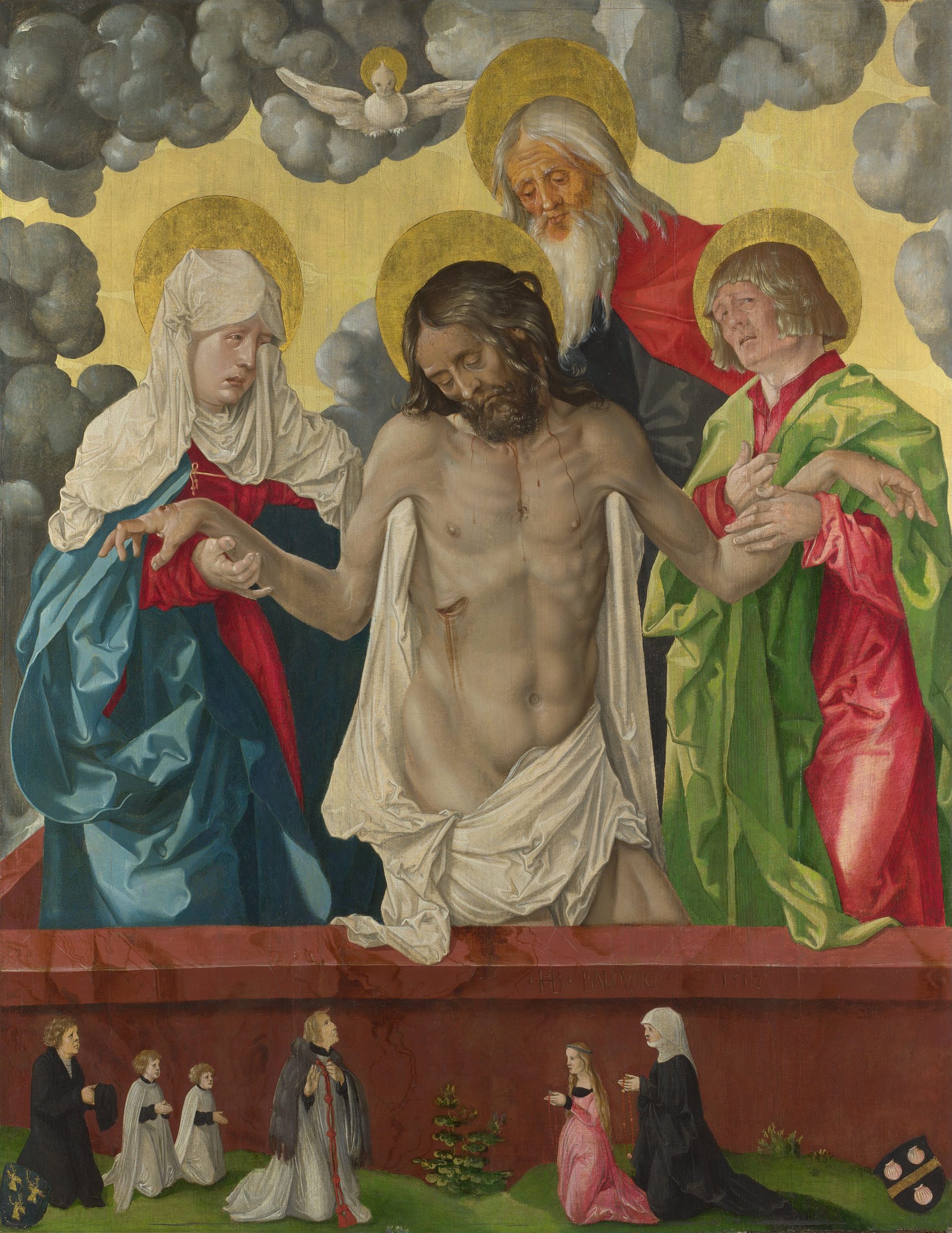
“I present Thee, O my God,” Mary must then have said, “the Immaculate soul of Thine and my Son; He has now obeyed Thee unto death; do Thou, then, receive it in Thine arms. Thy justice is now satisfied, Thy will is accomplished; behold, the great sacrifice to Thy eternal glory is consummated.”
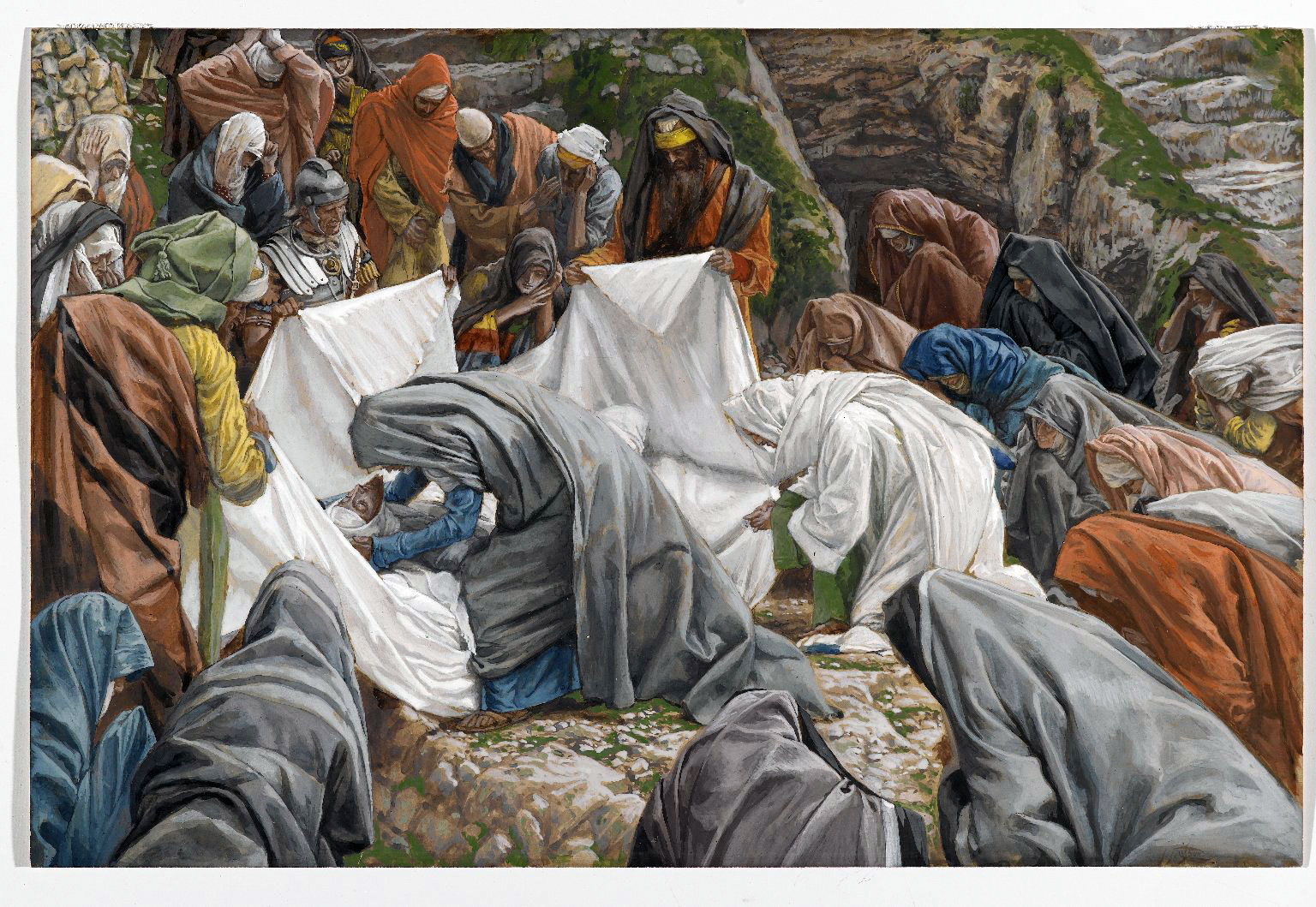
Then, turning towards the lifeless members of her Jesus, “O wounds,” she said, “O wounds of love, I adore you, and in you do I rejoice; for by your means salvation is given to the world. You will remain open in the body of my Son, and be the refuge of those who have recourse to you. O, how many, through you, will receive the pardon of their sins, and by you be inflamed with love for the supreme good!”
That the joy of the following Paschal Sabbath might not be disturbed, the Jews desired that the body of Jesus should be taken down from the cross; but as this could not be done unless the criminals were dead, men came with iron bars to break our Lord’s legs, as they had already done those of the two thieves who were crucified with Him. Mary was still weeping over the death of her Son, when she saw these armed men advancing towards her Jesus. At this sight she first trembled with fear, and then exclaimed: “Ah, my Son is already dead; cease to outrage Him; torment me no more, who am His poor Mother.” She implored them, writes Saint Bonaventure, “not to break His legs.”

But while she thus spoke, O God! She saw a soldier brandish a lance, and pierce the side of Jesus: “One of the soldiers with a spear opened His side, and immediately there came out blood and water.” At the stroke of the spear the cross shook, and, as it was afterwards revealed to Saint Bridget, the heart of Jesus was divided in two. There came out blood and water; for only those few drops of blood remained, and even those our Saviour was pleased to shed, that we might understand that He had no more blood to give us. The injury of that stroke was inflicted on Jesus, but Mary suffered its pain. “Christ,” says the devout Lanspergius, “shared this sound with His Mother; He received the insult, His Mother endured its agony.”
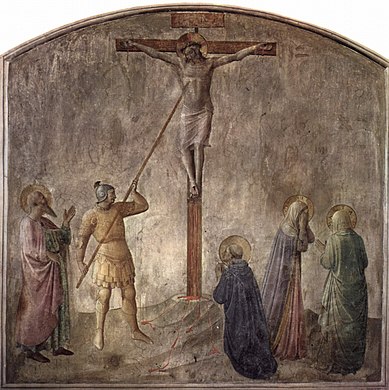
The holy fathers maintain that this was literally the sword foretold to the Blessed Virgin by Saint Simeon: a sword, not a material one, but one of grief, which transpierced her blessed soul in the heart of Jesus, where it always dwelt. Thus, amongst others, Saint Bernard says: “The lance which opened His side passed through the soul of the Blessed Virgin, which could never leave her Son’s heart.” The divine Mother herself revealed the same thing to Saint Bridget: “When the spear was drawn out, the point appeared red with blood: then, seeing the heart of my most dear Son pierced, it seemed to me as if my own heart was also pierced.” An angel told the same Saint, “that such were the sufferings of Mary, that it was only by a miraculous interposition on the part of God, that she did not die.” In her other dolours she at least had her Son to compassionate her; but now she has not even Him to pity her.
The afflicted Mother, fearing that other injuries might still be inflicted on her Son, entreated Joseph of Arimathea to obtain the body of her Jesus from Pilate, that at least in death she might guard and protect it from further outrage. Joseph went, and represented to Pilate the grief and desires of this afflicted Mother. Saint Anselm believes that compassion for the Mother softened the heart of Pilate, and moved him to grant her the body of the Saviour. Jesus was then taken down from the cross.
O most sacred Virgin, after thou hast given thy Son to the world, with so great love, for our salvation, behold the world now restores Him to thee; but, O God, in what state dost thou receive Him? O world, said Mary, how dost thou return Him to me? “My Son was white and ruddy;” but thou returnest Him to me blackened with bruises, and red-yes! But with the wounds which thou hast inflicted upon Him. He was all fair and beautiful; but now there is no more beauty in Him; He is all disfigured. His aspect enamoured all; now He excites horror in all who behold Him. “O, how many swords,” says Saint Bonaventure, “pierced the poor Mother’s soul” when she received the body of her Son from the cross! Let us only consider the anguish it would cause any mother to receive into her arms the body of her lifeless son.
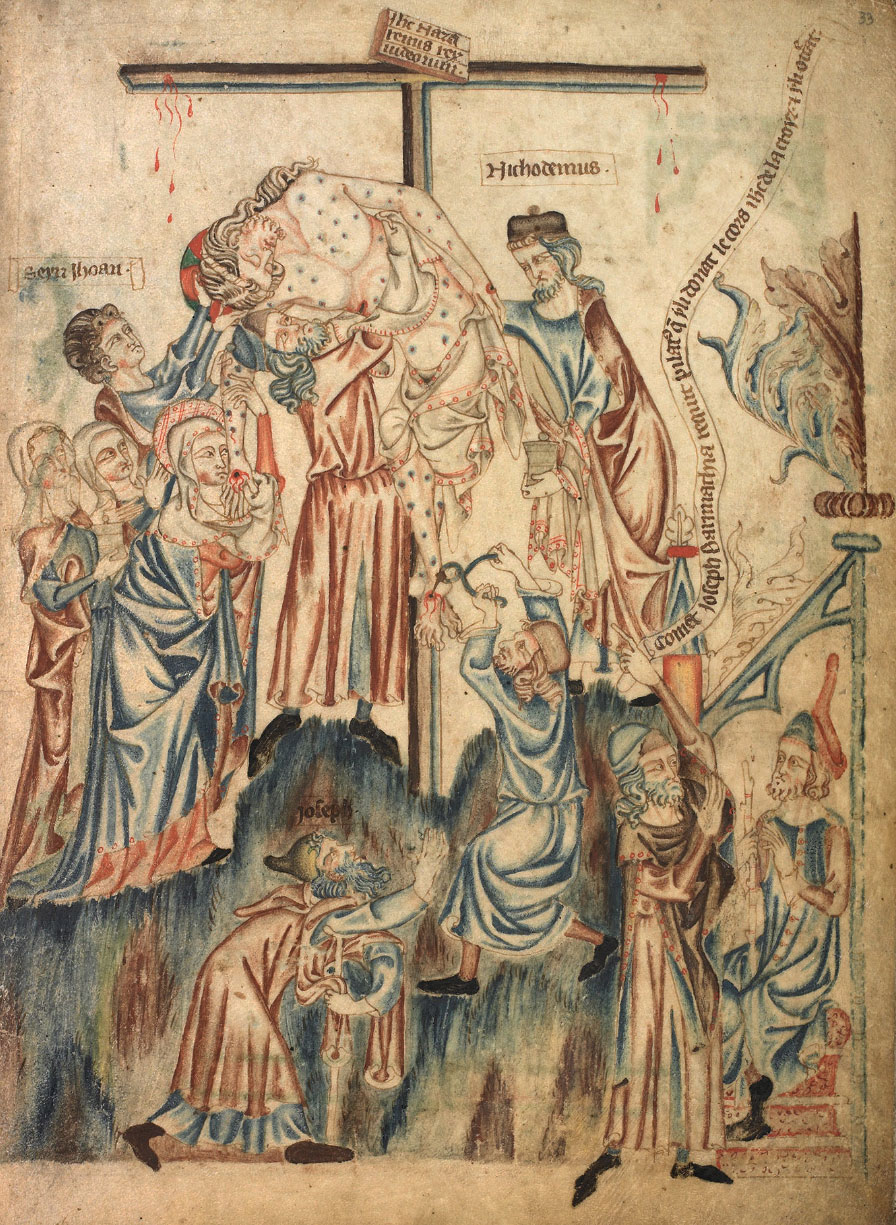
It was revealed to Saint Bridget, that three ladders were placed against the cross to take down the Sacred Body; the holy disciples first drew out the nails from the hands and feet, and, according to Metaphrastes, gave them to Mary. Then one supported the upper part of the body of Jesus, and the other the lower, and thus descended it from the cross. Bernardine de Bustis describes the afflicted Mother as standing, and extending her arms to meet her dear Son; she embraced Him, and then sat at the foot of the cross.
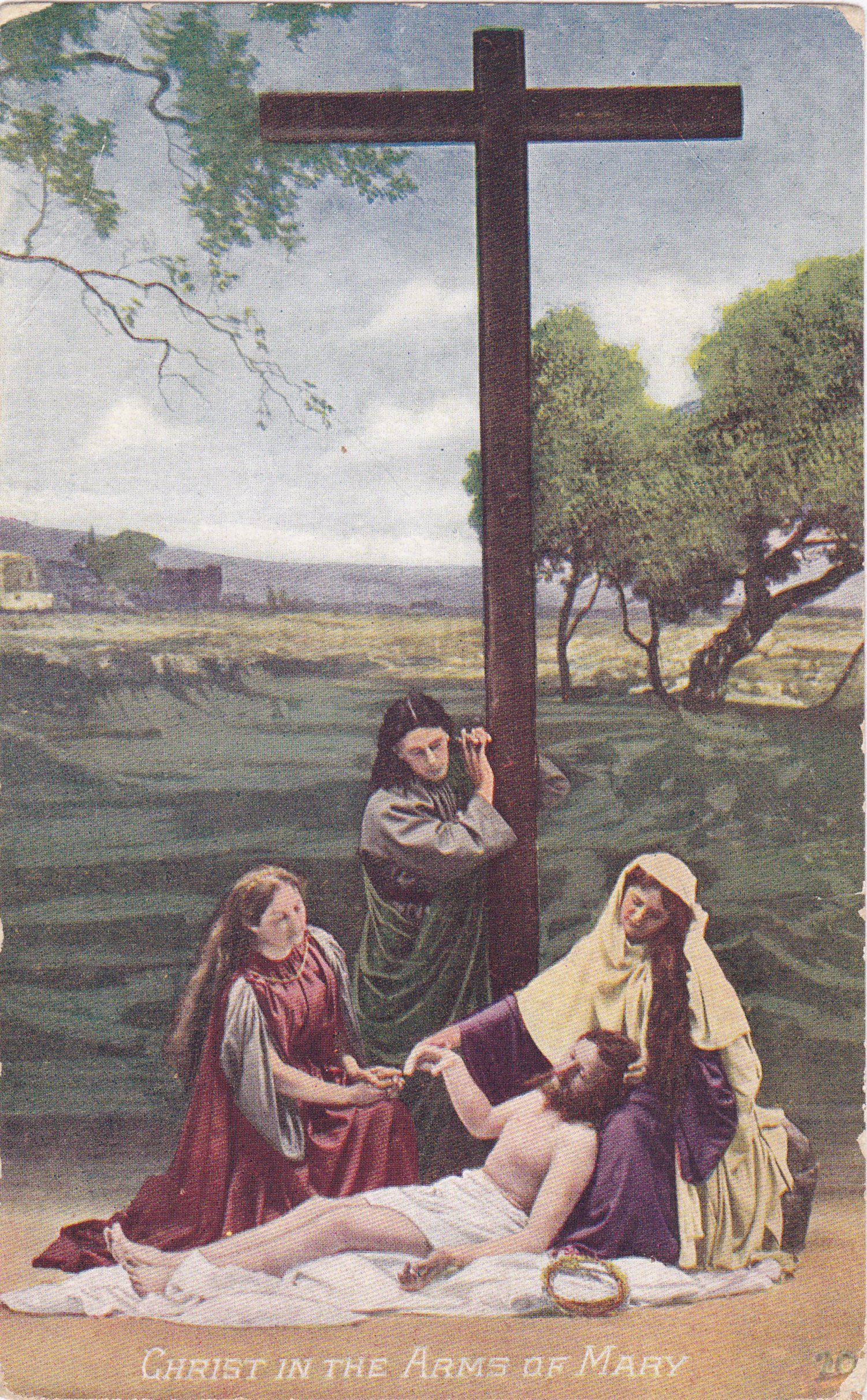
His mouth was open, His eyes were dim; she then examined his mangled flesh and uncovered bones; she took off the crown, and saw the sad injuries which the thorns had inflicted on that sacred head; she saw the holes in His hands and feet, and thus addressed Him: “Ah, Son, to what has Thy love for men brought Thee; and what evil hadst Thou done them, that they should thus cruelly have tormented Thee? Thou wast my father” (continues Bernardine de Bustis, in Mary’s name), “Thou wast my brother, my spouse, my delight, my glory; Thou wast my all.” My Son, see my affliction, look at me, console me; but no, Thou no longer lookest at me. Speak, say but a word, and console me; but Thou speakest no more, for Thou art dead.
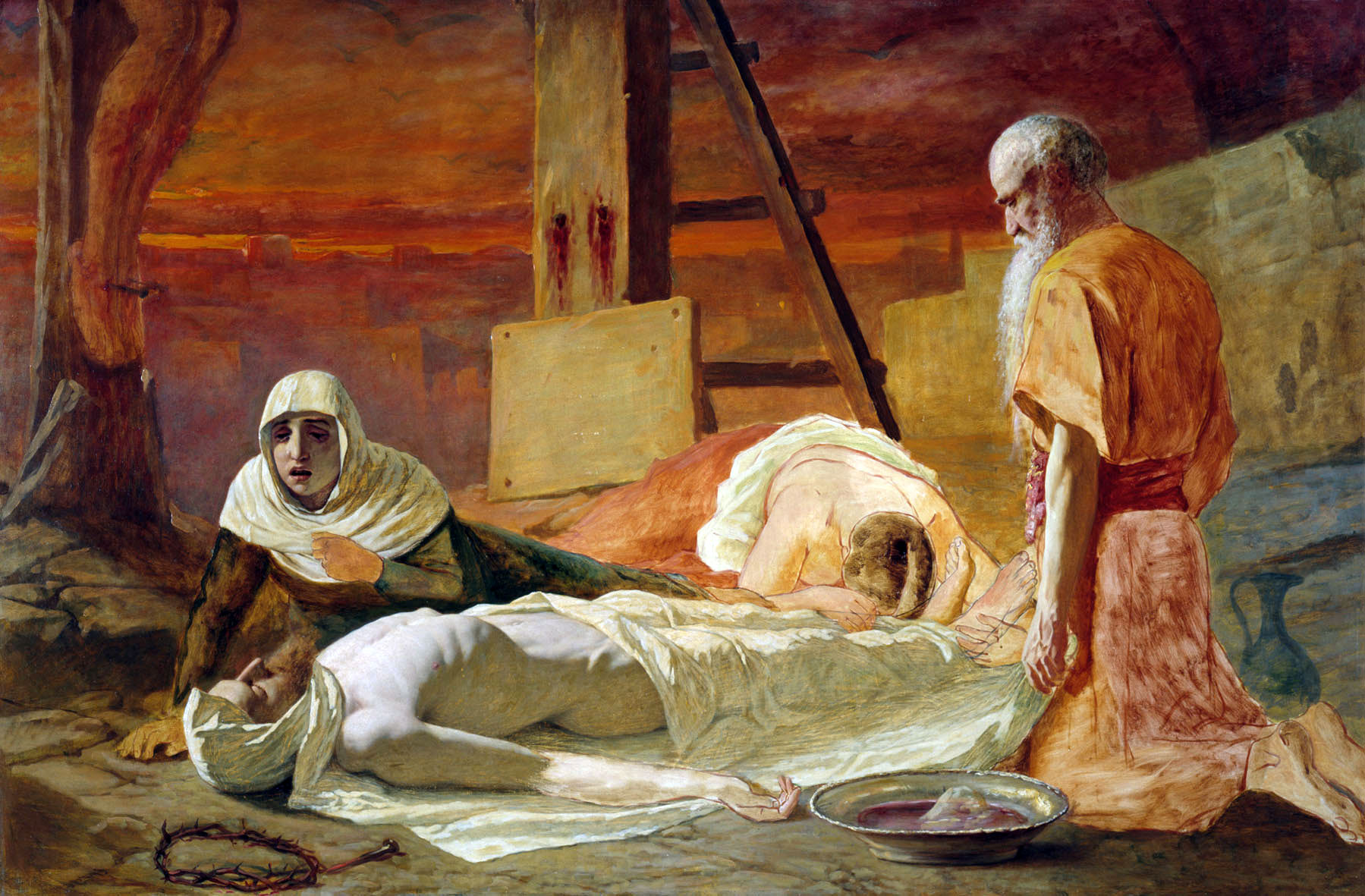
Then, turning to those barbarous instruments of torture, she said, O cruel thorns, O cruel nails, O merciless spear, how, how could you thus torture your Creator? But why do I speak of thorns or nails? Alas! Sinners, she exclaimed, it is you who have thus cruelly treated my Son. Thus did Mary speak and complain of us. But what would she now say, were she still susceptible of suffering? What would be her grief to see that men, notwithstanding that her Son has died for them, still continue to torment and crucify Him by their sins!
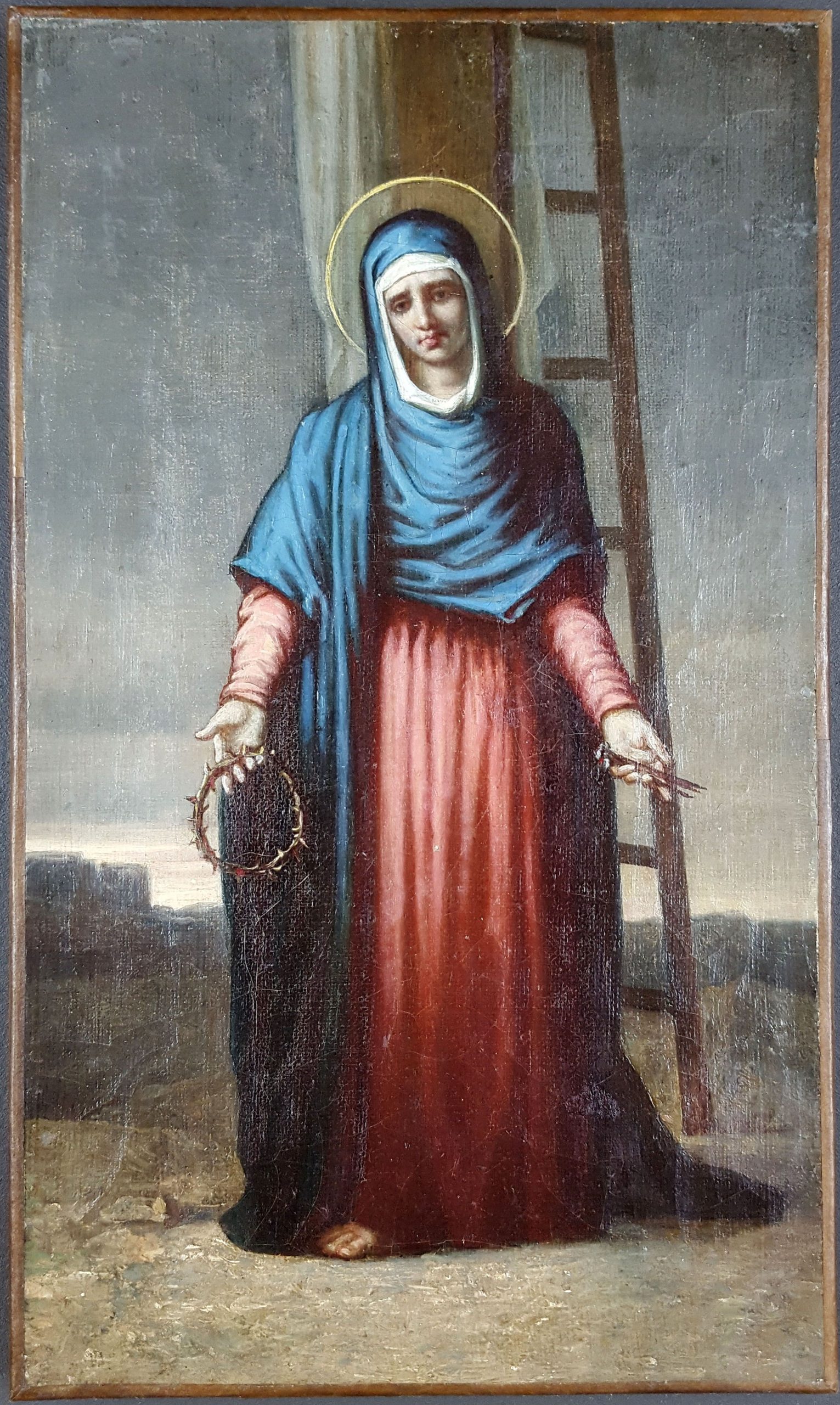
Let us, at least, cease to torment this afflicted Mother; and if we have hitherto grieved her by our sins, let us now do all that she desires. She says, “Return, ye transgressors, to the heart.” Sinners, return to the wounded heart of my Jesus; return as penitents, and He will welcome you. “Flee from Him to Him,” she continues to say with the Abbot Guarric; “from the Judge to the Redeemer, from the tribunal to the cross.” Our Blessed Lady herself revealed to St. Bridget, that “she closed the eyes of her Son, when He was taken down from the cross, but she could not close His arms;” Jesus Christ giving us thereby to understand that He desired to remain with His arms extended to receive all penitent sinners who return to Him. “O world,” continues Mary, “behold, then, thy time is the time of lovers.” “Now that my Son has died to save thee, it is no longer for thee a time of fear, but one of love—a time to love Him, who to show thee the love He bore thee was pleased to suffer so much.” “The heart of Jesus,” says St. Bernard, “was wounded, that through the visible wound, the invisible wound of love might be seen.” “If, then,” concludes Mary, in the words of Blessed Raymond Jordano, “my Son by excess of love was pleased that His side should be opened, that He might give thee His heart, it is right, O may, that thou in return shouldst also give Him thine.” And if you desire, O children of Mary, to find a place in the heart of Jesus, without fear of being rejected, “go” says Ubertino da Casale, “go with Mary; for she will obtain the grace for you.” Of this you have a proof in the following beautiful example.
Example
The disciple relates, that there was a poor sinner who, among other crimes which he had committed, had killed his father and a brother, and therefore was a fugitive. One day in Lent, hearing a sermon on the Divine mercy, he went to confess his sins to the preacher himself. The confessor, on hearing the enormous crimes which he had committed, sent him to an altar of Mary in Sorrow, that she might obtain him contrition, and the pardon of his sins. The sinner obeyed, and began to pray; when, behold, he suddenly dropped down dead from excess of grief. On the following day, when the priest recommended the deceased to the prayers of the people, a white dove appeared in the church, and let a card drop at his feet. The priest took it up, and found the following words written upon it: “The soul of the deceased, on leaving his body, went straight to heaven. Continue thou to preach the infinite mercy of God.”
Prayer
O afflicted Virgin! O soul great in virtue but great also in sorrow, for the one and the other took their rise in that immense love with which thy heart was inflamed towards God, for thou couldst love Him alone; ah, Mother, pity me, for instead of loving God I have greatly offended Him.
Thy sorrows encourage me to hope for pardon. But this is not enough; I wish to love my Lord; and who can better obtain me this love than thou, who art the Mother of fair love? Ah, Mary, thou comfortest all; console me also. Amen.
6 Click the ▶ Button to pray with the 6th of the Seven Dolors prayers, or play the podcast in a New Window
6 The Sixth Sword of Sorrow:
Mary Receives into Her Arms, the Body of Jesus Taken Down from the Cross.
O Mother of Sorrows, your heart was drowned in grief as you embraced the lifeless corpse of your Son. He Who was your very life, was now dead. Your light in this life was extinguished. Yet you accepted this sorrow with love, knowing that it was all part of the Father’s plan of salvation. Through this bitter sword of sorrow, obtain for us the grace to accept with patience and love, the sorrows that befall us in this veil of tears, firmly believing that God works all things to the good, for those who love Him.
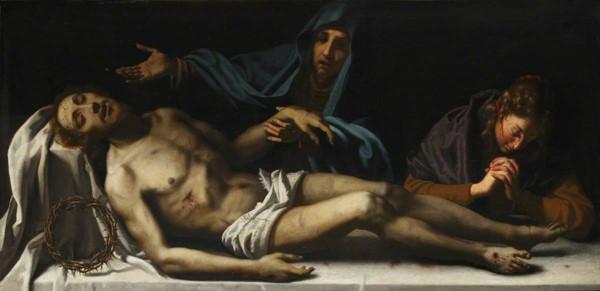
Our Father…Hail Mary (7).
- Then the Jews, (because it was the parasceve,) that the bodies might not remain on the cross on the sabbath day, (for that was a great sabbath day,) besought Pilate that their legs might be broken, and that they might be taken away. – John 19:31
- The soldiers therefore came; and they broke the legs of the first, and of the other that was crucified with him. But after they were come to Jesus, when they saw that he was already dead, they did not break his legs. – John 19:32-33
- But one of the soldiers with a spear opened his side, and immediately there came out blood and water. – John 19:34
- He keeps all his bones; not one of them is broken. – Psalm 34:20
- Joseph of Arimathea, a noble counsellor, who was also himself looking for the kingdom of God, came and went in boldly to Pilate, and begged the body of Jesus. – Mark 15:43
- And Nicodemus also came, (he who at the first came to Jesus by night,) bringing a mixture of myrrh and aloes, about an hundred pound weight. – John 19:39
- And Joseph buying fine linen, and taking him down, wrapped him up in the fine linen, and laid him in a sepulchre which was hewed out of a rock. And he rolled a stone to the door of the sepulchre. – Mark 15:46
Most merciful Mother, remind us always about the sorrows of your Son, Jesus.
7 Click the ▶ Button to listen to the 7th Fr. Ripperger meditation podcast, or play the podcast in a New Window
(Skip the seventh meditation, go to pray the prayer of the Seventh Sword of Sorrow: Mary Helps Place the Body of Jesus in the Tomb.)
St. Alphonsus: On The Seventh Dolour
The Burial of Jesus
When a mother is by the side of her suffering and dying child, she undoubtedly feels and suffers all his pains; but after he is actually dead, when, before the body is carried to the grave, the afflicted mother must bid her child a last farewell; then, indeed, the thought that she is to see him no more is a grief which exceeds all other griefs. Behold the last sword of Mary’s sorrow, which we have now to consider; for after witnessing the death of her Son on the cross, and embracing for a last time His lifeless body, this blessed Mother had to leave Him in the sepulchre, never more to enjoy His beloved presence on earth.

That we may better understand this last dolour, we will return to Calvary and consider the afflicted Mother, who still holds the lifeless body of her Son clasped in her arms. O my Son, she seemed to say in the words of Job, my Son, “Thou art changed to be cruel towards me.” Yes, for all Thy noble qualities, Thy beauty, grace, and virtues, Thy engaging manners, all the marks of special love which Thou hast bestowed upon me, the peculiar favours Thou hast granted me,—all are now changed into grief, and as so many arrows pierce my heart, and the more they have excited me to love Thee, so much the more cruelly do they now make me feel Thy loss. Ah, my own beloved Son, in losing Thee I have lost all.
Thus does St. Bernard speak in her name: “O truly-begotten of God, Thou wast to me a father, a son, a spouse: Thou wast my very soul! Now I am deprived of my father, widowed of my spouse, a desolate, childless Mother; having lost my only Son, I have lost all.” Thus was Mary, with her Son locked in her arms, absorbed in grief.
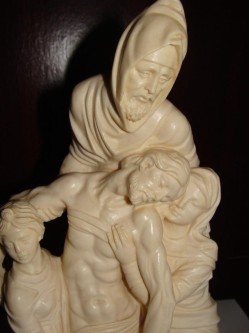
The holy disciples, fearful that the poor Mother might die of grief, approached her to take the body of her Son from her arms, to bear it away for burial. This they did with gentle and respectful violence, and having embalmed it, they wrapped it in a linen cloth which was already prepared.
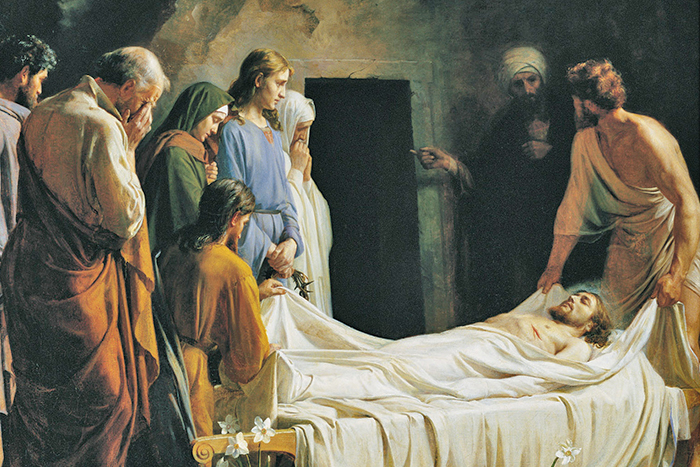
On this cloth, which is still preserved at Turin, our Lord was pleased to leave to the world an impression of His sacred body. The disciples then bore Him to the tomb. To do this, they first of all raised the sacred body on their shoulders, and then the mournful train set forth; choirs of angels from heaven accompanied it; the holy women followed, and with them the afflicted Mother also followed her Son to the place of burial.
When they had reached the appointed place, “O, how willingly would Mary have there buried herself alive with her Son, had such been His will!” for this she herself revealed to St. Bridget. But such not being the Divine will, there are many authors who say that she accompanied the sacred body of Jesus into the sepulchre, where, according to Baronius, the disciples also deposited the nails and the crown of thorns.
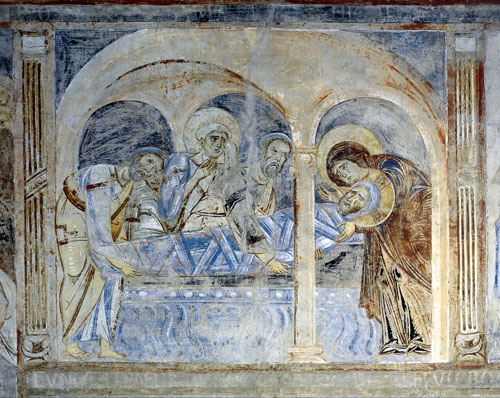
In raising the stone to close up the entrance, the holy disciples of the Saviour had to approach our Blessed Lady, and say: Now, O Lady, we must close the sepulchre: forgive us, look once more at thy Son, and bid Him a last farewell. Then my beloved Son (for thus must the afflicted Mother have spoken); then I shall see Thee no more? Receive, therefore, on this last occasion that I behold Thee, receive my last farewell, the farewell of Thy dear Mother, and receive also my heart, which I leave buried with Thee.
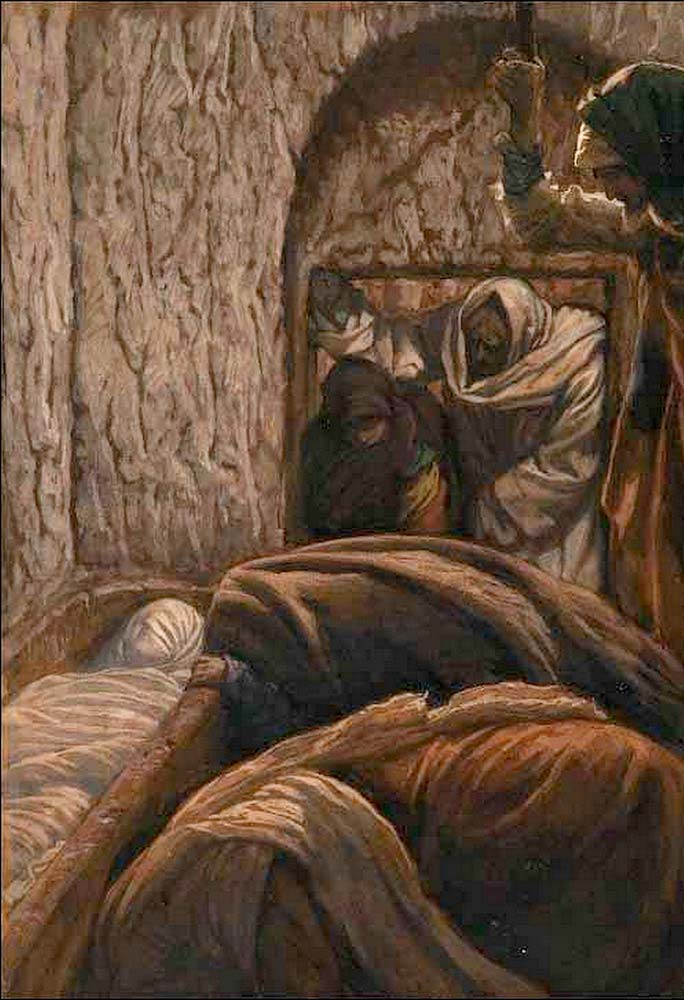
“The Blessed Virgin,” writes St. Fulgentius, “would ardently have desired to have buried her soul with the body of Christ.” And this Mary herself revealed to St. Bridget, saying: “I can truly say that at the burial of my Son one tomb contained as it were two hearts.”
Finally, the disciples raised the stone and closed up the holy sepulchre, and in it the body of Jesus, that great treasure-a treasure so great that neither earth nor heaven had a greater. Here I may be permitted to make a short digression, and remark that Mary’s heart was buried with Jesus, because Jesus was all her treasure: “Where your treasure is, there will your heart be also.” And where, may we ask, are our hearts buried? In creatures-perchance in mire. And why not in Jesus, who, although He has ascended to heaven, is still pleased to remain on earth, not dead indeed, but living in the most holy sacrament of the altar, precisely that our hearts may be with Him, and that He may possess them?
But let us return to Mary. Before leaving the sepulchre, according to St. Bonaventure, she blessed the sacred stone which closed it, saying, “O happy stone, that doth now enclose that sacred body, which for nine months was contained in my womb; I bless thee and envy thee; I leave thee the guardian of my Son, of that Son who is all my treasure and all my love.” Then raising her heart to the Eternal Father, she said, “O Father, to Thee do I recommend Him-Him who is Thy Son at the same time that He is mine.” Thus bidding her last farewell to her beloved Jesus and to the sepulchre, she left it, and returned to her own house.
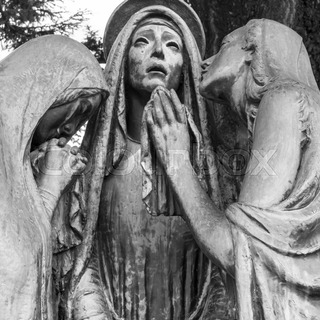
“This Mother,” says St. Bernard, “went away so afflicted and sad, that she moved many to tears in spite of themselves; and wherever she passed, all who met her wept,” and could not restrain their tears. And he adds that the holy disciples and women who accompanied her “mourned even more for her than for their Lord.” Saint Bonaventure says, that her sisters covered her with a mourning cloak: “The sisters of our Lady veiled her as a widow, almost covering her whole face.”
He also says that, passing, on her return, before the cross still wet with the blood of her Jesus, she was the first to adore it. “O holy cross,” she then said, “I kiss thee, I adore thee; for thou art no longer an infamous gibbet, but a throne of love and an altar of mercy, consecrated by the blood of the Divine Lamb, which on thee has been sacrificed for the salvation of the world.” She then left the cross, and returned home.
When there, the afflicted Mother cast her eyes around, and no longer saw her Jesus; but, instead of the sweet presence of her dear Son, the remembrance of His beautiful life and cruel death presented itself before her eyes. She remembered how she had pressed that Son to her bosom in the crib of Bethlehem; the conversations she had held with Him during the many years they had dwelt in the house of Nazareth; she remembered their mutual affection, their loving looks, the words of eternal life which fell from those Divine lips; and then the sad scene which she had that day witnessed, again presented itself before her. The nails, the thorns, the lacerated flesh of her Son, those deep wounds, those uncovered bones, that open mouth, those dimmed eyes, all presented themselves before her. Ah, what a night of sorrow was that night for Mary! The afflicted Mother, turning to Saint John, mournfully said: “Ah, John, tell me where is thy Master?” She then asked the Magdalen: “Daughter, tell me, where is thy beloved? O God, who has taken Him from us?”
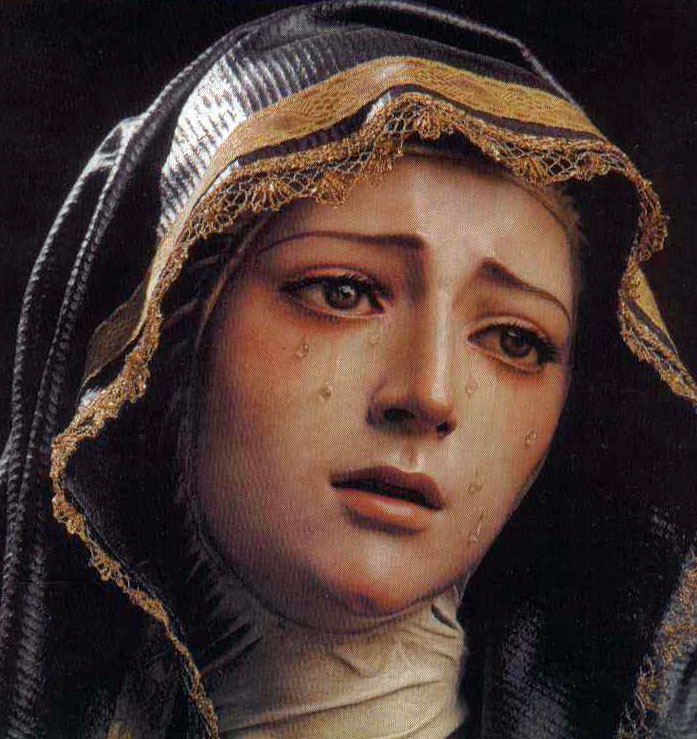
Mary wept, and all who were present wept with her. And thou, my soul, weepest not! Ah, turn to Mary, and address her with Saint Bonaventure, saying: “O my own sweet Lady, let me weep; thou art innocent, I am guilty.” Entreat her at last to let thee weep with her: “Grant that with thee I may weep.” She weeps for love; do thou weep through sorrow for thy sins. Thus weeping, thou mayest have the happy lot of him of whom we read in the following example.
Example
Father Engelgrave relates that a certain religious was so tormented with scruples, that he was sometimes almost driven to despair; but as he had the greatest devotion to Mary in Sorrow, he always had recourse to her in his interior agonies, and felt himself consoled whilst meditating on her dolours. Death came, and the devil then tormented him more than ever with scruples, and tempted him to despair. When, behold, the compassionate Mother seeing her poor son in such anguish, appeared to him, saying: “And thou, my son, why art thou so overcome with sorrow? Why fearest thou so much? Thou who hast so often consoled me by pitying me in my sorrows. But now,” she added, “Jesus sends me to console thee; be comforted, then; rejoice, and come with me to heaven.” On hearing these consoling words, the devout religious, filled with joy and confidence, tranquilly expired.
Prayer
My afflicted Mother, I will not leave thee alone to weep; no, I will accompany thee with my tears. This grace I now ask of thee: obtain that I may always bear in mind and always have a tender devotion towards the Passion of Jesus and thy sorrows, that the remainder of my days may thus be spent in weeping over thy sufferings, my own sweet Mother, and those of my Redeemer.
These sorrows, I trust, will give me the confidence and strength which I shall require at the hour of death, that I may not despair at the sight of the many sins by which I have offended my Lord. They must obtain me pardon, perseverance, and heaven, where I hope to rejoice with thee, and to sing the infinite mercies of my God for all eternity. Thus do I hope; thus may it be. Amen. Amen.
7 Click the ▶ Button to pray with the 7th of the Seven Dolors prayers, or play the podcast in a New Window
7 The Seventh Sword of Sorrow:
Mary Helps Place the Body of Jesus in the Tomb.
O Mother of Sorrows, who could express the cruel anguish of this moment? This same Child that you once rocked in swaddling clothes, amidst unspeakable joy, you now wrap silently in His burial shroud. Your tears mingled with the blood and dirt that covers His broken body. But even in this moment, your trust in His promise did not die. Your mourning was not without hope. For you knew that He would rise again from this grave, just as He promised. Through this bitter sword of sorrow, obtain for us the grace to believe with unshakeable hope, in the victory of our Lord, even in the darkest moments of our life.
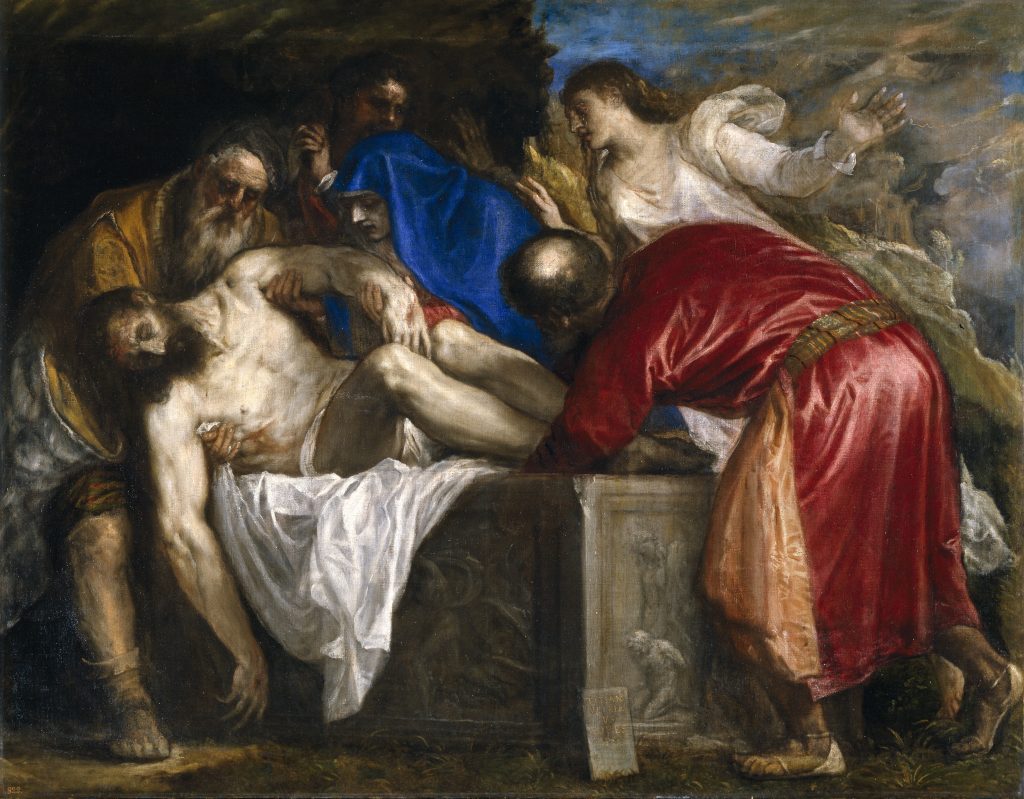
Our Father…Hail Mary (7).
- Now there was in the place where he was crucified, a garden; and in the garden a new sepulchre, wherein no man yet had been laid. – John 19:41
- There, therefore, because of the parasceve of the Jews, they laid Jesus, because the sepulchre was nigh at hand. – John 19:42
- And Joseph taking the body, wrapped it up in a clean linen cloth. And laid it in his own new monument, which he had hewed out in a rock. – Matthew 27:59
- And he rolled a great stone to the door of the monument, and went his way. – Matthew 27:60
- And the women that were come with him from Galilee, following after, saw the sepulchre, and how his body was laid. And returning, they prepared spices and ointments; and on the sabbath day they rested, according to the commandment. – Luke 23:55-56
- And the next day, which followed the day of preparation, the chief priests and the Pharisees came together to Pilate, saying:, Sir, we have remembered, that that seducer said, while he was yet alive: After three days I will rise again. Matthew 27:62-63
- Pilate saith to them: You have a guard; go, guard it as you know. And they departing, made the sepulchre sure, sealing the stone, and setting guards. – Matthew 27:65-66
Concluding Prayer.
O Mary, you truly became the Queen of all Martyrs, as these seven bitter swords of sorrow pierced your Immaculate Heart. By the merits of your tearful distress, obtain for us, and for all sinners, the graces of perfect contrition and conversion. Help us always, dear Mother, to imitate you, by taking up our crosses and following Jesus with limitless love and generosity.
Amen.
Mary, who was conceived without sin, and who suffered for us, pray for us.
Mary, who was conceived without sin, and who suffered for us, pray for us.
Mary, who was conceived without sin, and who suffered for us, pray for us.
In the name of the Father, and of the Son, and of the Holy Spirit. Amen.
Closing Hymn
Click the ▶ Button to sing the hymn (key of F#) , or play the hymn in a New Window ⧉
Click the ▶ Button to sing the hymn (key of B) , or play the hymn in a New Window ⧉
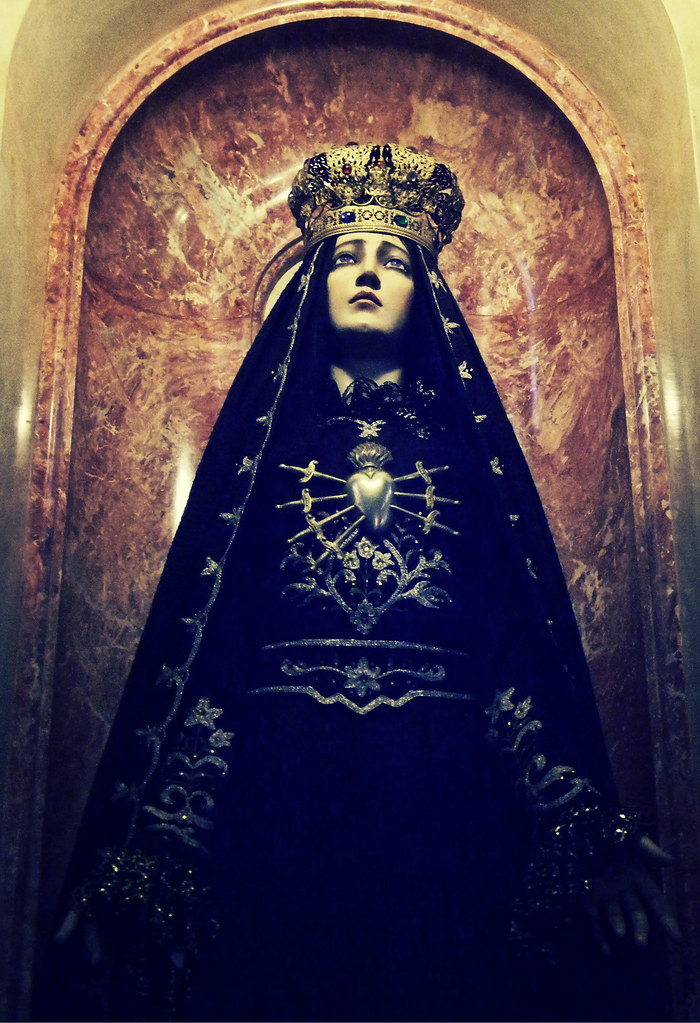
Click the ▶ Button to sing the hymn (key of F#) , or play the hymn in a New Window ⧉
Click the ▶ Button to sing the hymn (key of B) , or play the hymn in a New Window ⧉
| Translated by Rev. Francis Campbell | Ad. from Gregorian |
|---|---|
| 1. What a sea of tears and sorrows, Did the soul of Mary toss, To and fro upon its billows, While she wept her bitter loss; In her arms her Jesus holding, Torn so newly from the Cross. |
2. Oh, that mournful Virgin Mother, See her tears how fast they flow, Down upon His mangled Body, Wounded Side and thorny Brow; While His Hands and Feet she kisses, Picture of immortal woe. |
| 3. Oft, and oft His Arms and Bosom, Fondly straining to her own; Oft, her pallid lips imprinting, On each Wound of her dear Son: Till at last in swoons of anguish, Sense and consciousness are gone. |
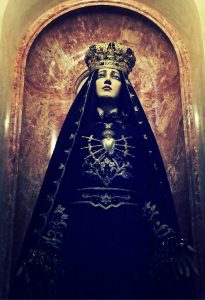 |
| 4. Gentle Mother, we beseech thee, By thy tears and troubles sore; By the death of thy dear Offspring, By the bloody Wounds He bore; Touch our hearts with that true sorrow, Which affected thee of yore. |
|
| 5. To the Father everlasting, And the Son, Who reigns on high, With the coeternal Spirit, Trinity in Unity, Be salvation, honor, blessing, Now and through eternity. Amen. |
Click the ▶ Button to pray the hymn, or play the music in a New Window ⧉


The Blessed Virgin Mary revealed to Saint Bridget of Sweden (died 1373) that those that pray a Hail Mary while meditating on Mary’s Seven Sorrows will receive Seven Graces:
- I will grant peace to their families.
- They will be enlightened about the divine mysteries.
- I will console them in their pains and I will accompany them in their work.
- I will give them as much as they ask for as long as it does not oppose the adorable will of my divine Son for the sanctification of their souls.
- I will defend them in their spiritual battles with the infernal enemy and I will protect them at every instant of their lives.
- I will visibly help them at the moment of their death, they will see the face of their Mother.
- I have obtained (This Grace) from my divine Son, that those who propagate this devotion to my tears and sorrows, will be taken directly from this earthly life to eternal happiness since all their sins will be forgiven and my Son and I will be their eternal consolation and joy.
St. Alphonsus Ligouri on the Seven Dolors
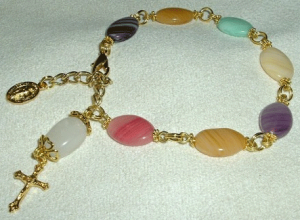
Click the ▶ Button to pray the prayer, or pray the prayer in a New Window ⧉
| “The promises of those devoted to the Seven Sorrows and Tears of our Lady, were given to us by our Lady through St. Bridget of Sweden. Our Lady directly reveals that the amazing graces [will be] granted by her Son for all those who pray, daily, seven Hail Marys while meditating on her seven dolours, or tears.” This short form consists of seven Aves daily, to be compliant in our correspondence to the promises. (The longer form, above, consists of seven decades of seven, or “septades“, for approximately forty-nine Aves.) | |
|
In the name of the Father, and of the Son, and of the Holy Spirit. Amen. |
|
| Hail, Mary, Full of Grace, the Lord is with thee; blessed art thou among women, and blessed is the fruit of thy womb, Jesus. |
Holy Mary, Mother of God, pray for us sinners, now and at the hour of our death. Amen. |
| (1) Behold this child is set for the fall, and for the resurrection of many in Israel, and for a sign which shall be contradicted. And thy own soul a sword shall pierce, that, out of many hearts, thoughts may be revealed. – Luke 2:33-35 | 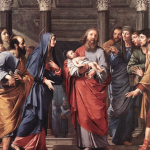 |
| (2) Behold an angel of the Lord appeared in sleep to Joseph, saying: Arise, and take the child and his mother, and fly into Egypt: and be there until I shall tell thee. For it will come to pass that Herod will seek the child to destroy him. – Matthew 2:13 | 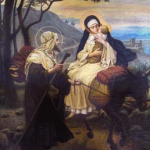 |
| (3) Thinking that he was in the company, they came a day’s journey, and sought him among their kinsfolks and acquaintance. And not finding him, they returned into Jerusalem, seeking him. And it came to pass, that, after three days, they found him in the temple, sitting in the midst of the doctors, hearing them, and asking them questions. And all that heard him were astonished at his wisdom and his answers. And seeing him, they wondered. And his mother said to him: Son, why hast thou done so to us? behold thy father and I have sought thee sorrowing. And he said to them: How is it that you sought me? did you not know, that I must be about my father’s business? – Luke 2:44-47 |  |
| (4) And bearing his own cross, he went forth to that place which is called Calvary, but in Hebrew Golgotha. (John 19:17) Surely he hath borne our infirmities and carried our sorrows: and we have thought him as it were a leper, and as one struck by God and afflicted. (Isaiah 53:4) He was offered because it was his own will, and he opened not his mouth: he shall be led as a sheep to the slaughter, and shall be dumb as a lamb before his shearer, and he shall not open his mouth. (Isaiah 53:7) And they bring him into the place called Golgotha, which being interpreted is, The place of Calvary. (Mark 15:22) | 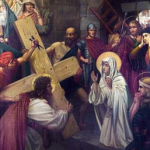 |
| (5) Father, forgive them, for they know not what they do. (Luke 23:34) Amen I say to thee, this day thou shalt be with me in paradise. (Luke 23:43) Woman, behold thy son. After that, he saith to the disciple: Behold thy mother. And from that hour, the disciple took her to his own. (John 19:26-27) At the ninth hour, Jesus cried out with a loud voice … My God, my God, why hast thou forsaken me? (Mark 15:34) I thirst. (John 19:28) Jesus crying out with a loud voice, said: Father, into thy hands I commend my spirit. (Luke 23:46) It is consummated. (John 19:30) | 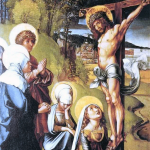 |
| (6) The soldiers therefore came; and they broke the legs of the first, and of the other that was crucified with him. But after they were come to Jesus, when they saw that he was already dead, they did not break his legs. But one of the soldiers with a spear opened his side, and immediately there came out blood and water. (John 19:32-34) He keeps all his bones; not one of them is broken. (Psalm 34:20) |  |
| (7) Joseph [of Arimathea] buying fine linen, and taking him down, wrapped him up in the fine linen, and laid him in a sepulchre which was hewed out of a rock. (Mark 15:46) There was in the place where he was crucified, a garden; and in the garden a new sepulchre, wherein no man yet had been laid. (John 19:41) And Joseph taking the body … laid it in his own new monument, which he had hewed out in a rock. And he rolled a great stone to the door of the monument, and went his way. (Matthew 27:59-60) |  |
|
In the name of the Father, and of the Son, and of the Holy Spirit. Amen. |
|
Prayer Plans
- Pray Seven Ave Marias every day, to qualify for the merits of the promises, about 4 minutes daily.
- Follow the basic prayer narration featured in the main podcast for 1 – 7, without any hymns or meditations, about 22 minutes.
- Listen occasionally to to one of the meditation recordings at a time over a number of weeks, to become initially familiar with the many unique concepts in the revelations about the Seven Sorrows; follow the main narration, above, about 30 minutes.
- Pray the main prayer narration 1 – 7 while singing the opening and closing hymns, on Saturdays.
- Read the long prayer meditations again over a longer period, to become re-acquainted with them.
Click the ▶ Button to pray the prayer, or pray the prayer in a New Window ⧉
| Lord, have mercy on us | Christ, have mercy on us |
| Lord, have mercy on us | |
| Christ, hear us, | Christ, graciously hear us |
| God, the Father of heaven, | have mercy on us |
| God the Son, Redeemer of the world, | have mercy on us |
| God the Holy Spirit, | have mercy on us |
| Holy Mary, Mother of God, | pray for us. |
| Holy Mary, Virgin of virgins, | pray for us. |
| Mother of Christ, | pray for us. |
| Sorrowful Mother, | pray for us. |
| Mournful Mother, | pray for us. |
| Sighing Mother, | pray for us. |
| Afflicted Mother, | pray for us. |
| Foresaken Mother, | pray for us. |
| Desolate Mother, | pray for us. |
| Mother most sad, | pray for us. |
| Mother set around with anguish, | pray for us. |
| Mother overwhelmed by grief, | pray for us. |
| Mother transfixed by a sword, | pray for us. |
| Mother crucified in your heart, | pray for us. |
| Mother bereaved of your Son, | pray for us. |
| Sighing Dove, | pray for us. |
| Mother of Sorrows, | pray for us. |
| Fount of tears, | pray for us. |
| Sea of bitterness, | pray for us. |
| Field of tribulation, | pray for us. |
| Mass of suffering, | pray for us. |
| Mirror of patience, | pray for us. |
| Rock of constancy, | pray for us. |
| Remedy in perplexity, | pray for us. |
| Joy of the afflicted, | pray for us. |
| Ark of the desolate, | pray for us. |
| Refuge of the abandoned,. | pray for us. |
| Shield of the oppressed, | pray for us. |
| Conqueror of the incredulous, | pray for us. |
| Solace of the wretched, | pray for us. |
| Medicine of the sick, | pray for us. |
| Help of the faint, | pray for us. |
| Strength of the weak, | pray for us. |
| Protectress of those who fight, | pray for us. |
| Haven of the shipwrecked, | pray for us. |
| Calmer of tempests, | pray for us. |
| Companion of the sorrowful, | pray for us. |
| Retreat of those who groan, | pray for us. |
| Terror of the treacherous, | pray for us. |
| Standard-bearer of the Martyrs, | pray for us. |
| Treasure of the Faithful, | pray for us. |
| Light of Confessors, | pray for us. |
| Pearl of Virgins, | pray for us. |
| Comfort of Widows, | pray for us. |
| Joy of all Saints, | pray for us. |
| Queen of your Servants, | pray for us. |
| Holy Mary, who alone are beyond compare, | pray for us. |
| Pray for us, most Sorrowful Virgin, | that we may be made worthy of the promises of Christ. |
Let us pray
O God, in whose Passion, according to the prophecy of Simeon, a sword of grief pierced through the most sweet soul of Thy glorious Blessed Virgin Mother Mary: grant that we, who celebrate the memory of her Seven Sorrows, may obtain the happy effect of Your Passion, Who lives and reigns world without end. Amen. In the Name of the Father, and of the Son, and of the Holy Spirit. Amen.
Consecration to Our Lady of Sorrows
Most holy Virgin and Queen of Martyrs, Mary, would that I could be in Heaven, there to contemplate the honors rendered to thee by the Most Holy Trinity and by the whole Heavenly Court! But since I am still a pilgrim in this vale of tears, receive from me, thy unworthy servant and a poor sinner, the most sincere homage and the most perfect act of vassalage a human creature can offer thee. In thy Immaculate Heart, pierced with so many swords of sorrow, I place today my poor soul forever; receive me as a partaker in thy dolors, and never suffer that I should depart from that Cross on which thy only begotten Son expired for me.
With thee, O Mary, I will endure all the sufferings, contradictions, infirmities, with which it will please thy Divine Son to visit me in this life. All of them I offer to thee, in memory of the Dolors which thou didst suffer during thy life, that every thought of my mind, every beating of my heart may henceforward be an act of compassion to thy Sorrows, and of complacency for the glory thou now enjoyest in Heaven.
Since then, O Dear Mother, I now compassionate thy Dolors, and rejoice in seeing thee glorified, do thou also have compassion on me, and reconcile me to thy Son Jesus, that I may become thy true and loyal son (daughter); come on my last day and assist me in my last agony, even as thou wert present at the Agony of thy Divine Son Jesus, that from this painful exile I may go to Heaven, there to be made partaker of thy glory. Amen.
http://www.sing-prayer.org/p/79
